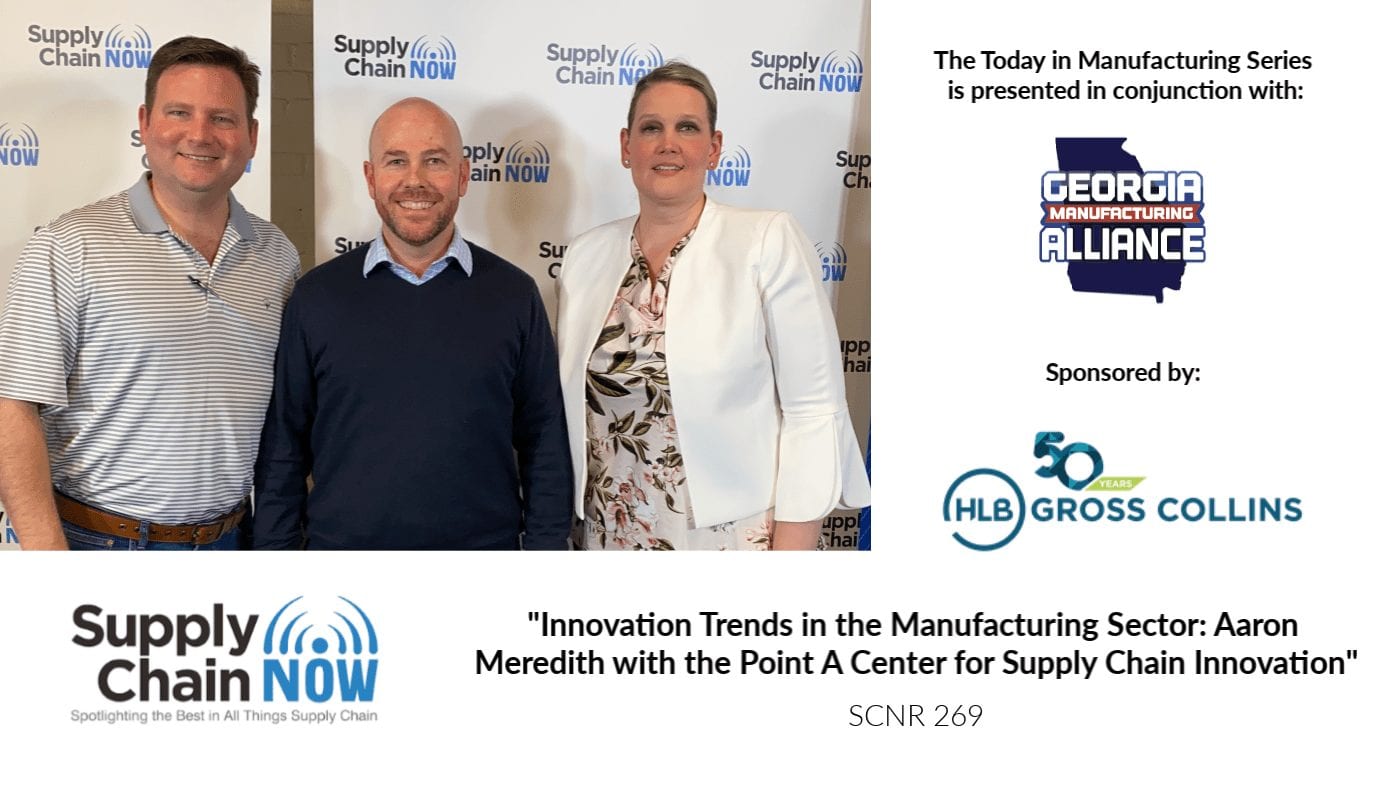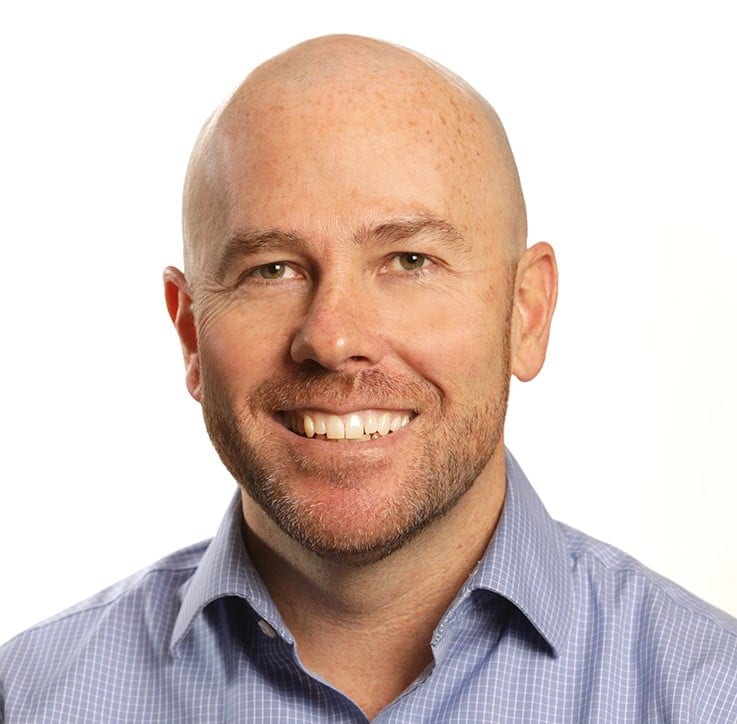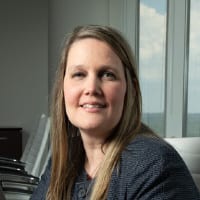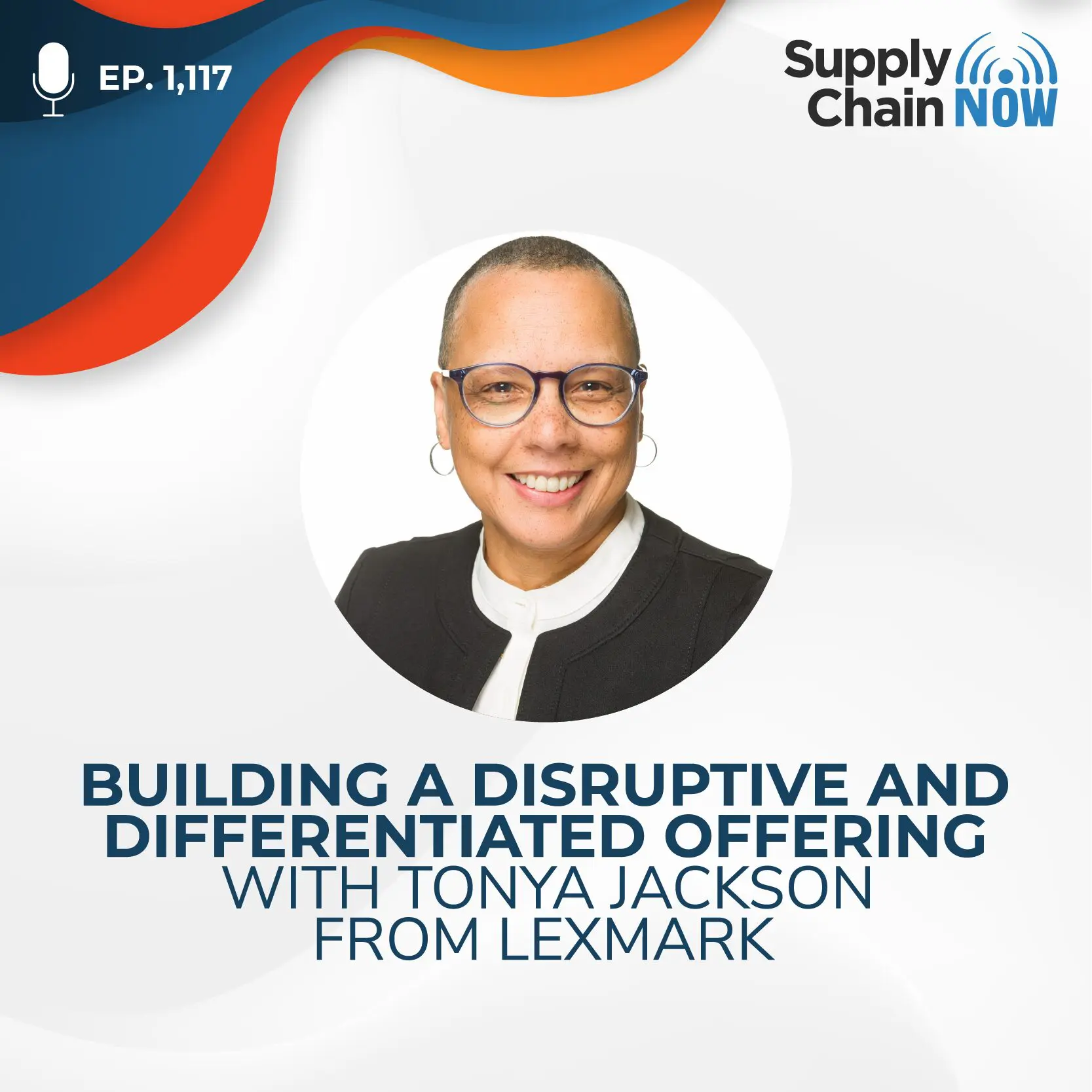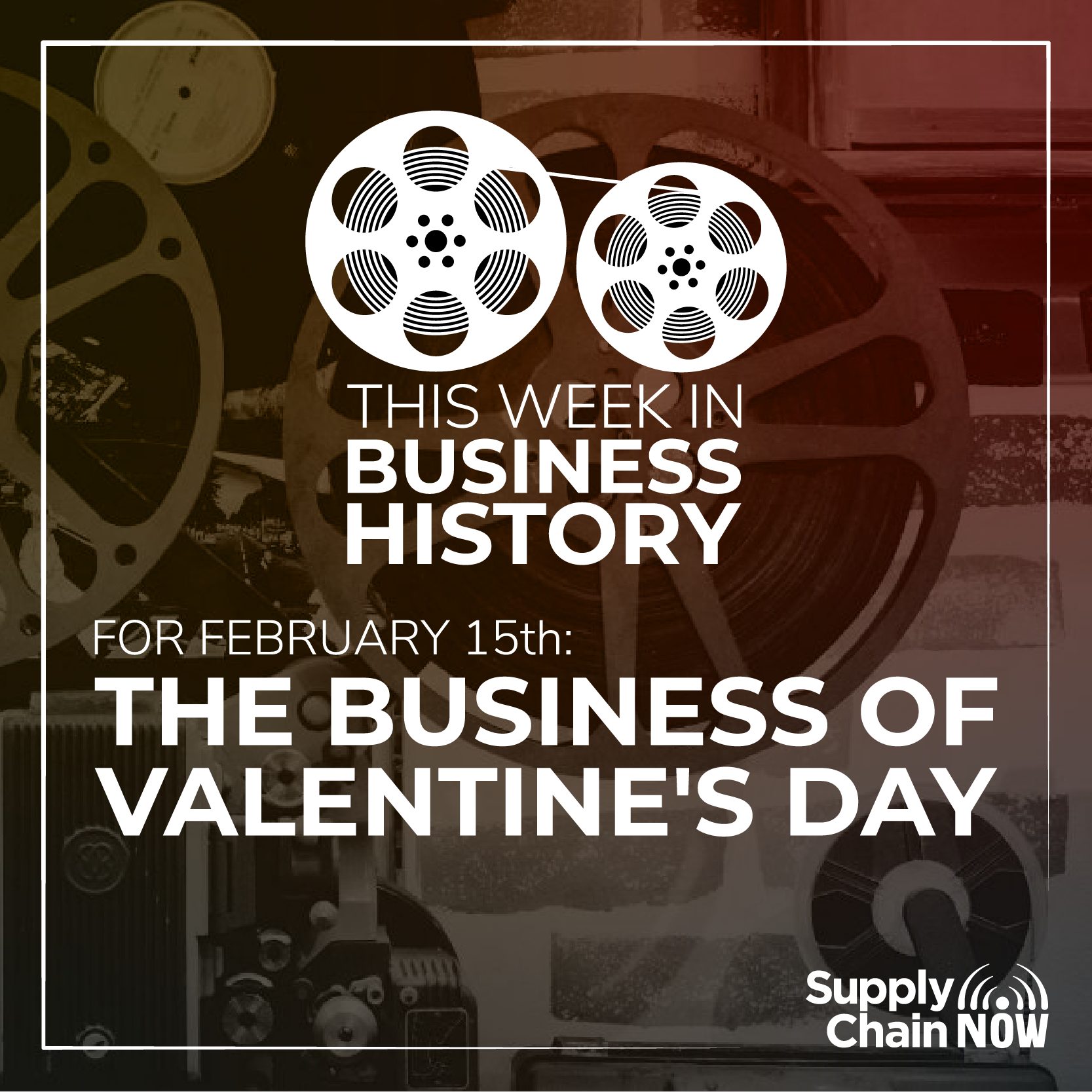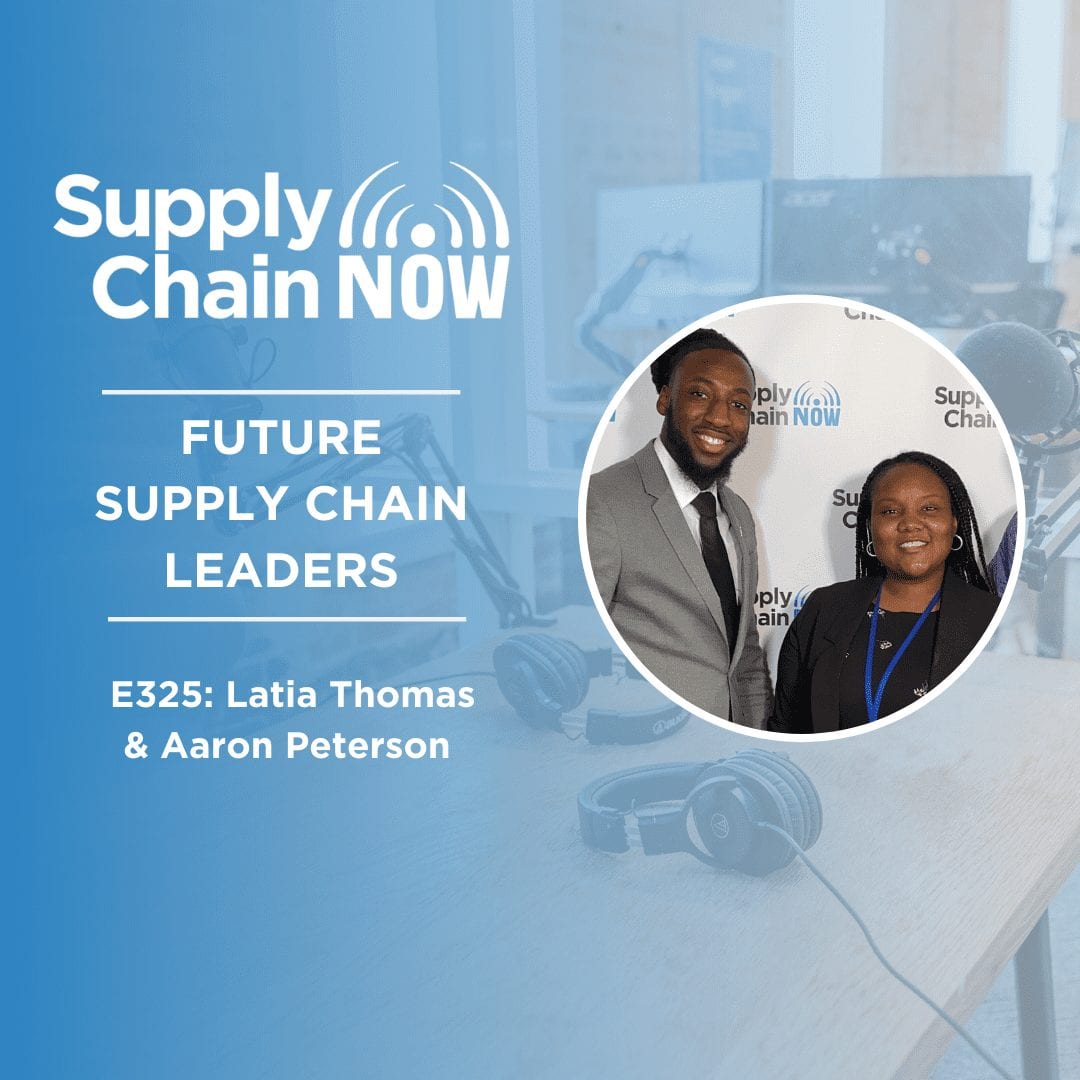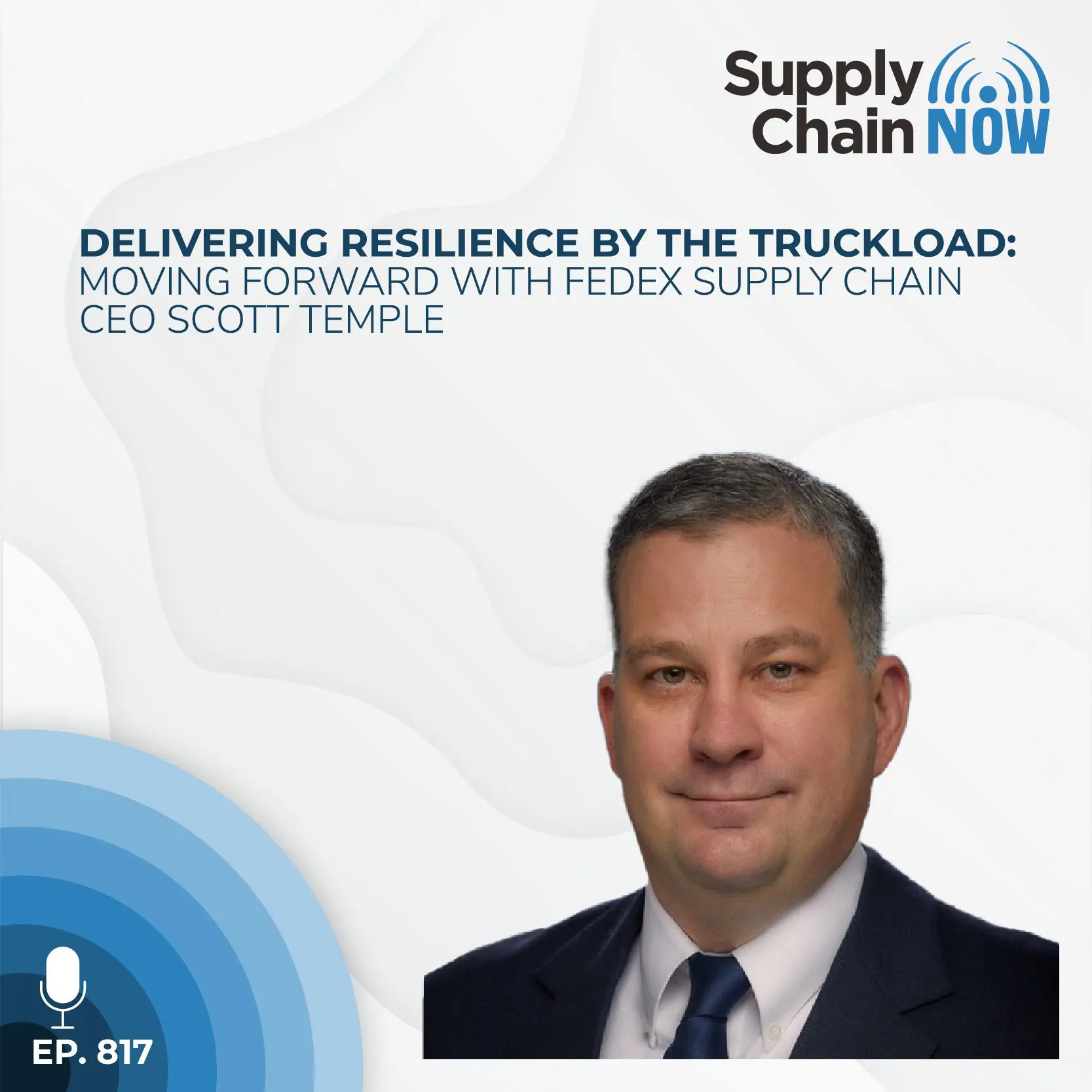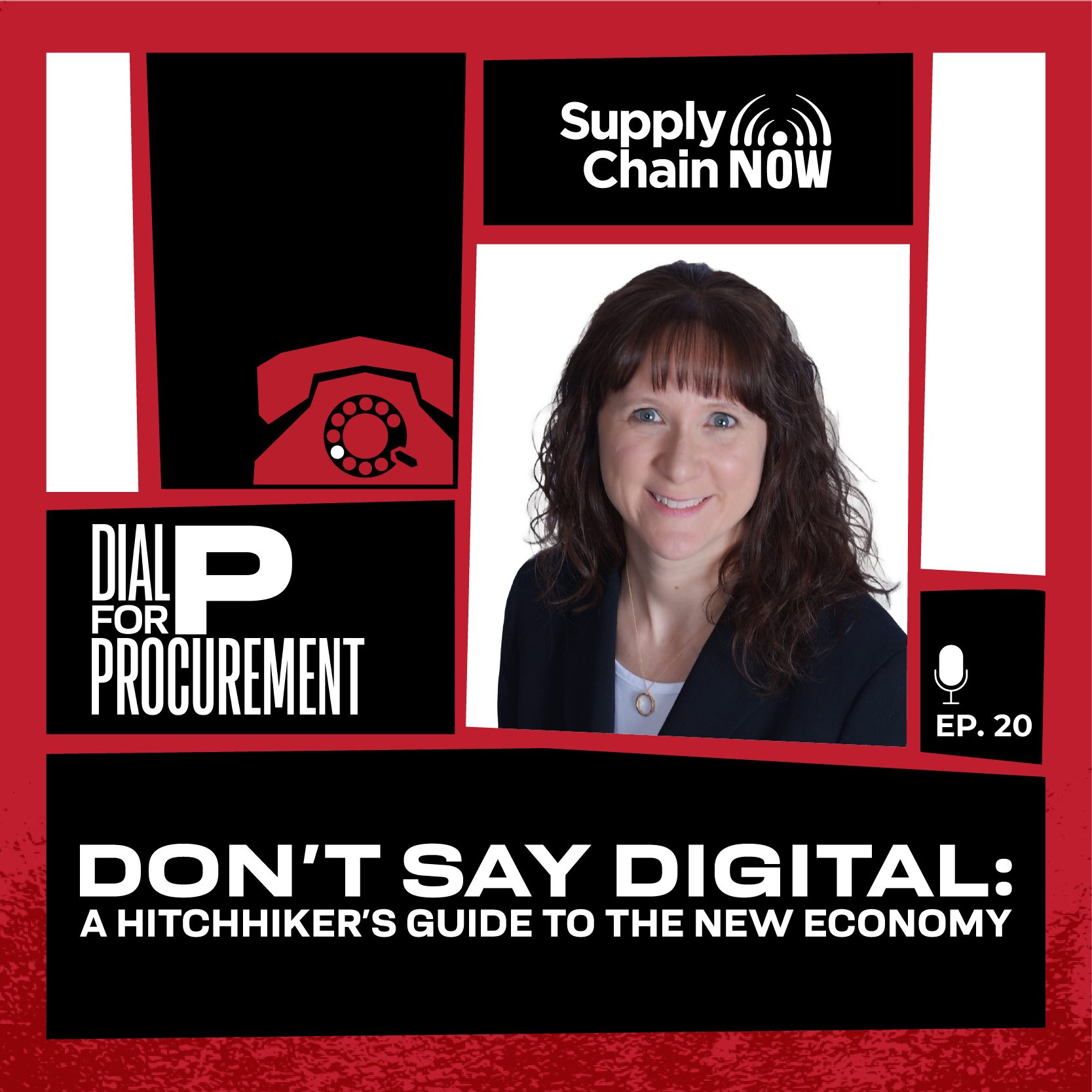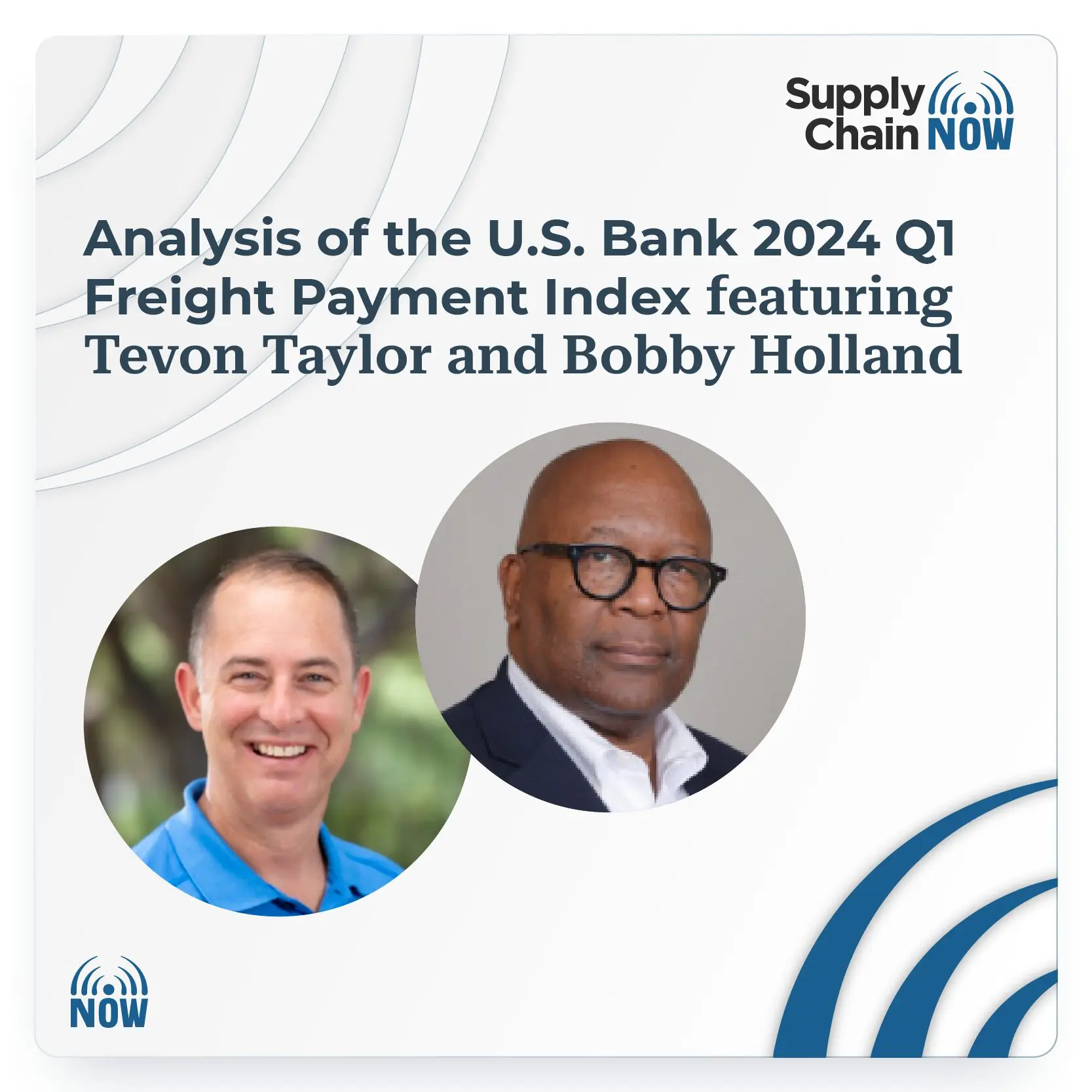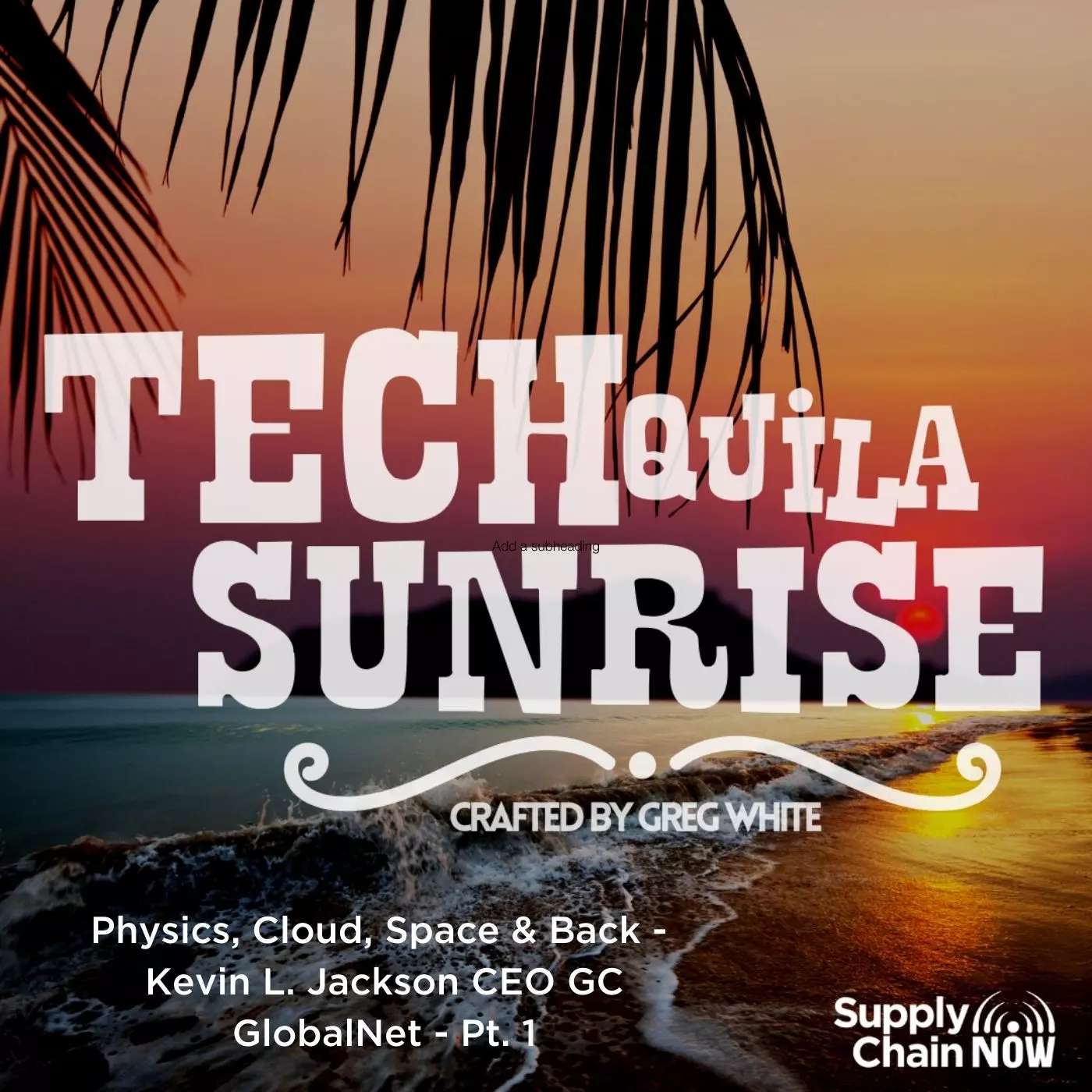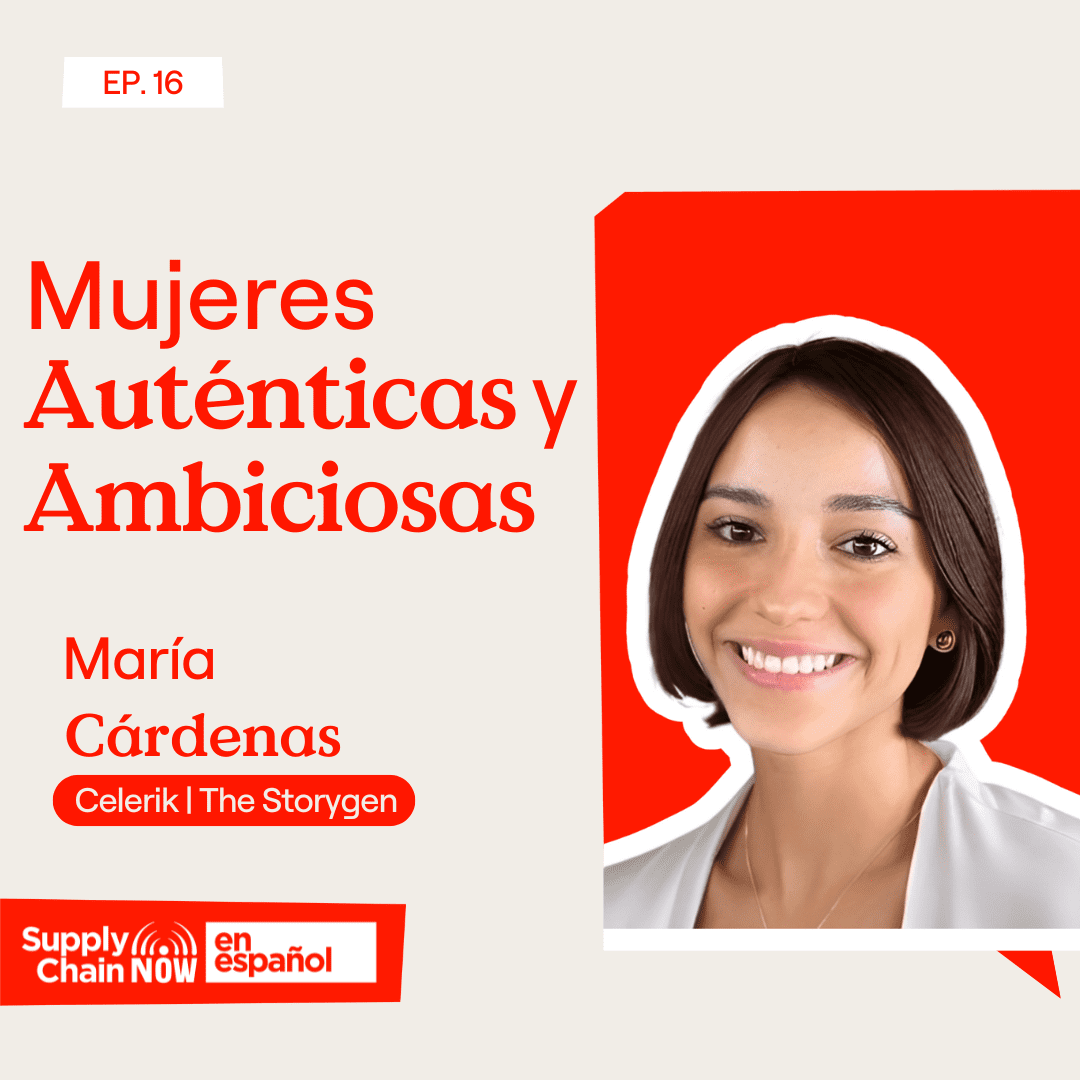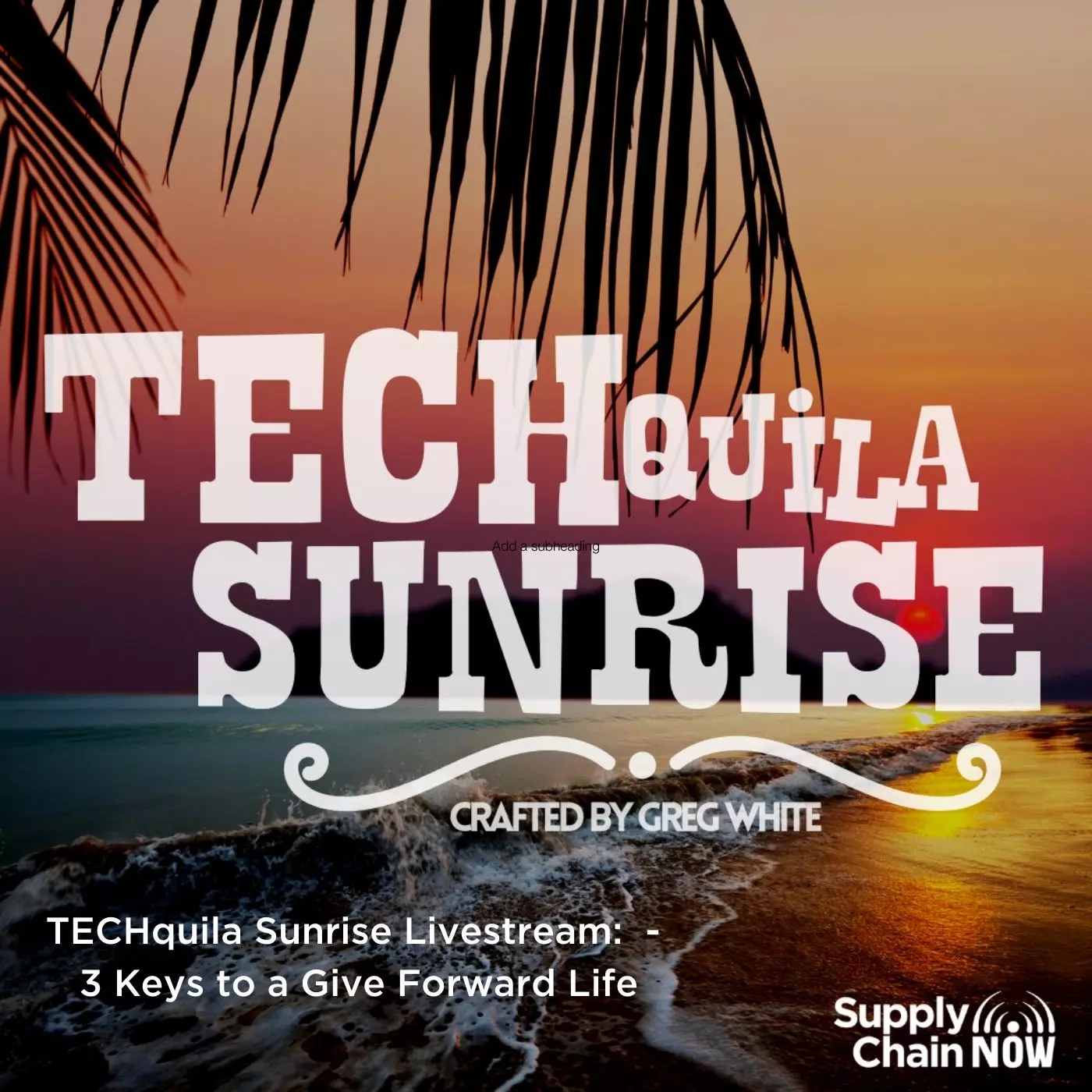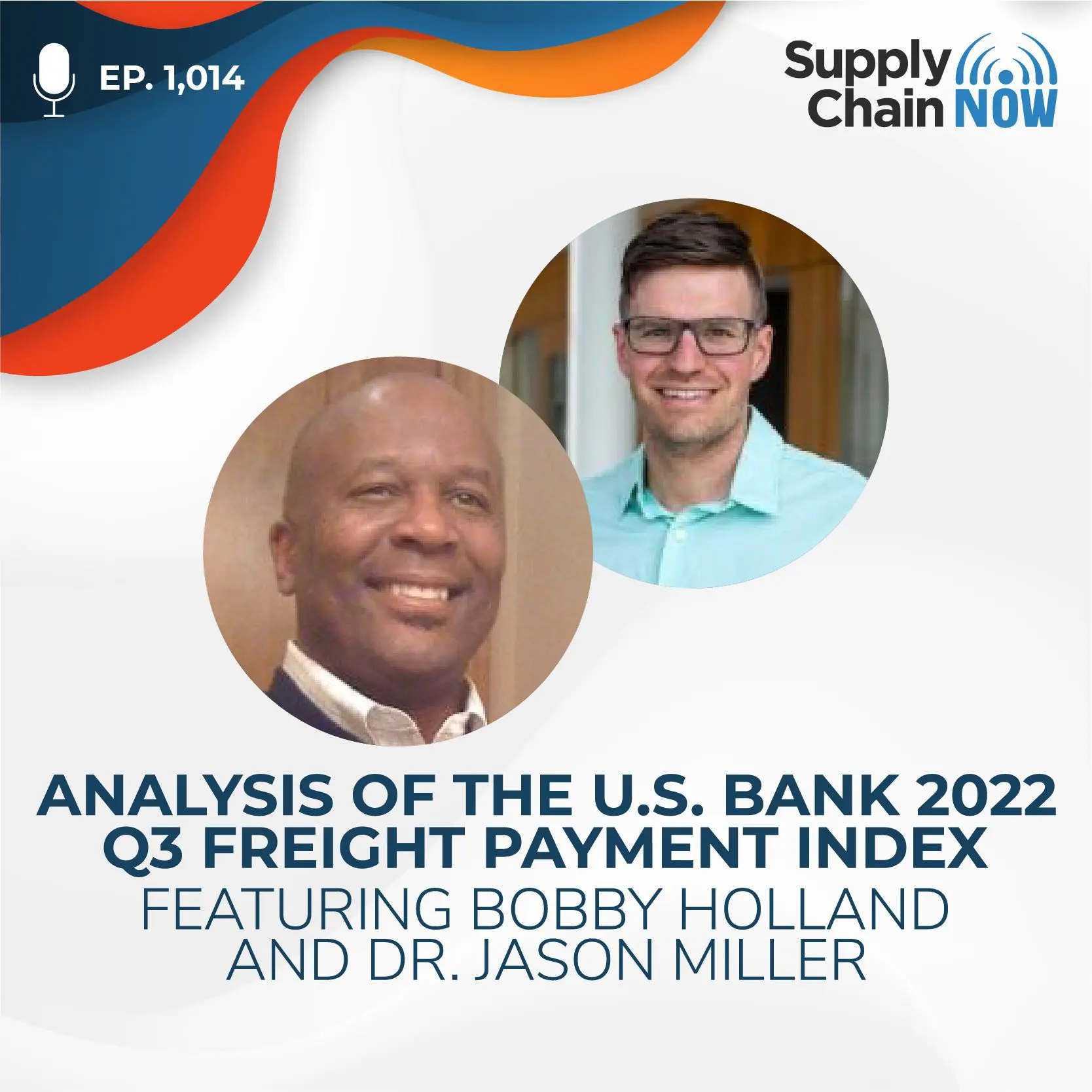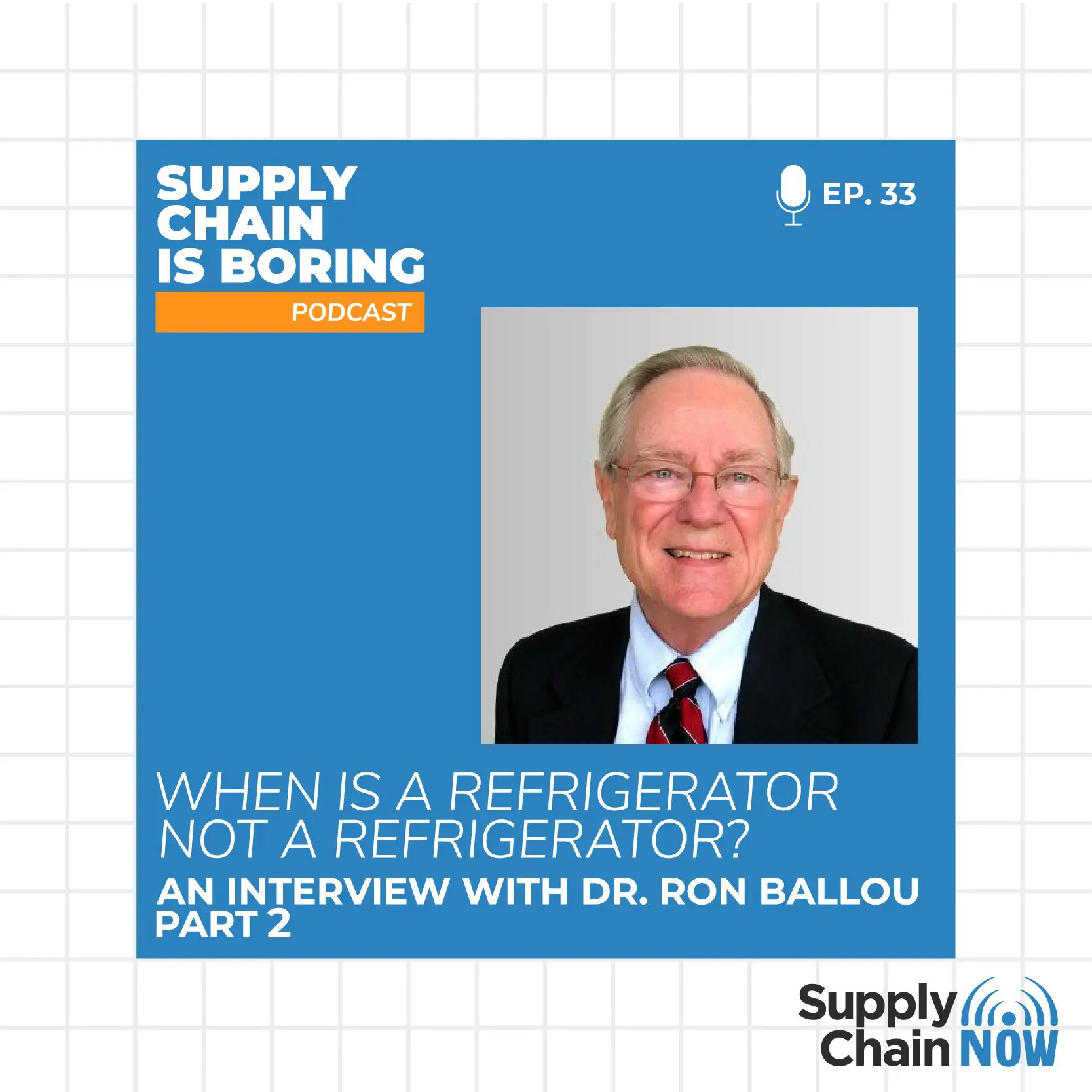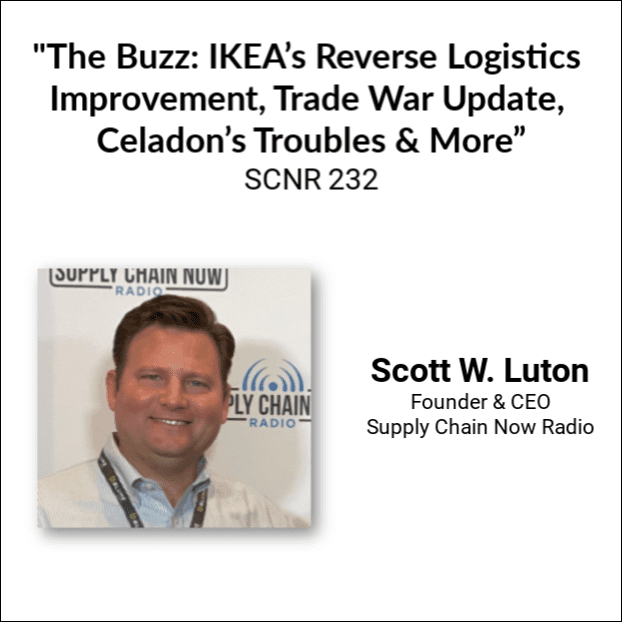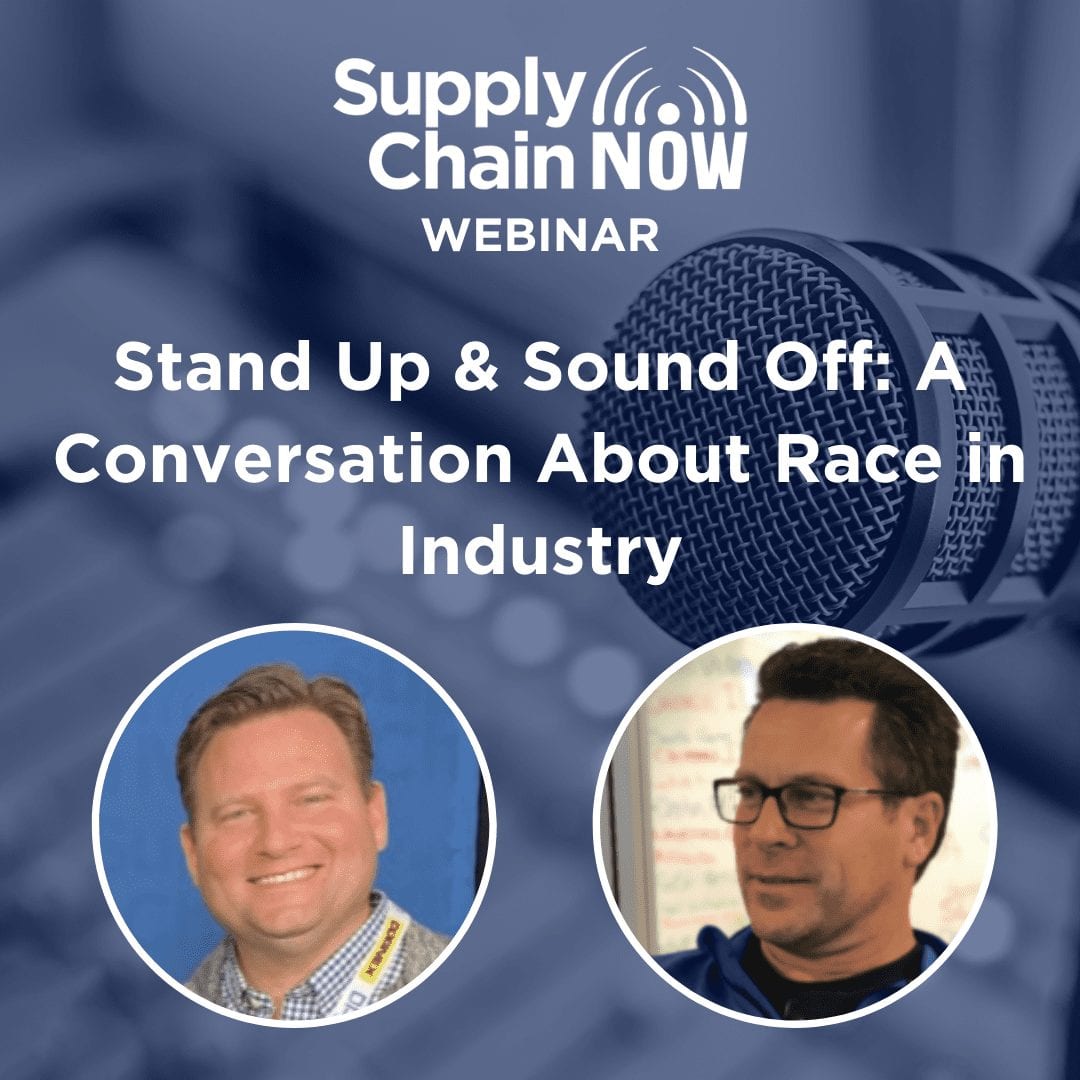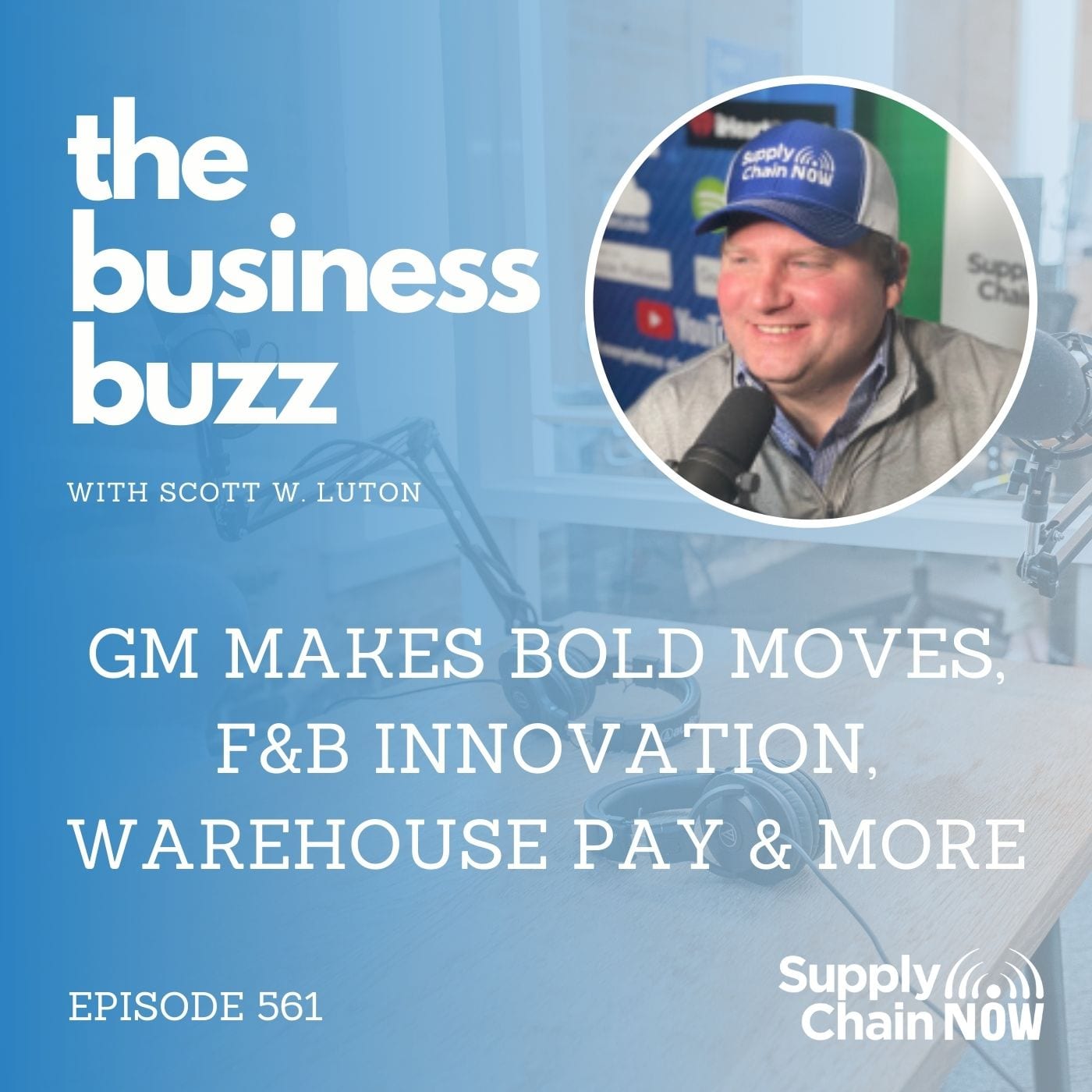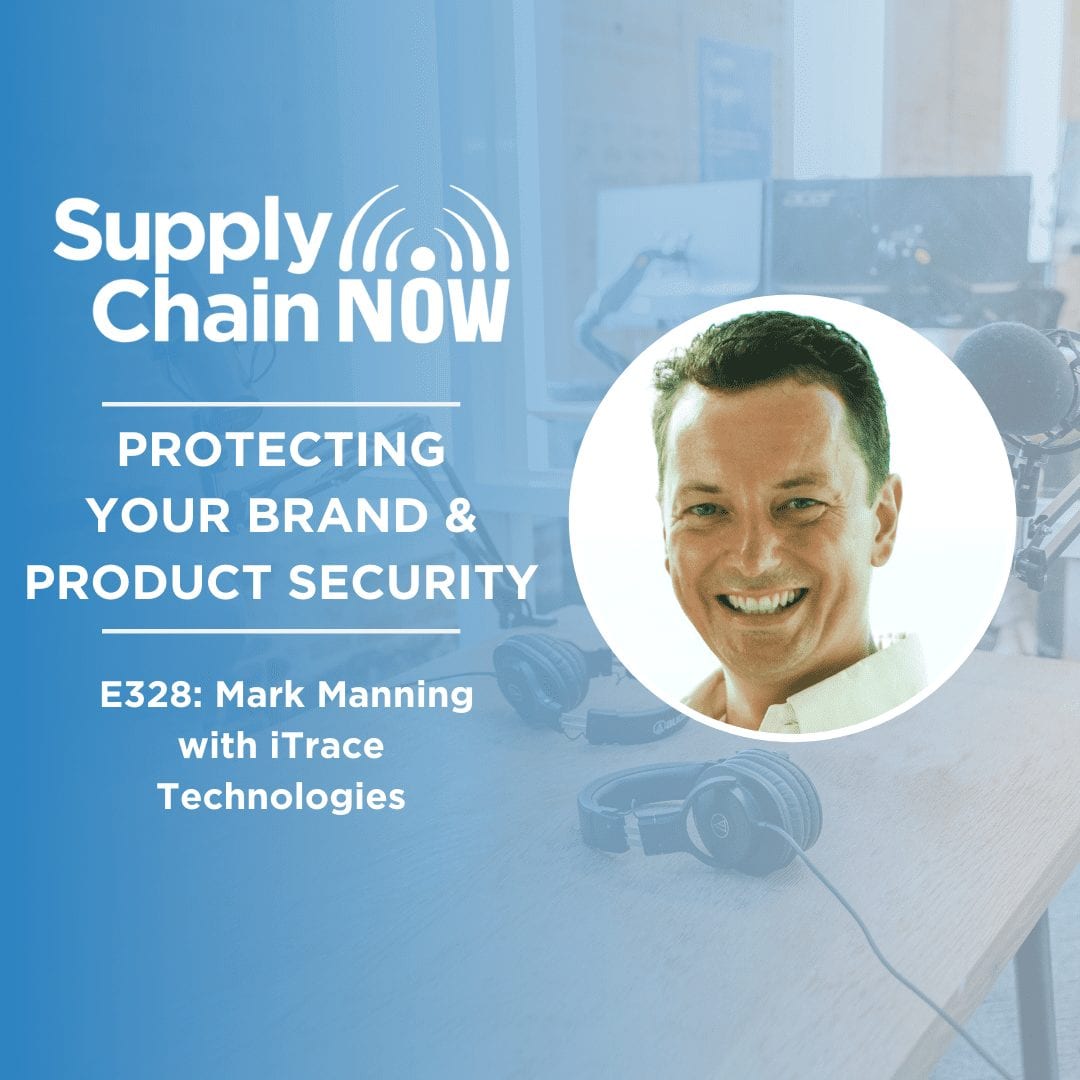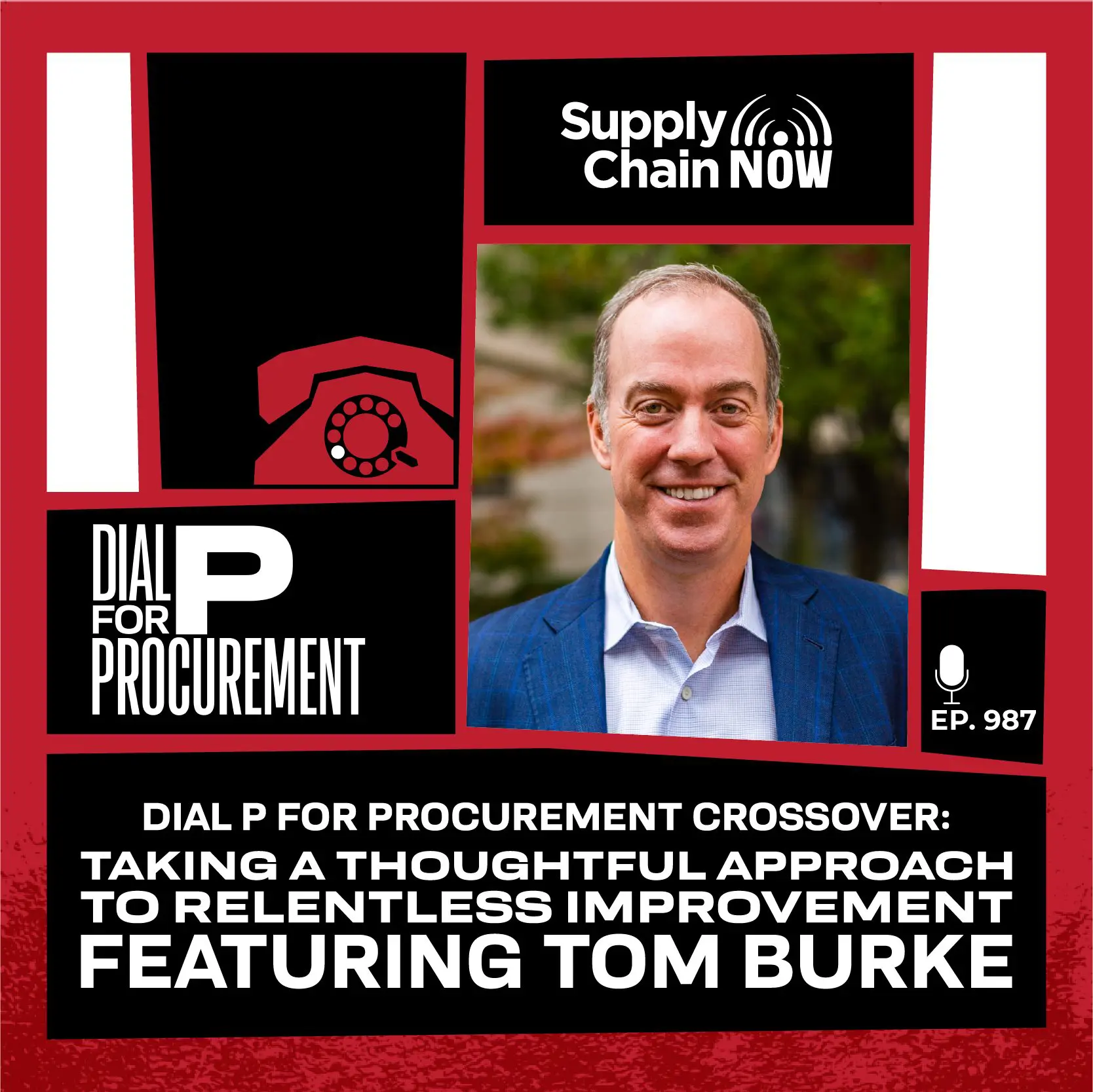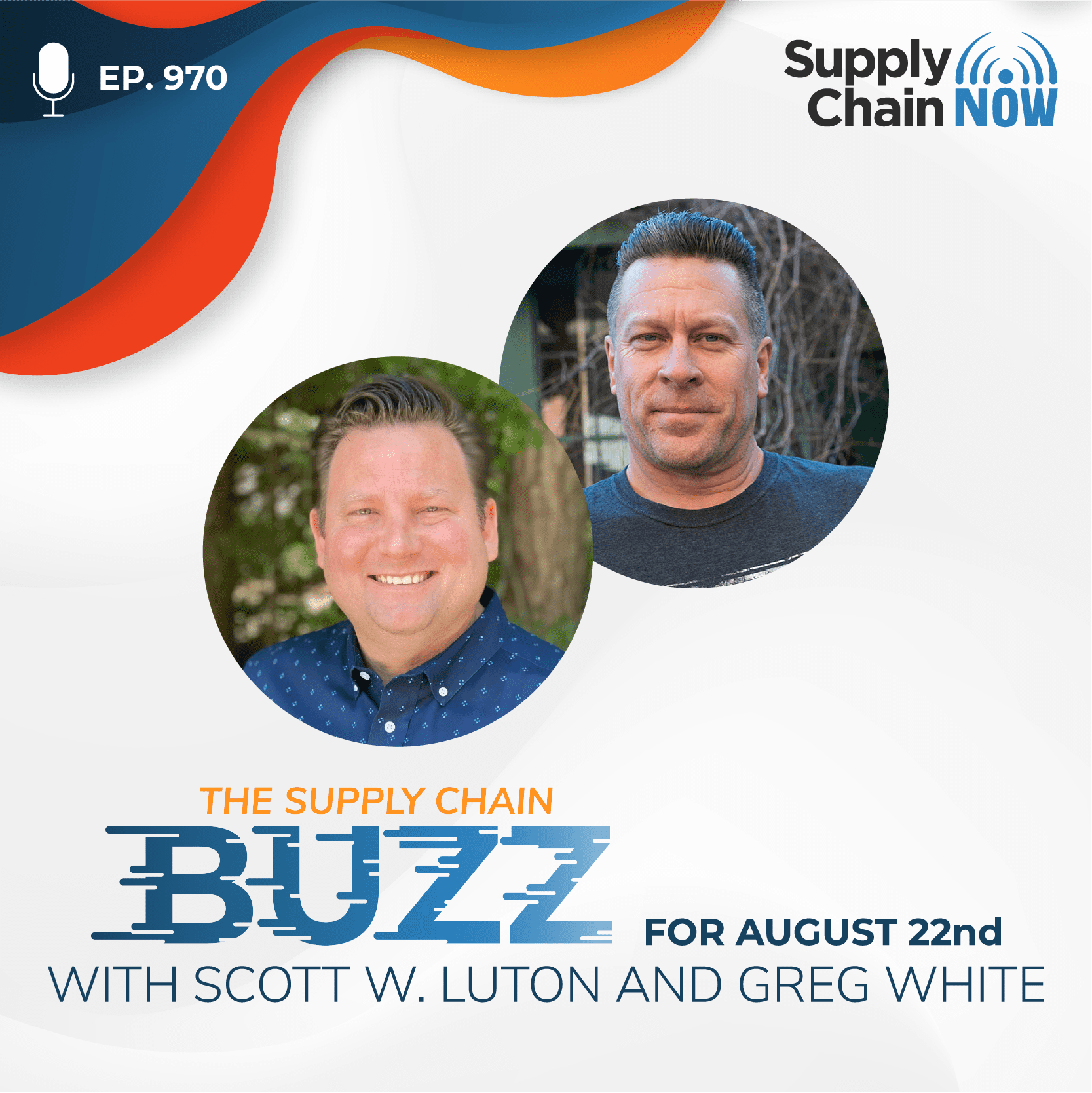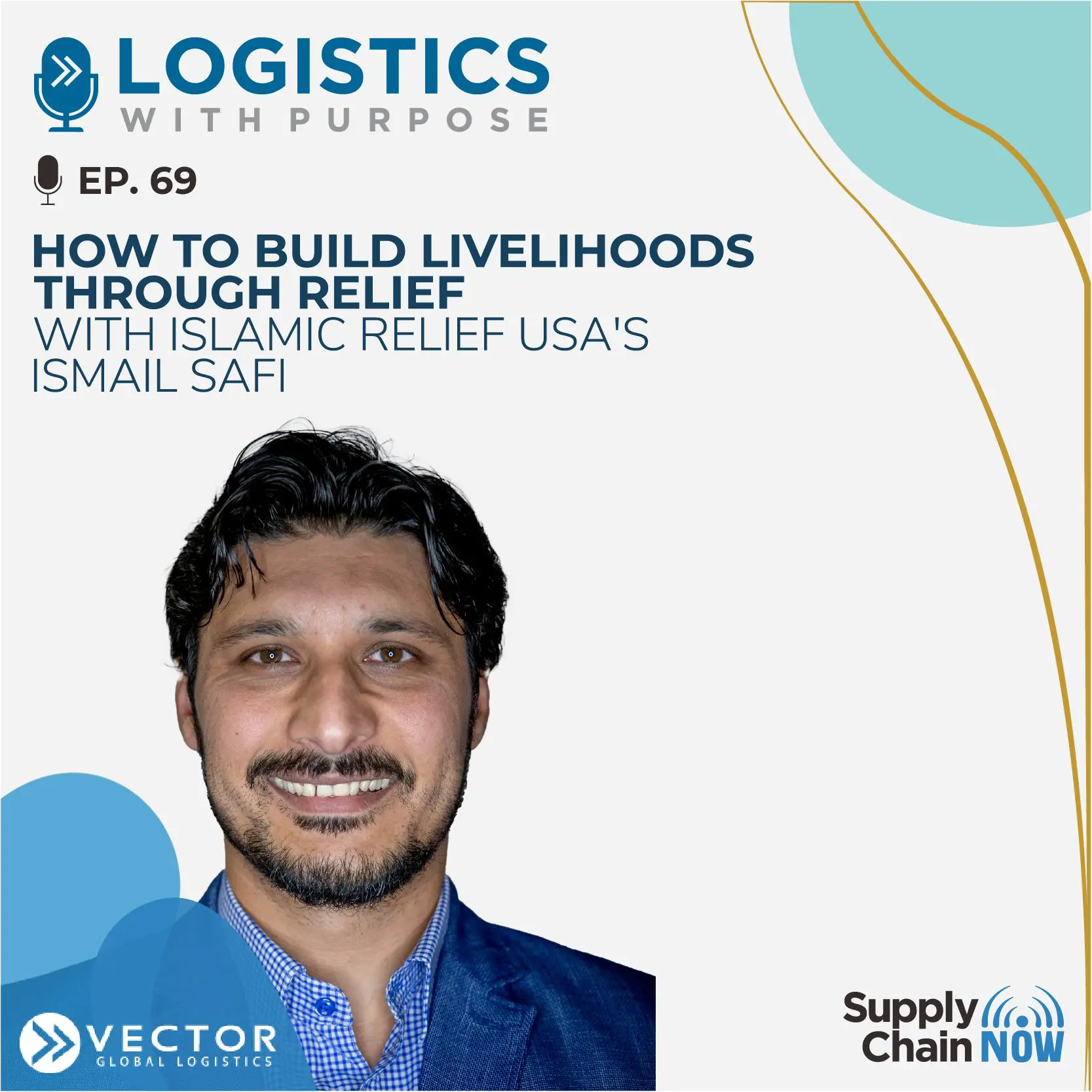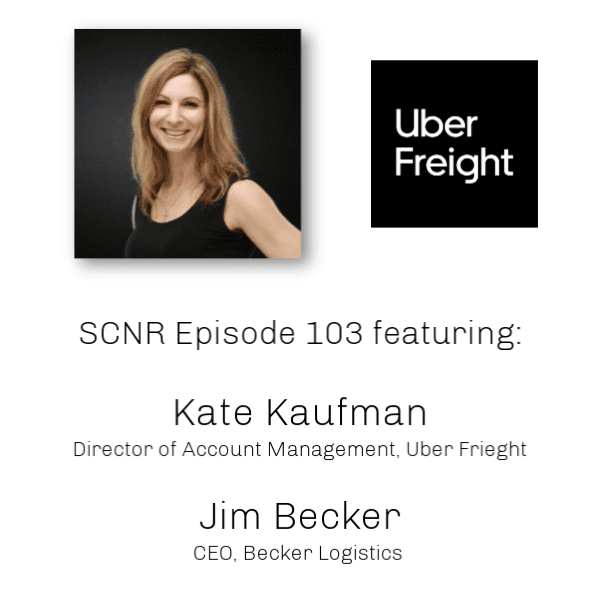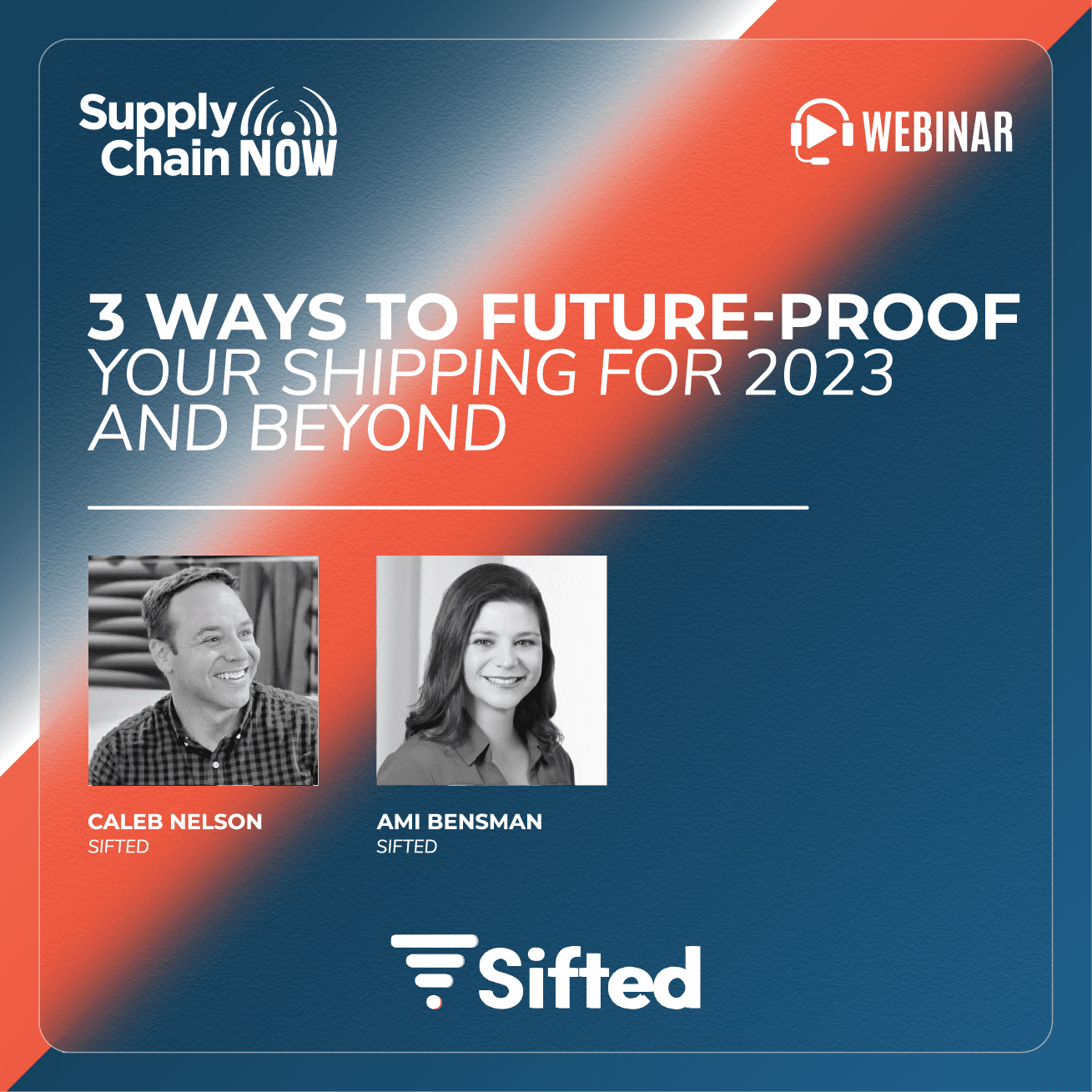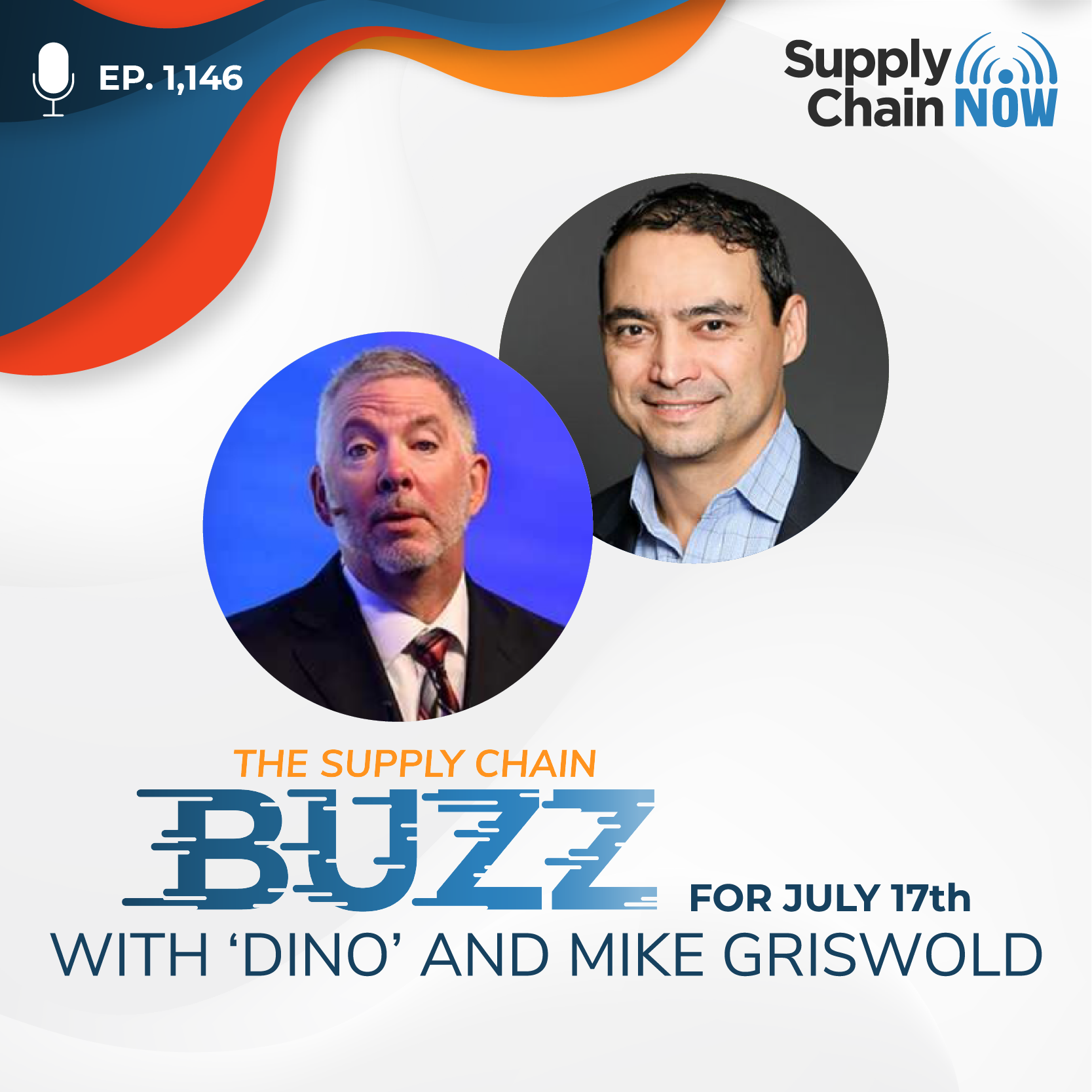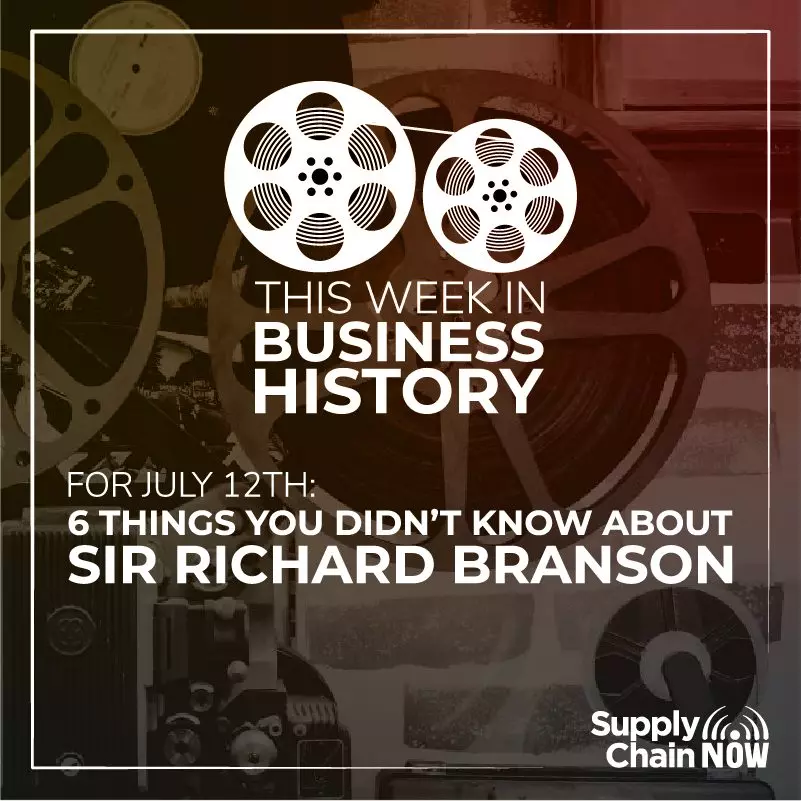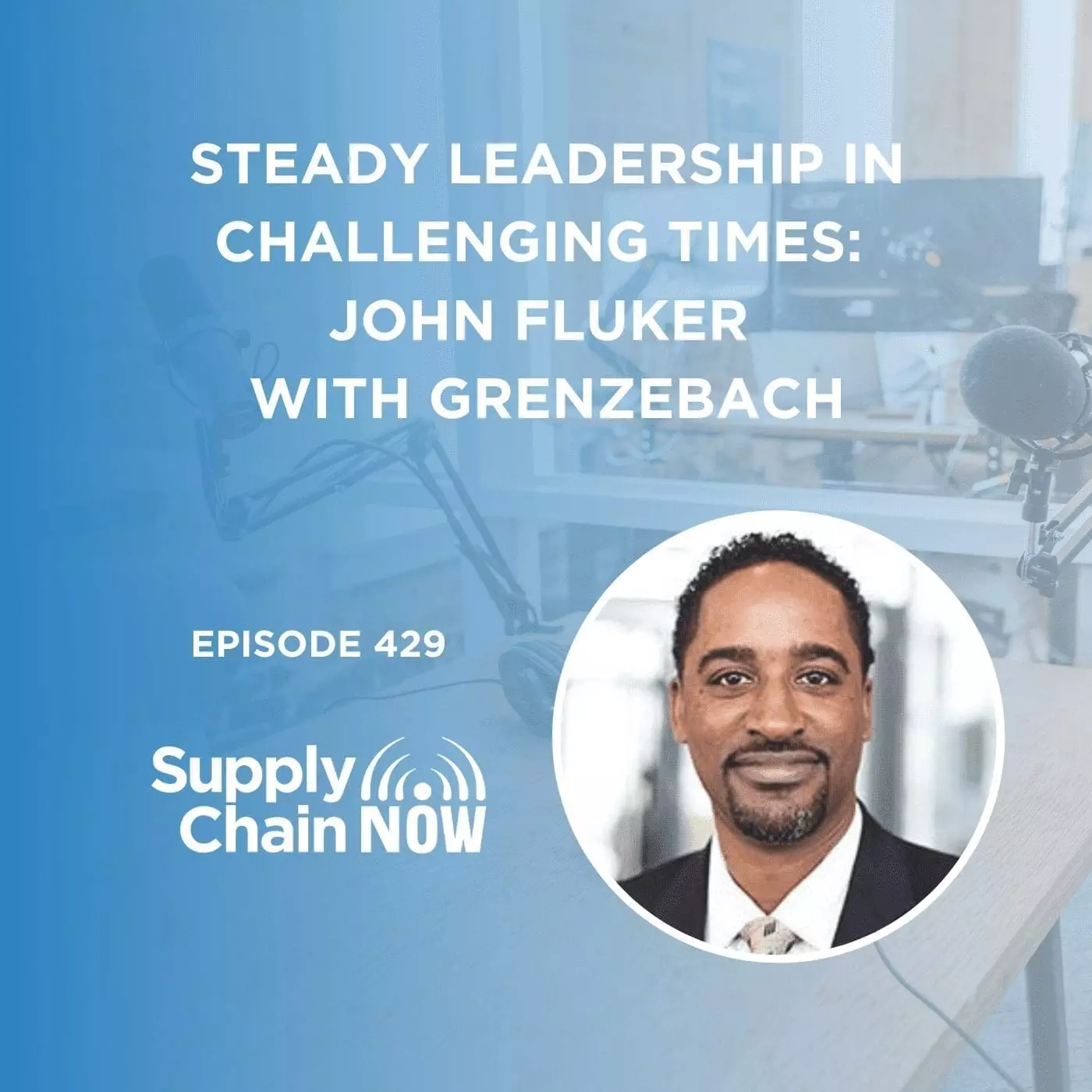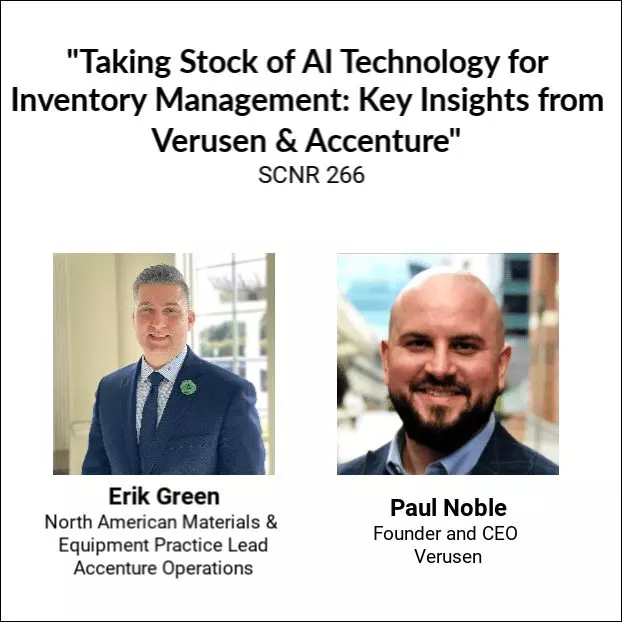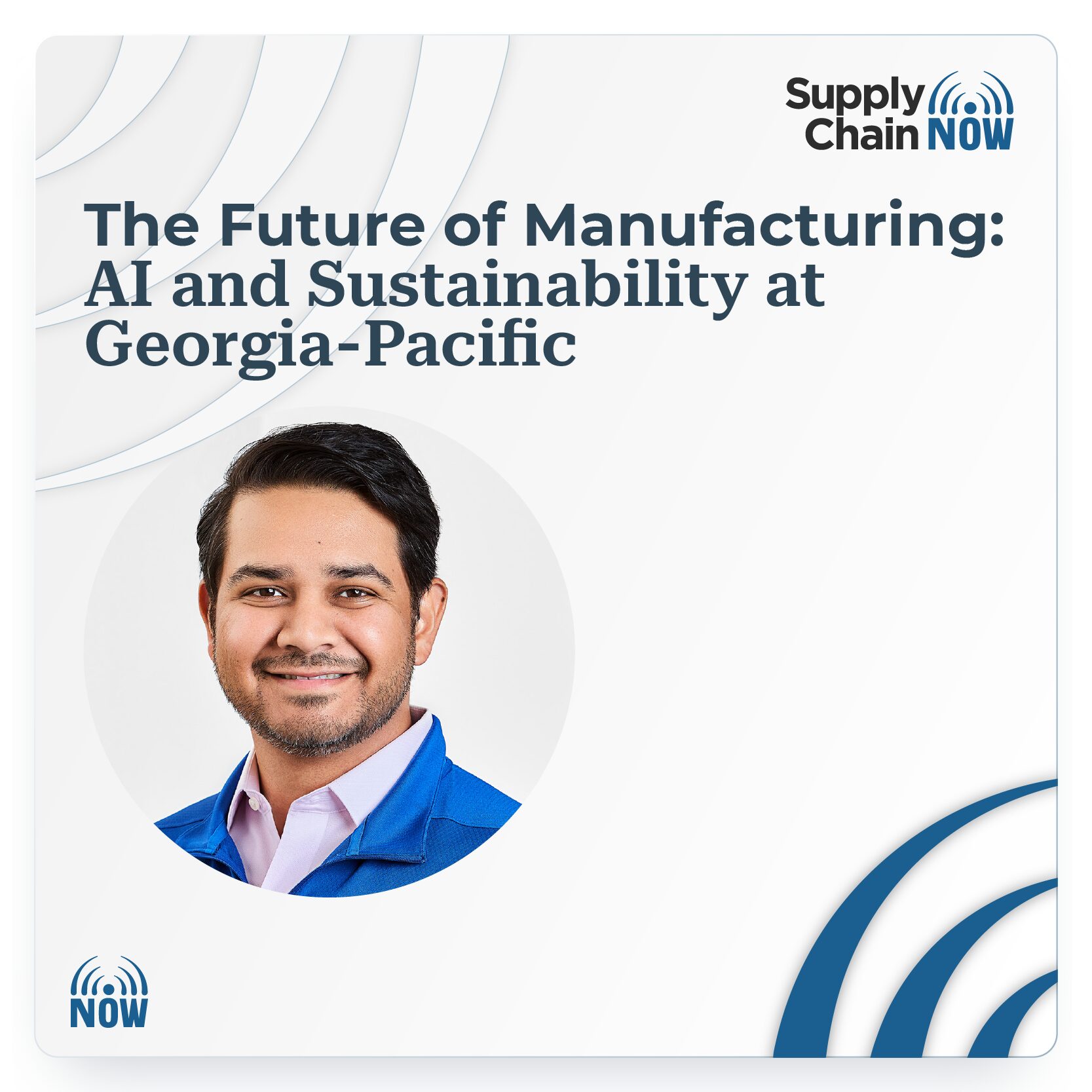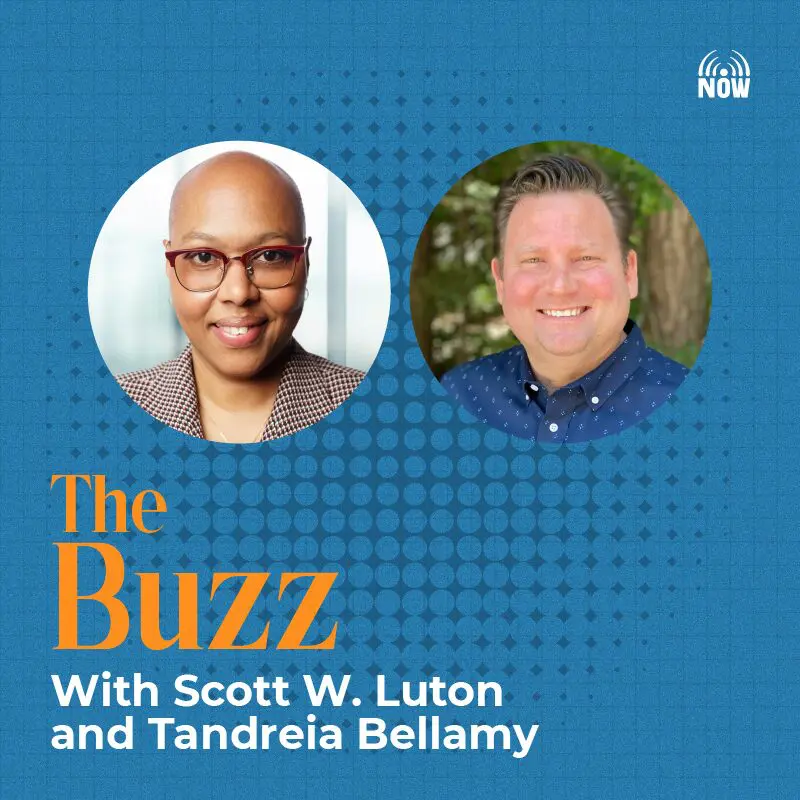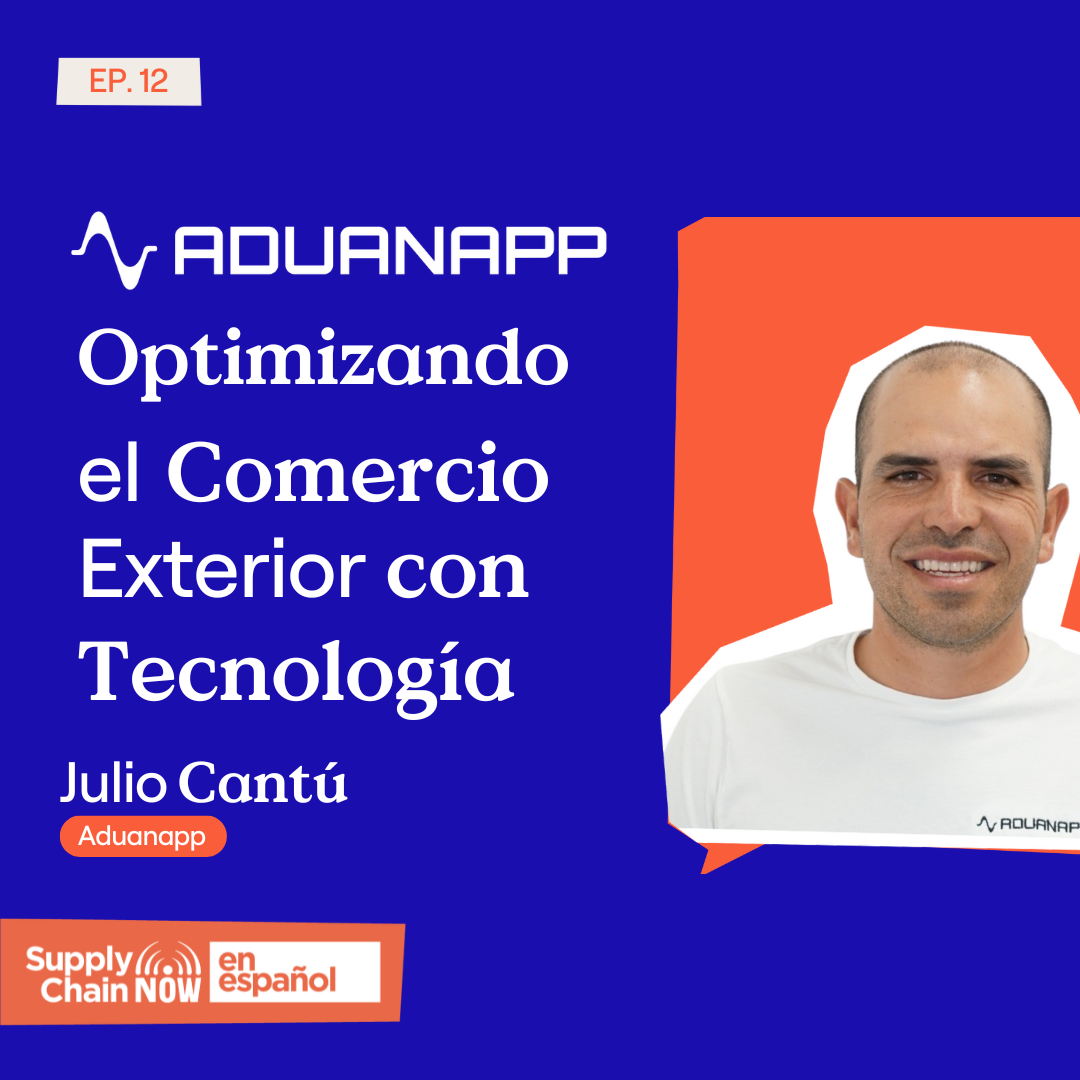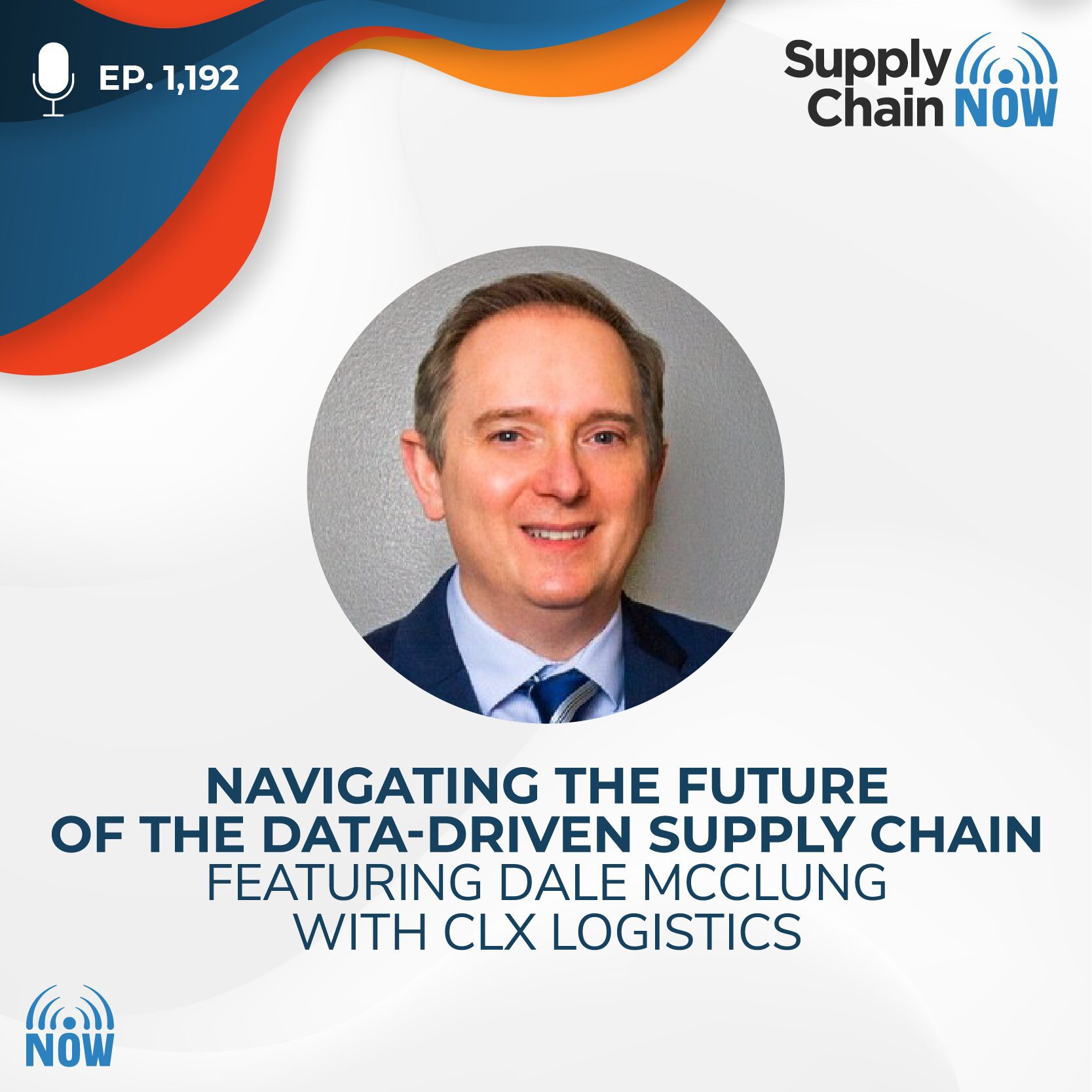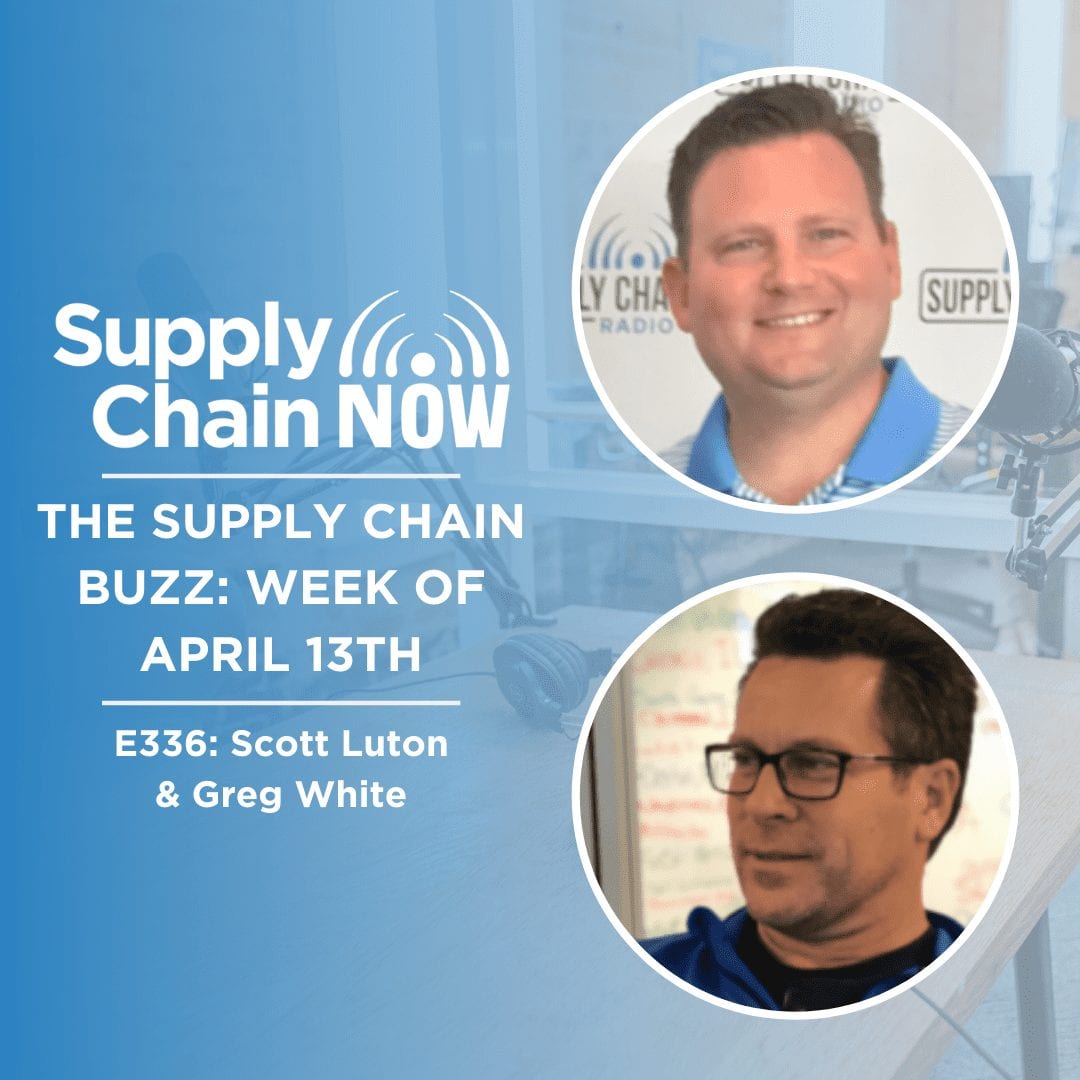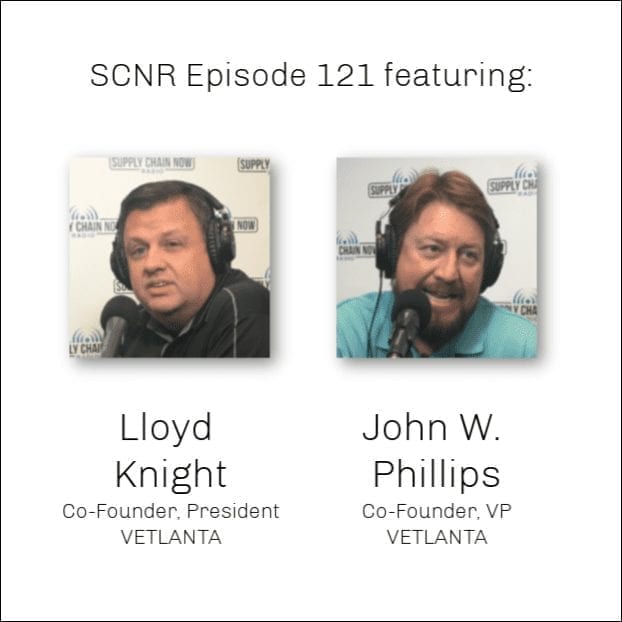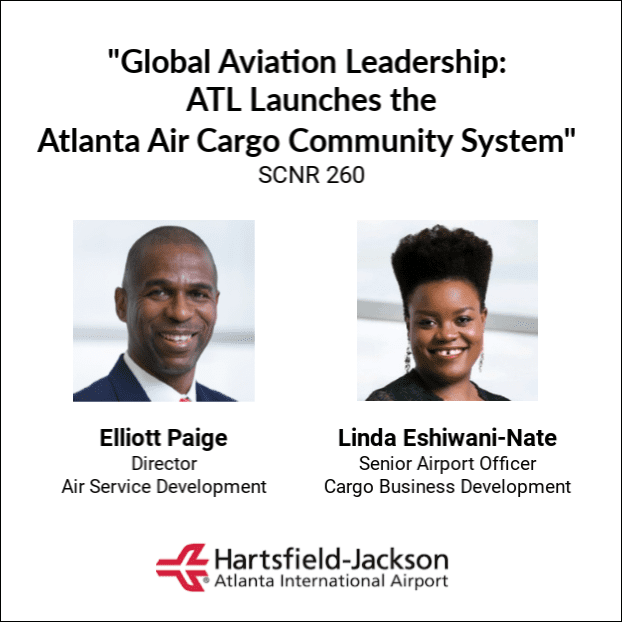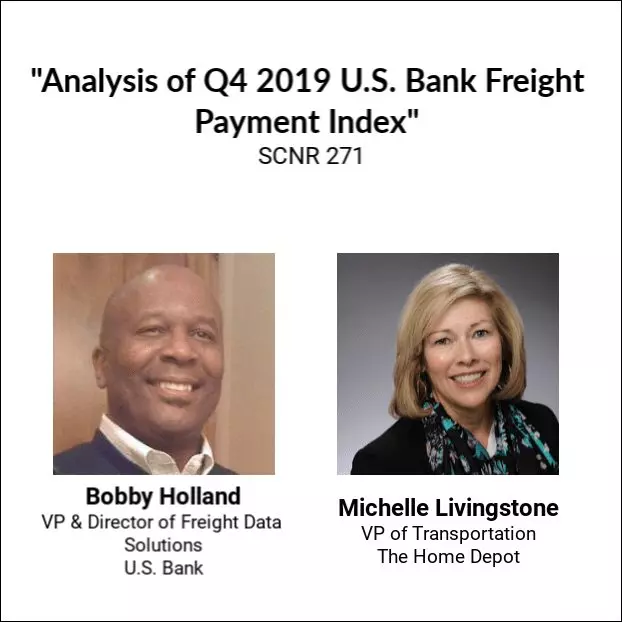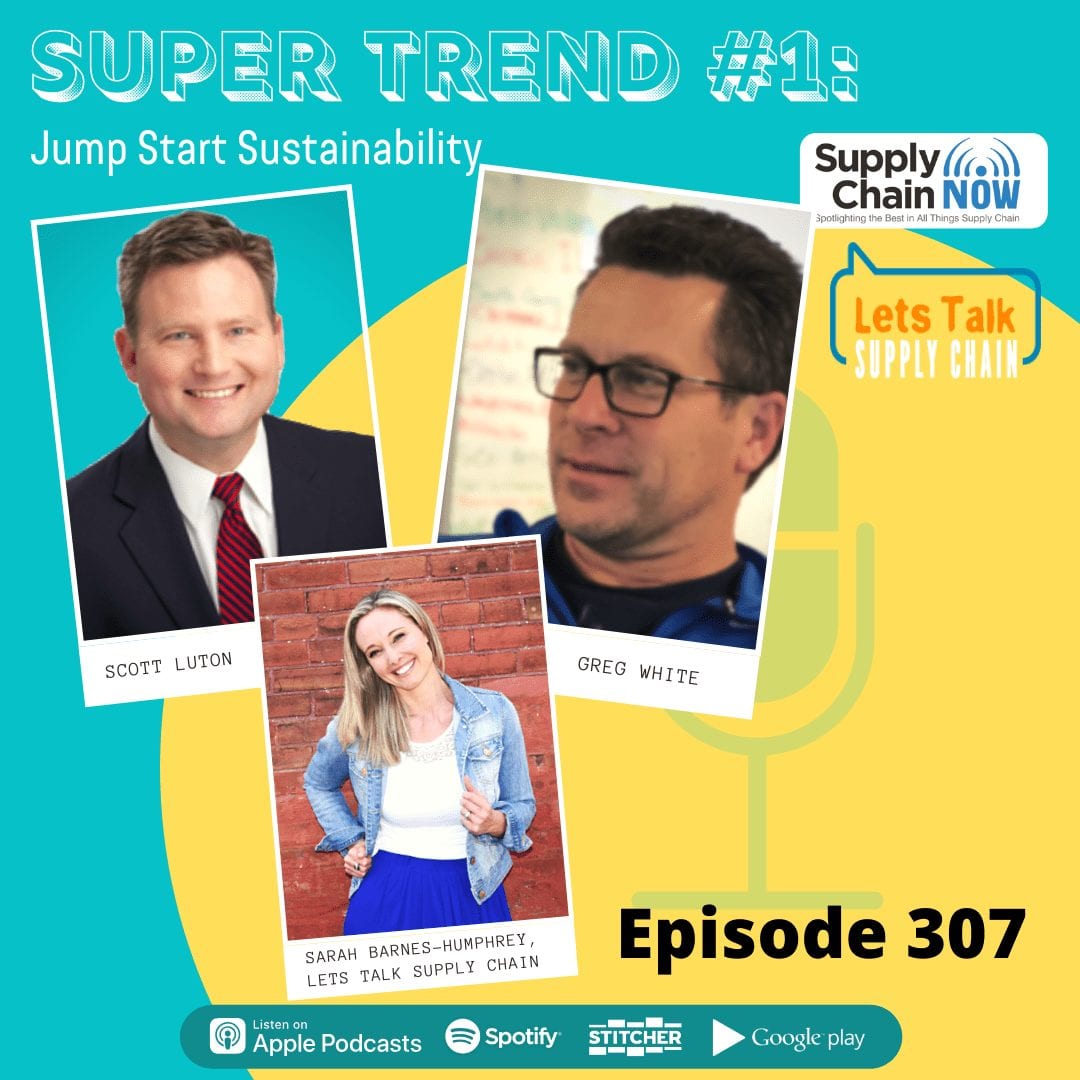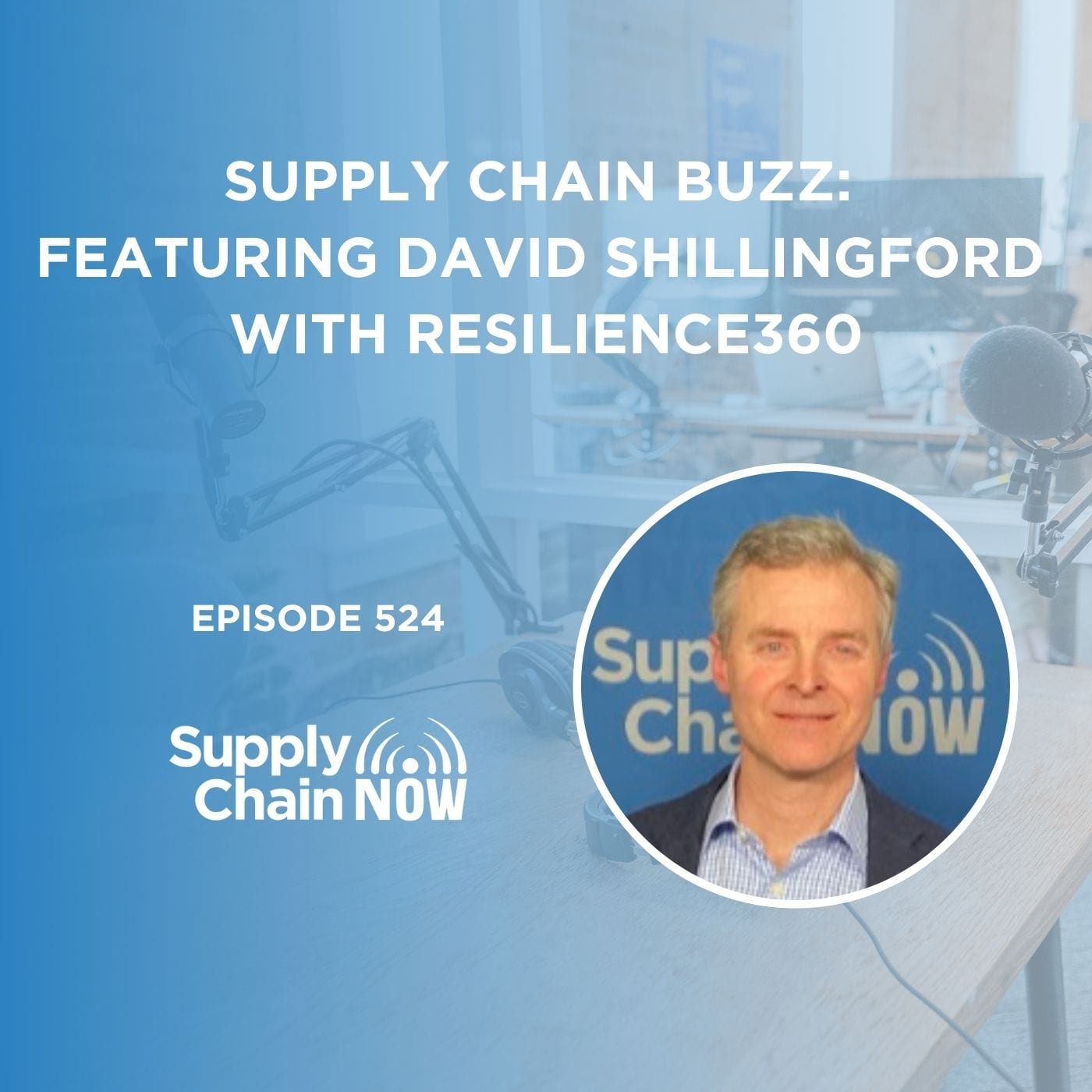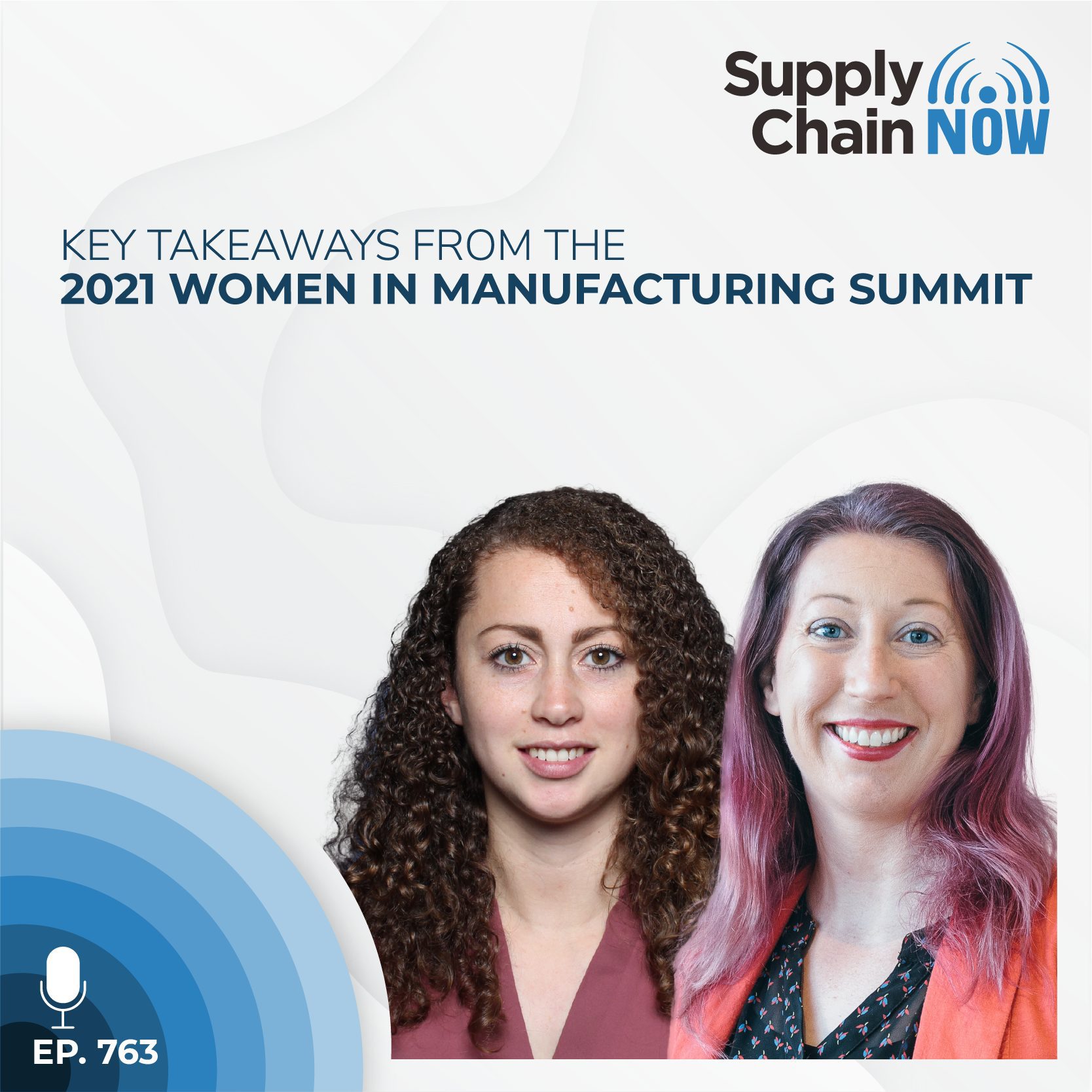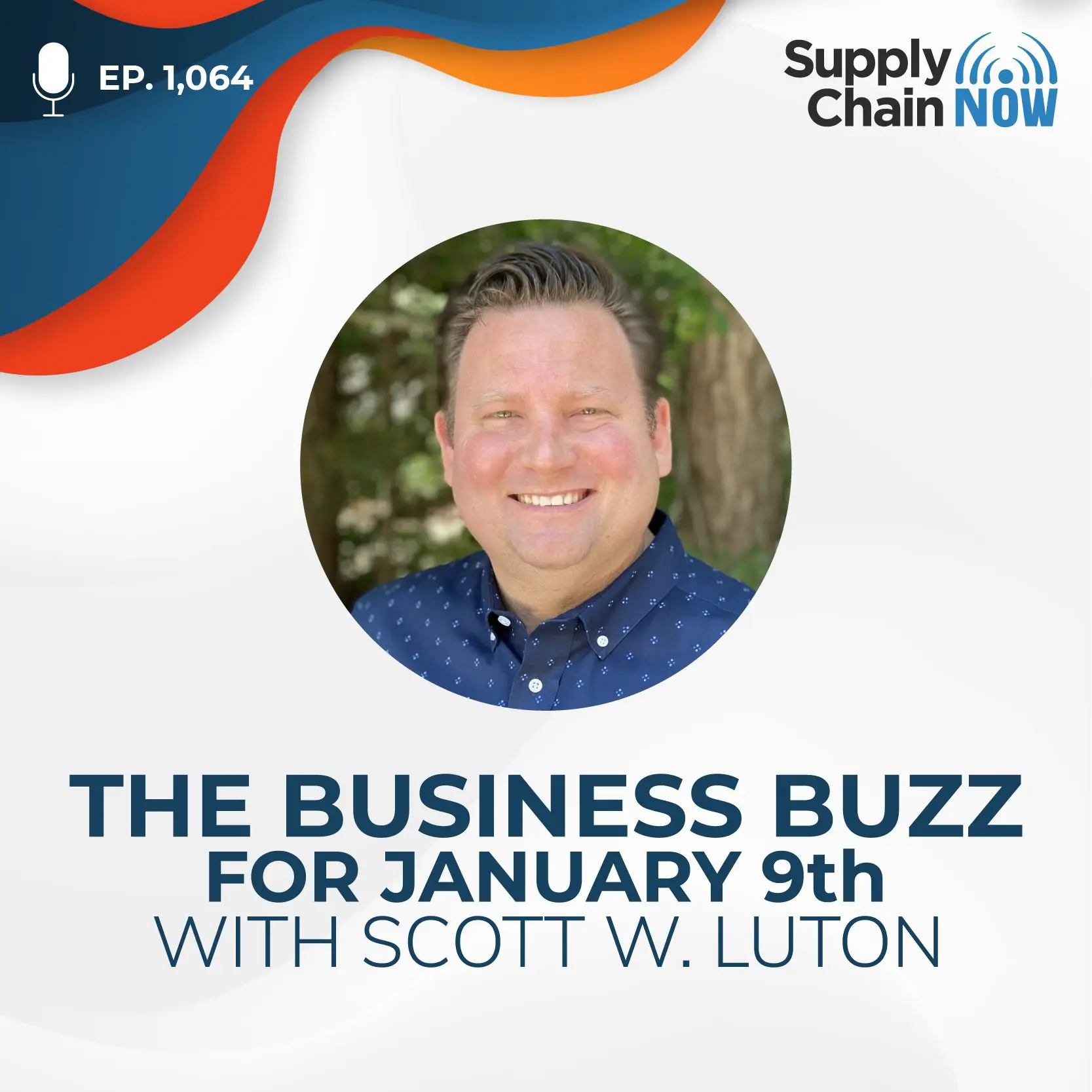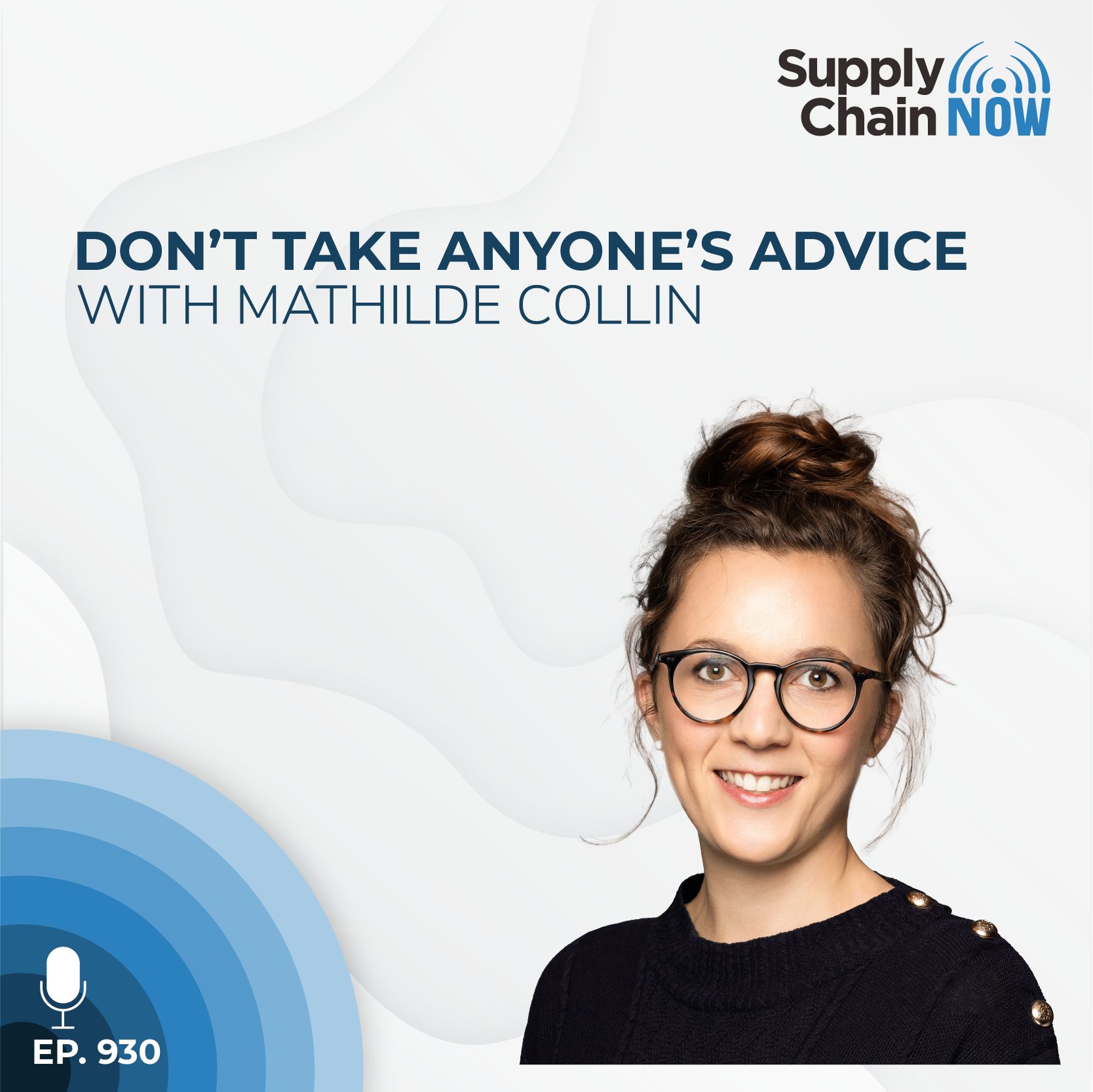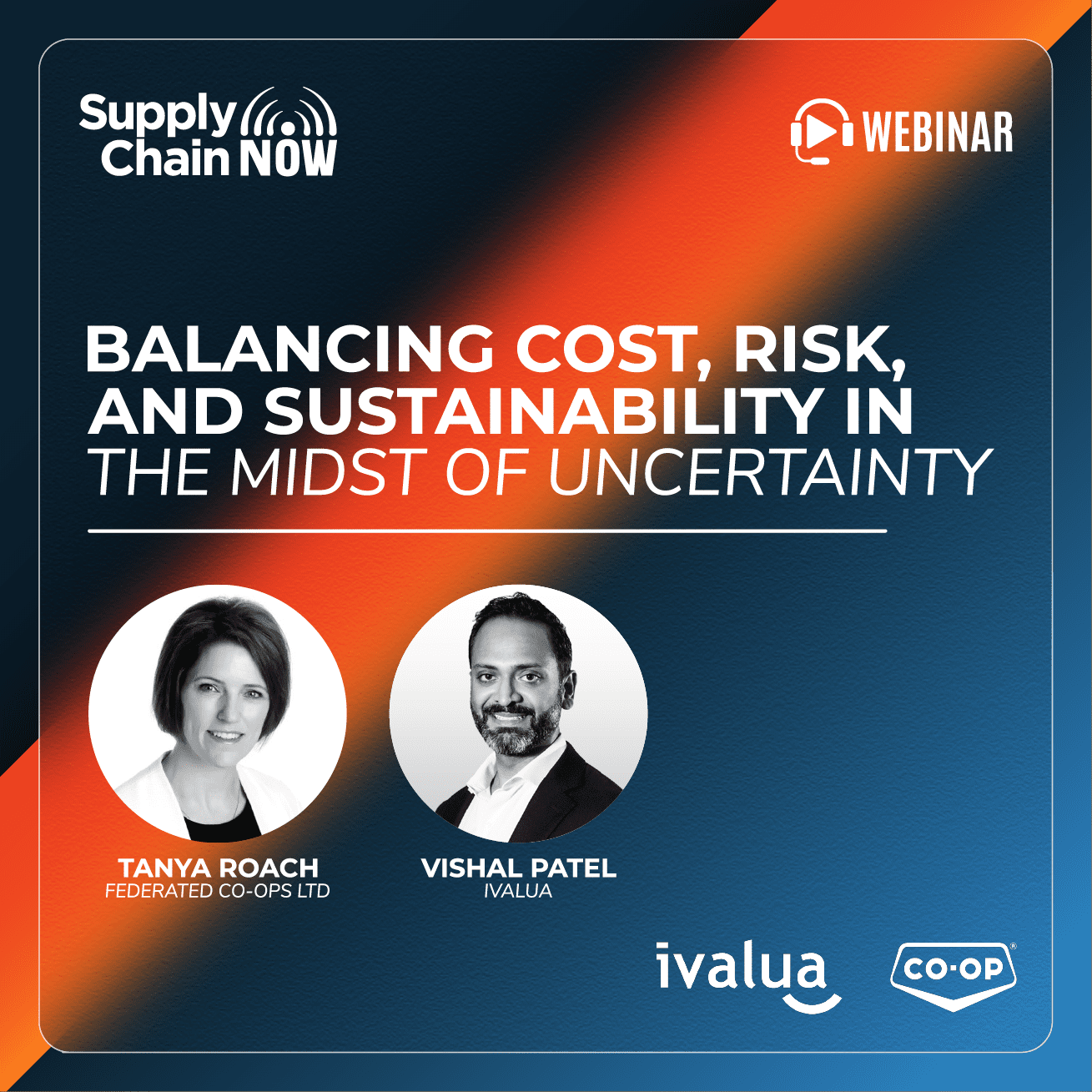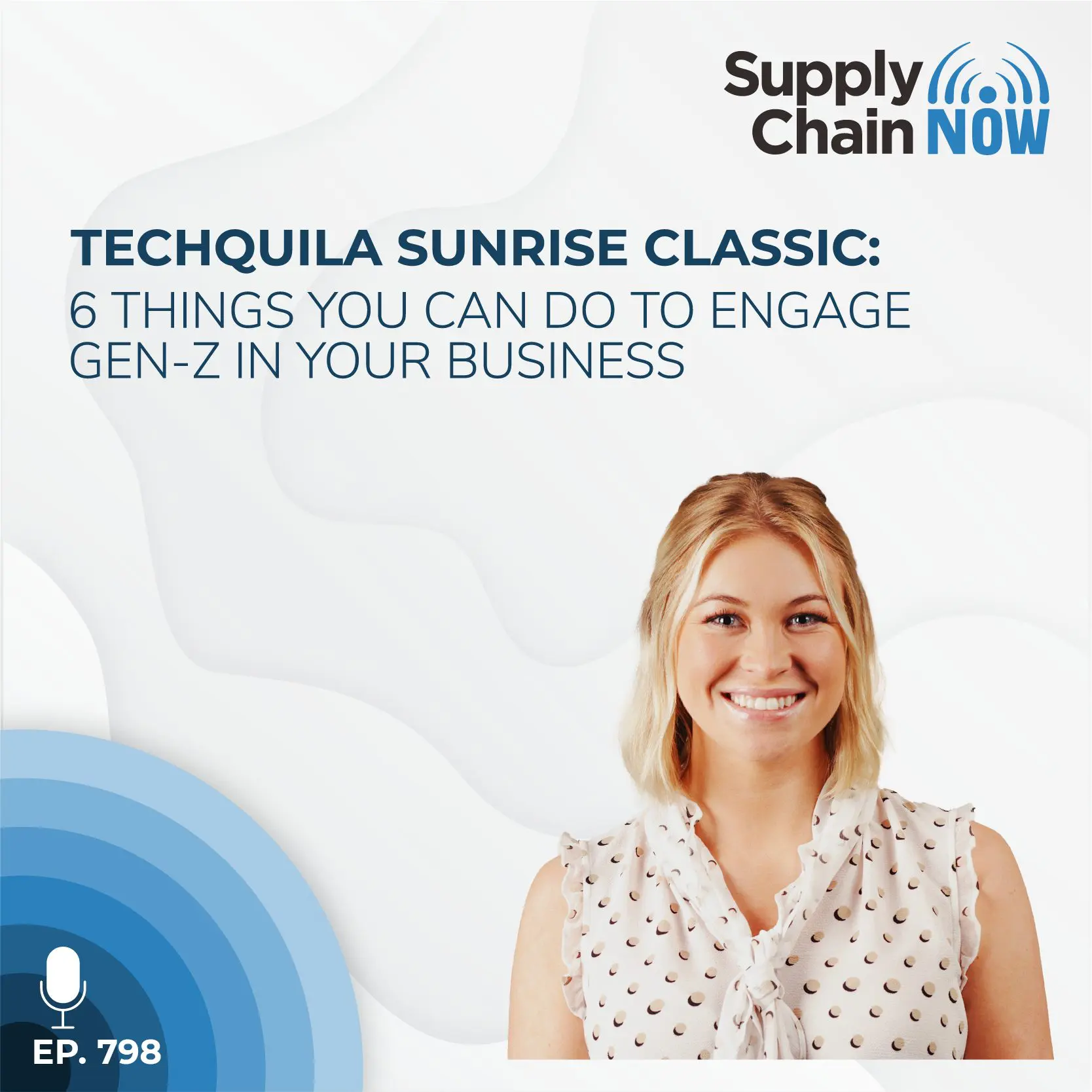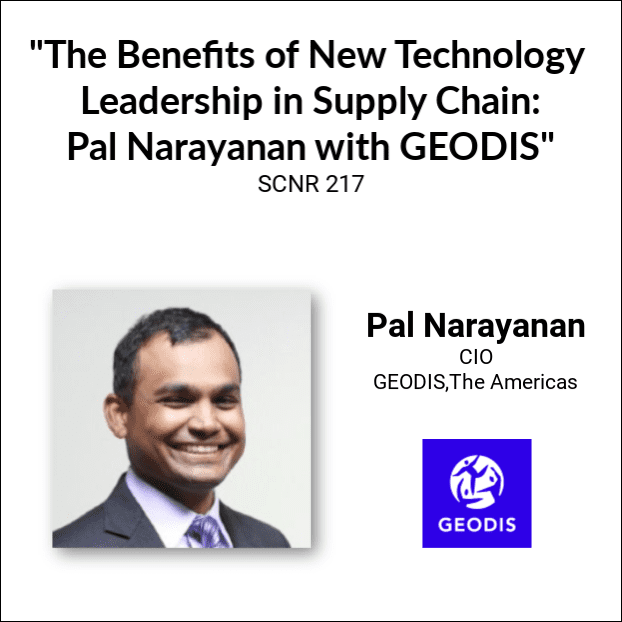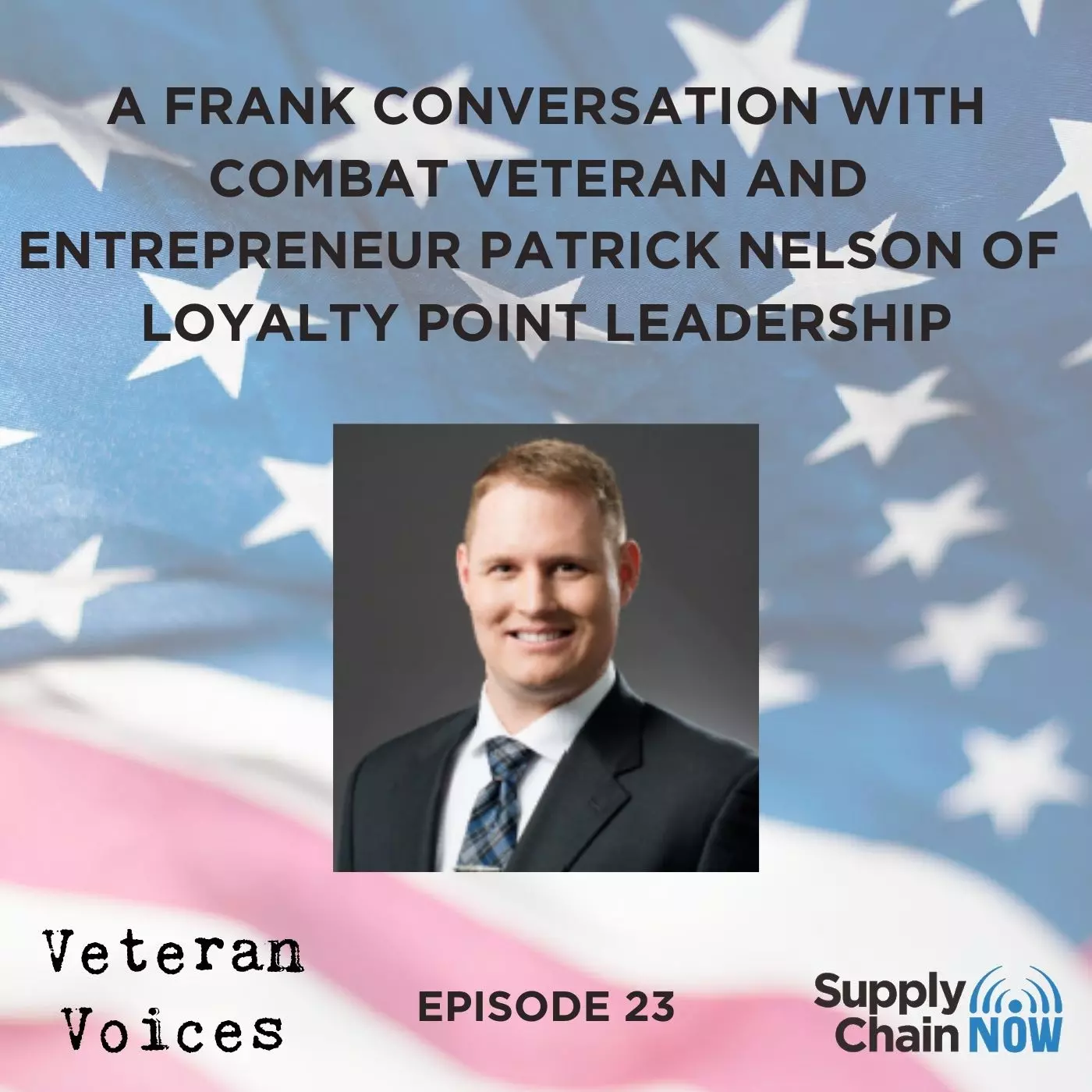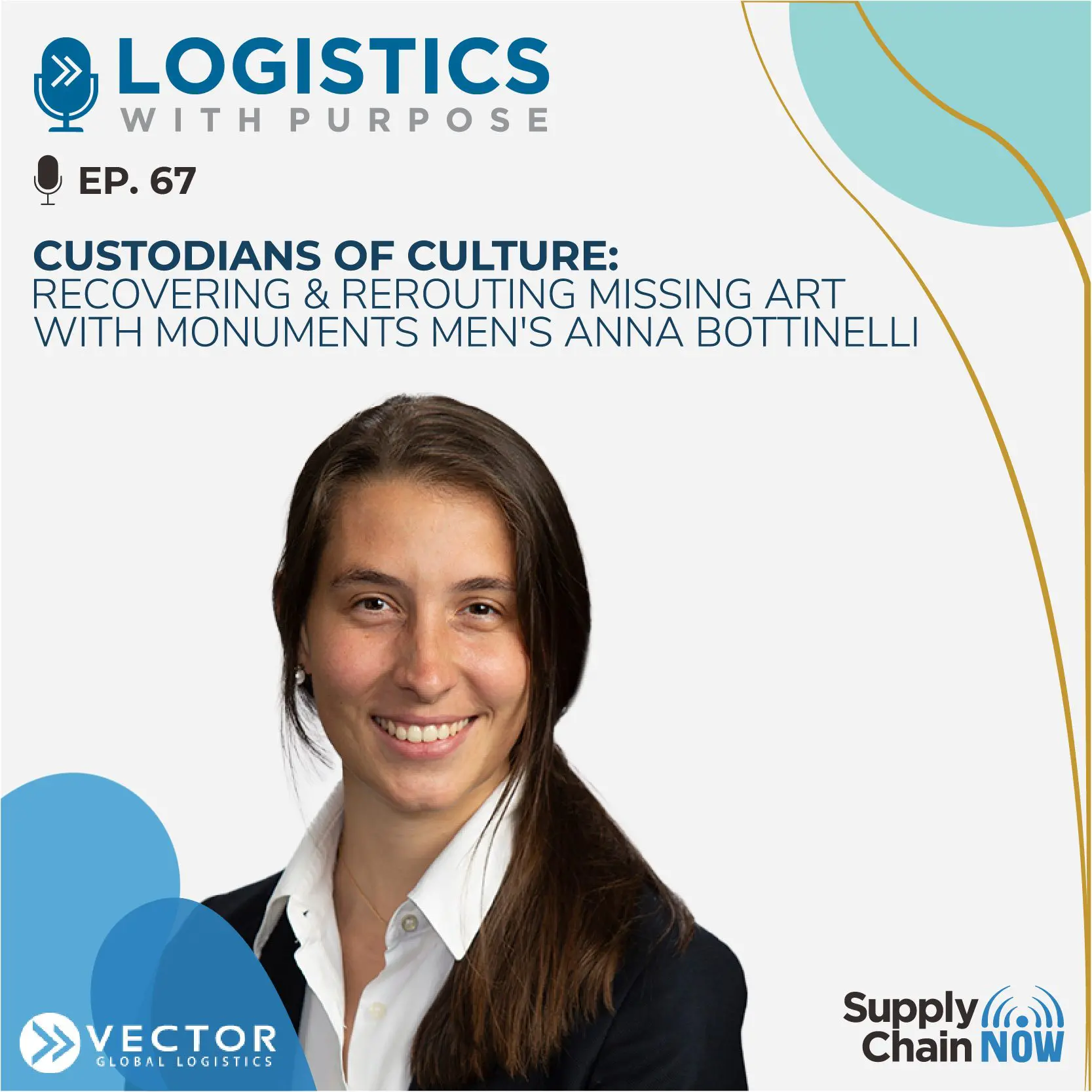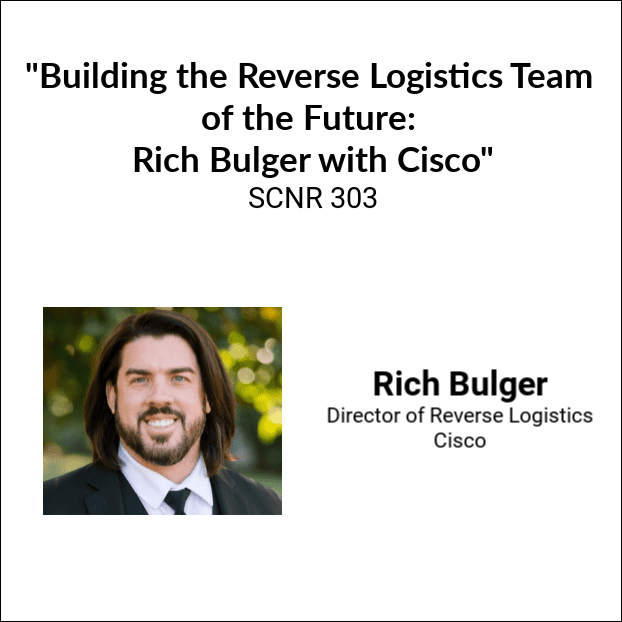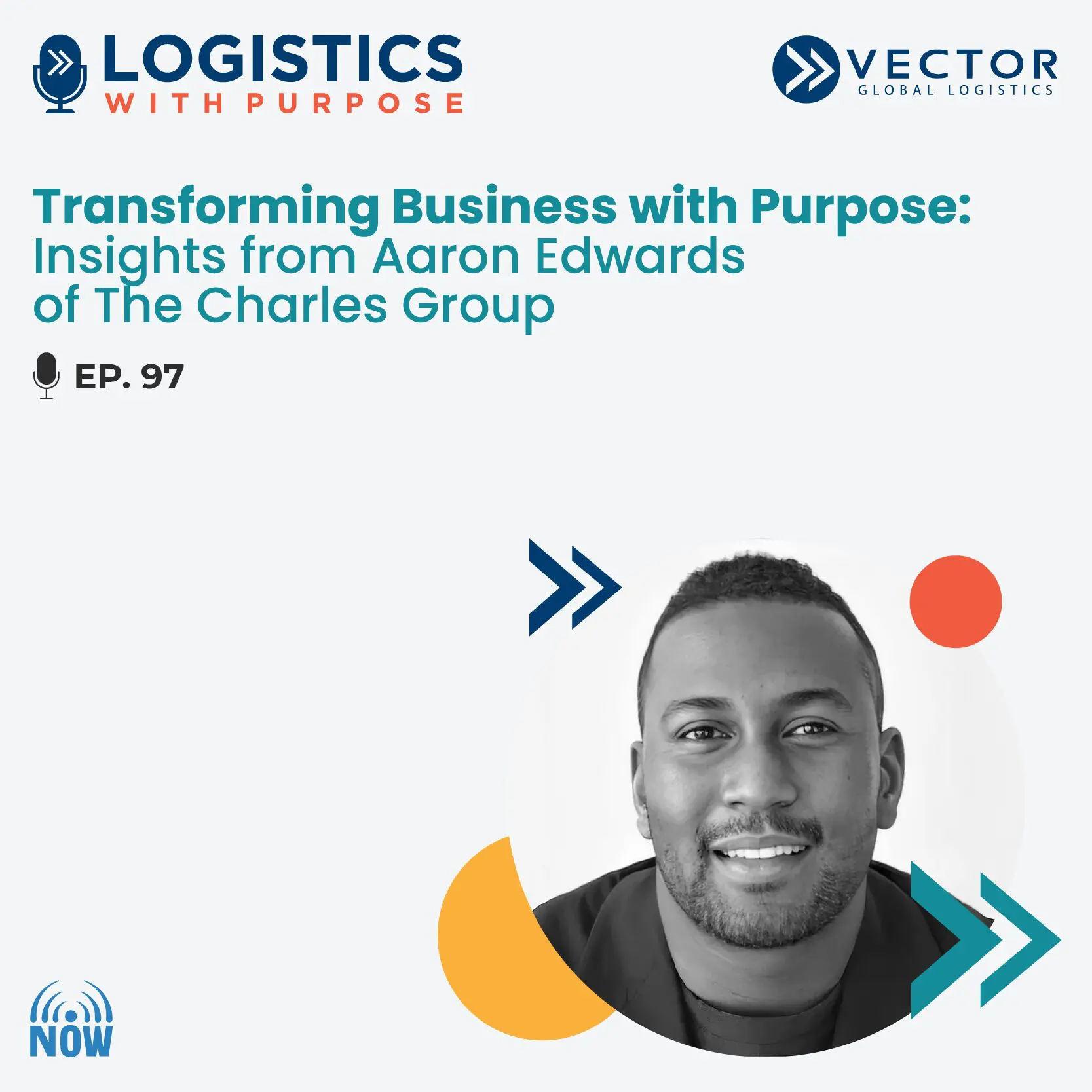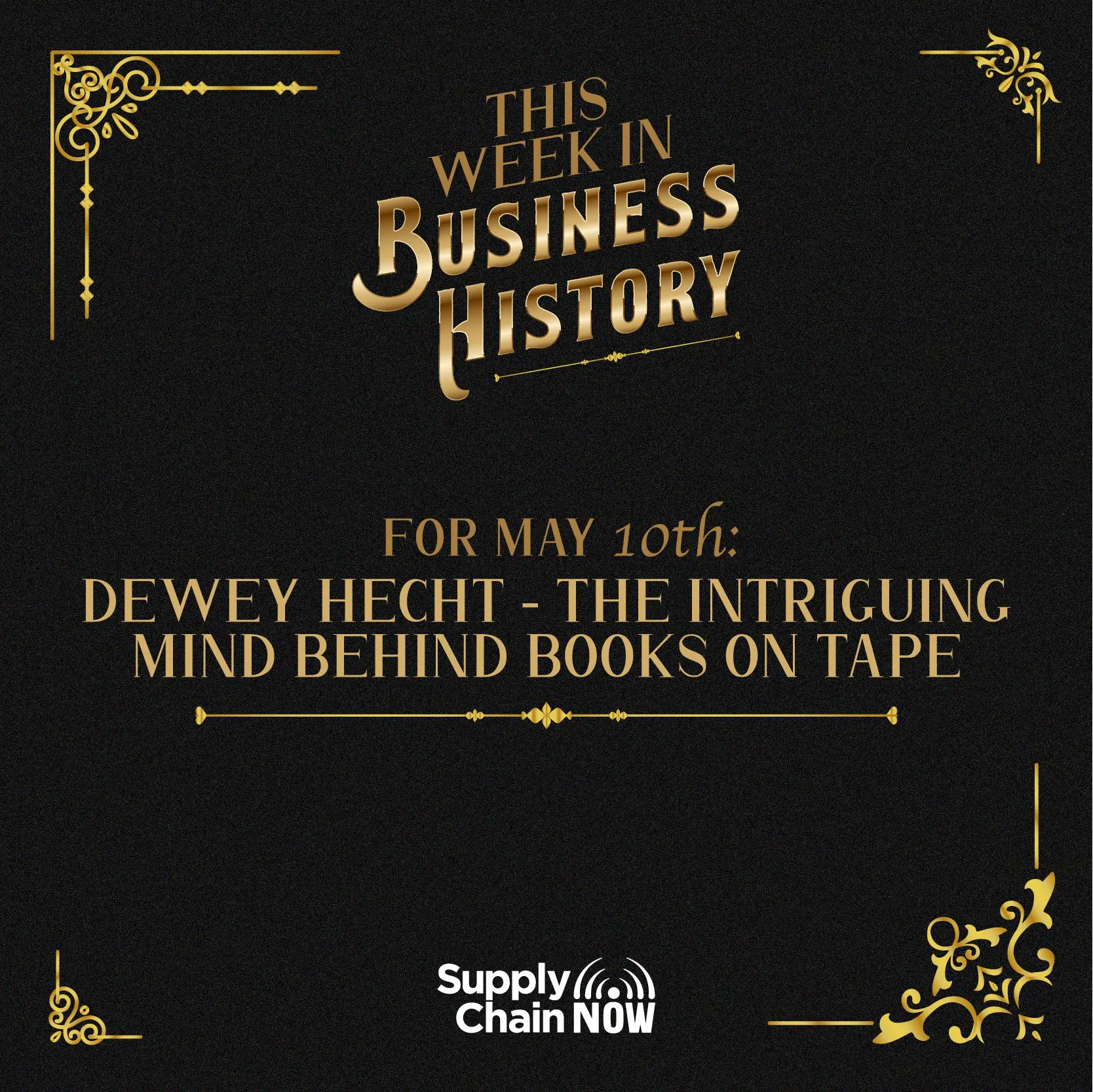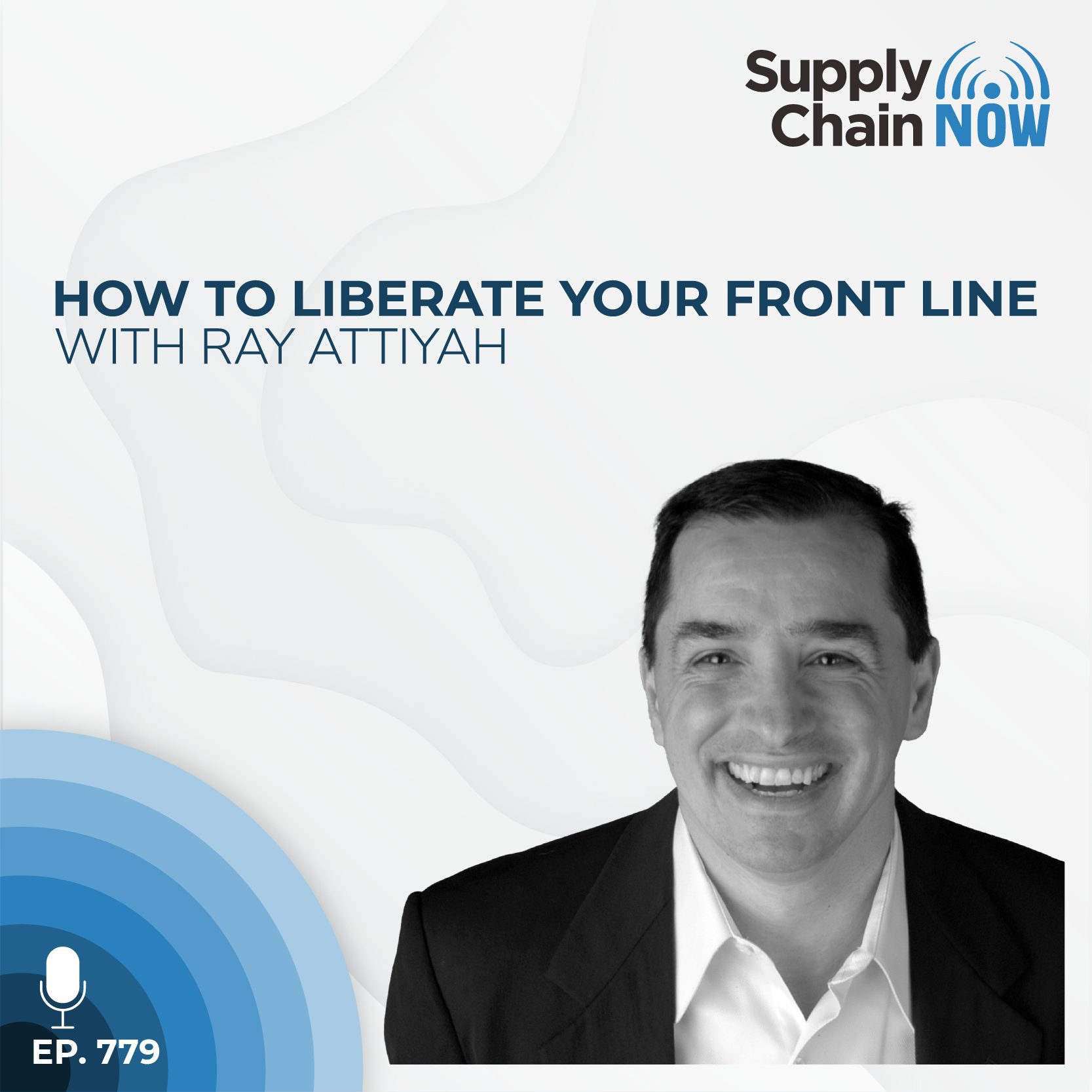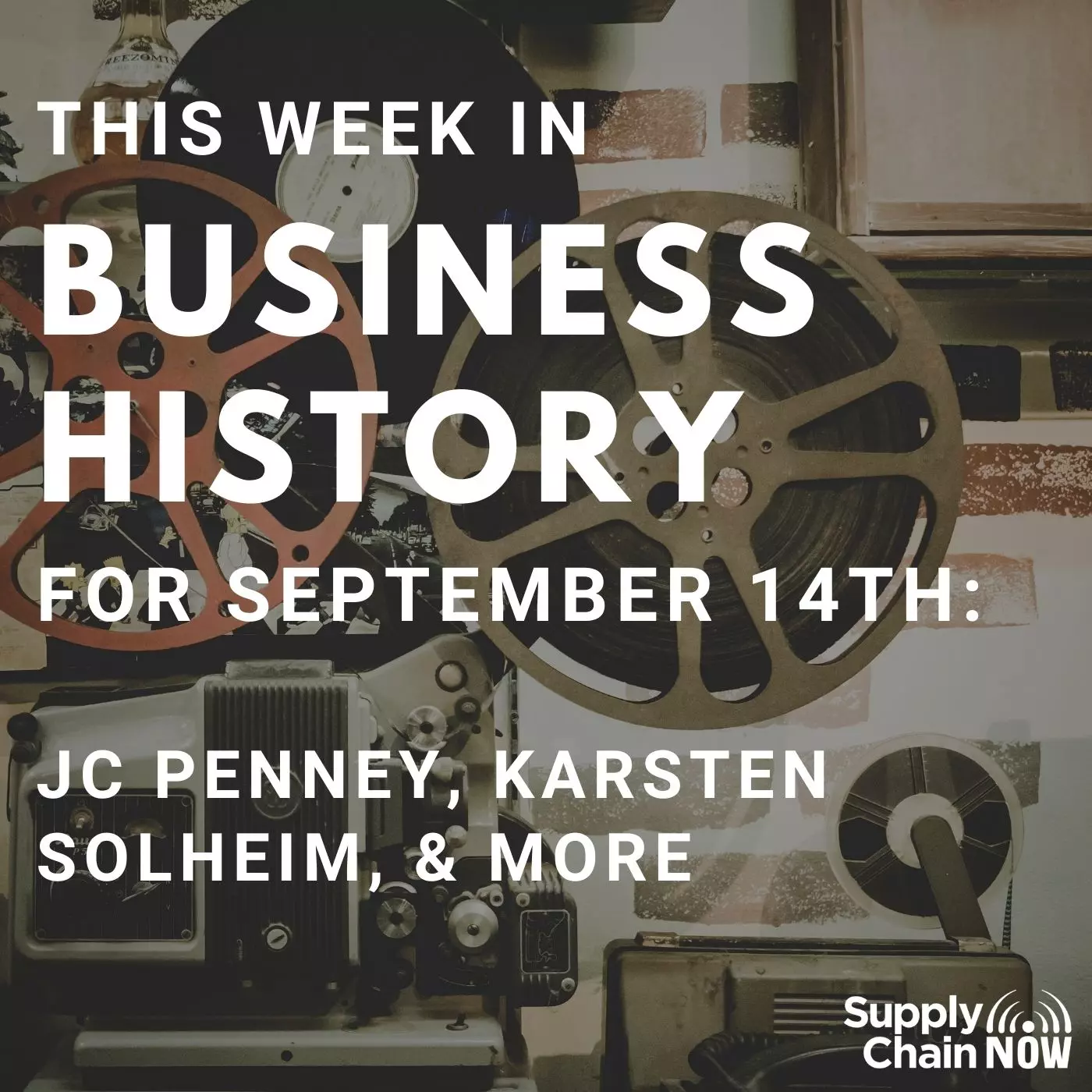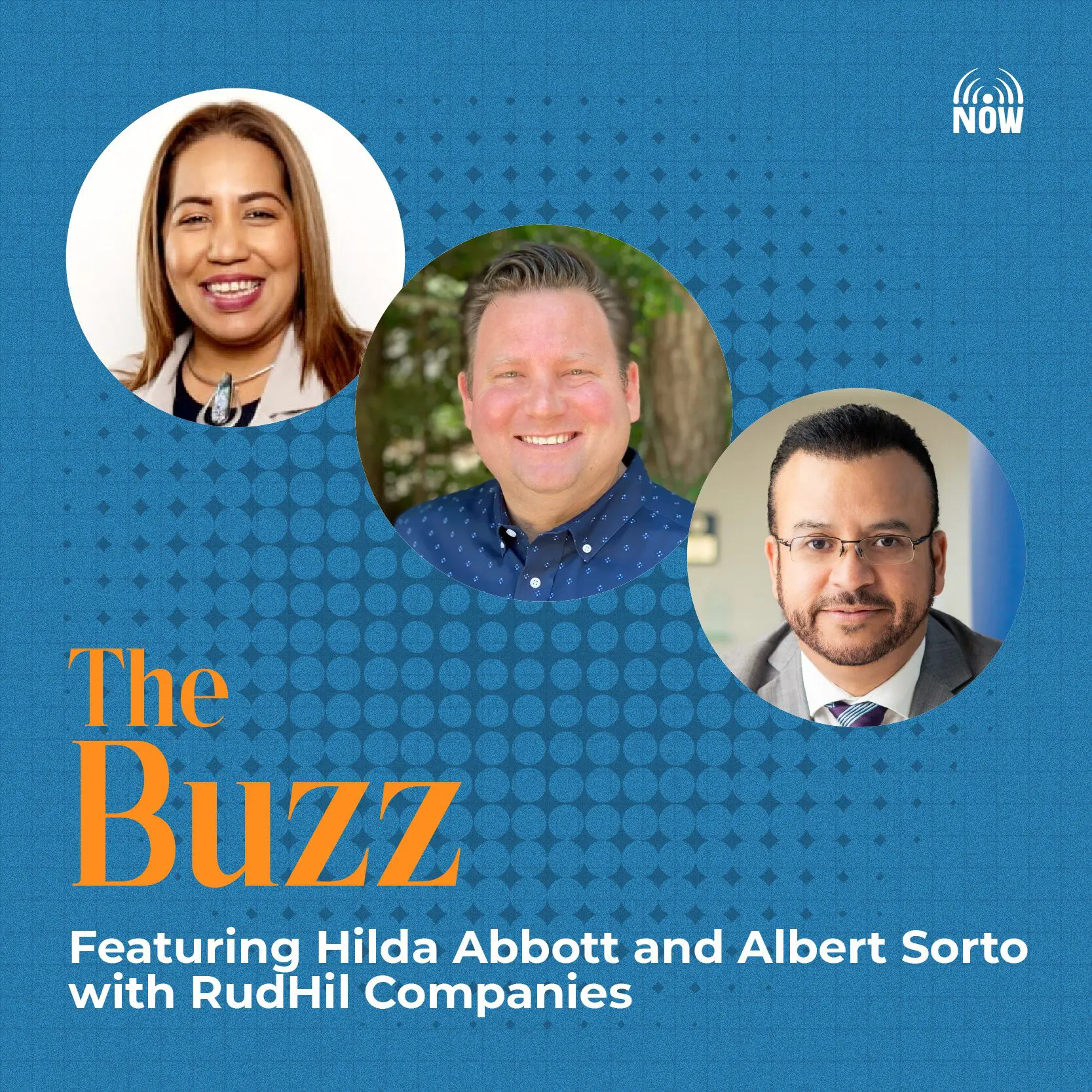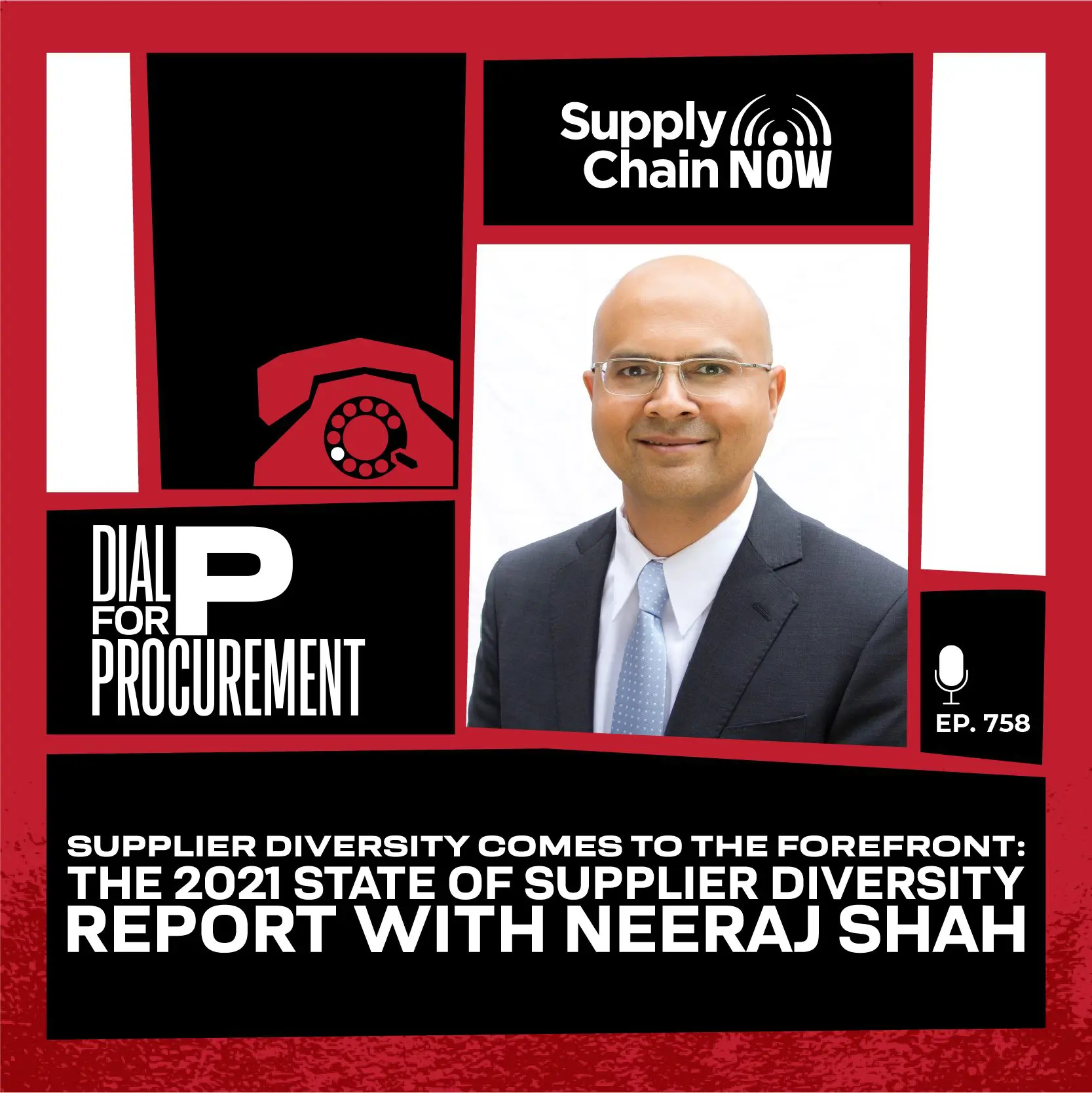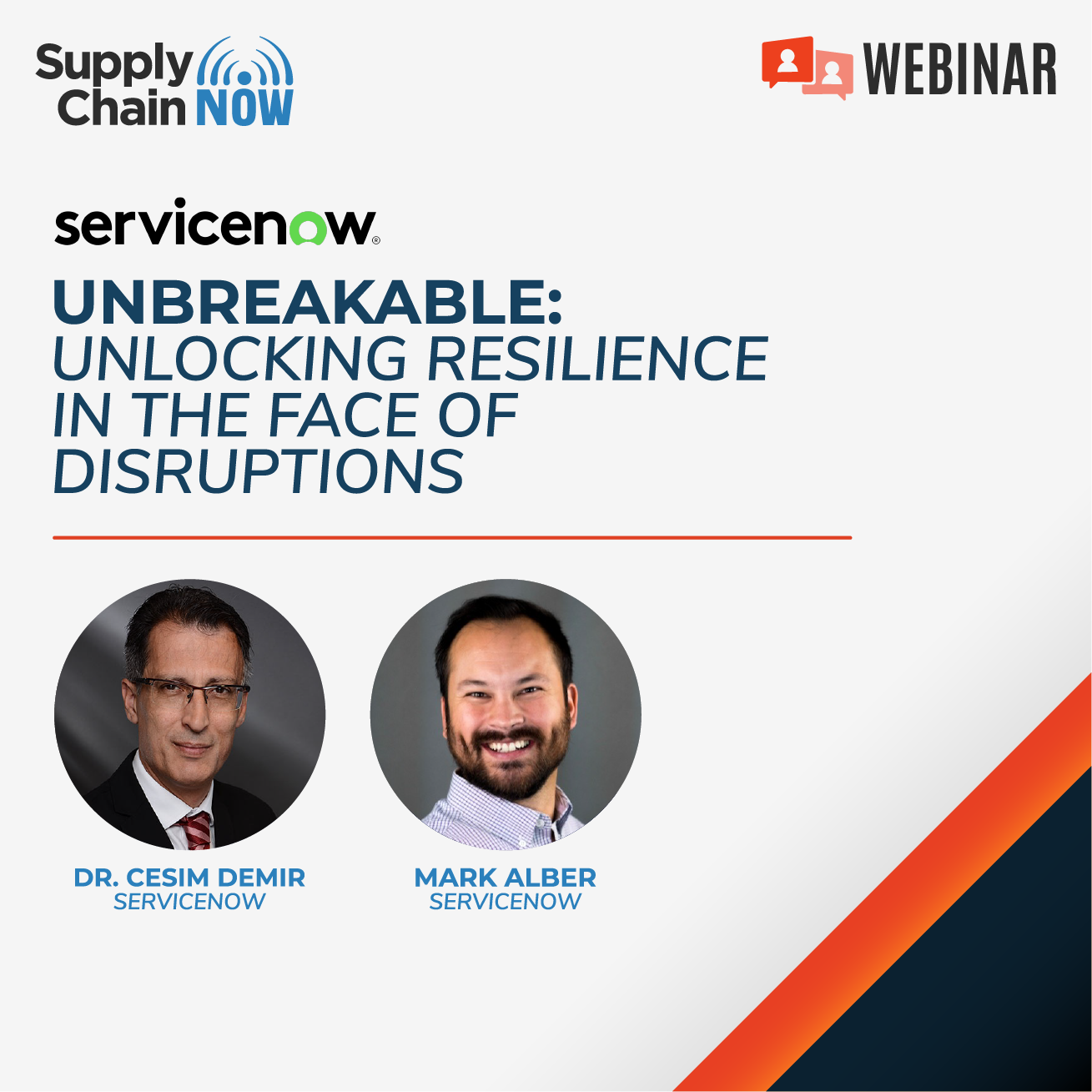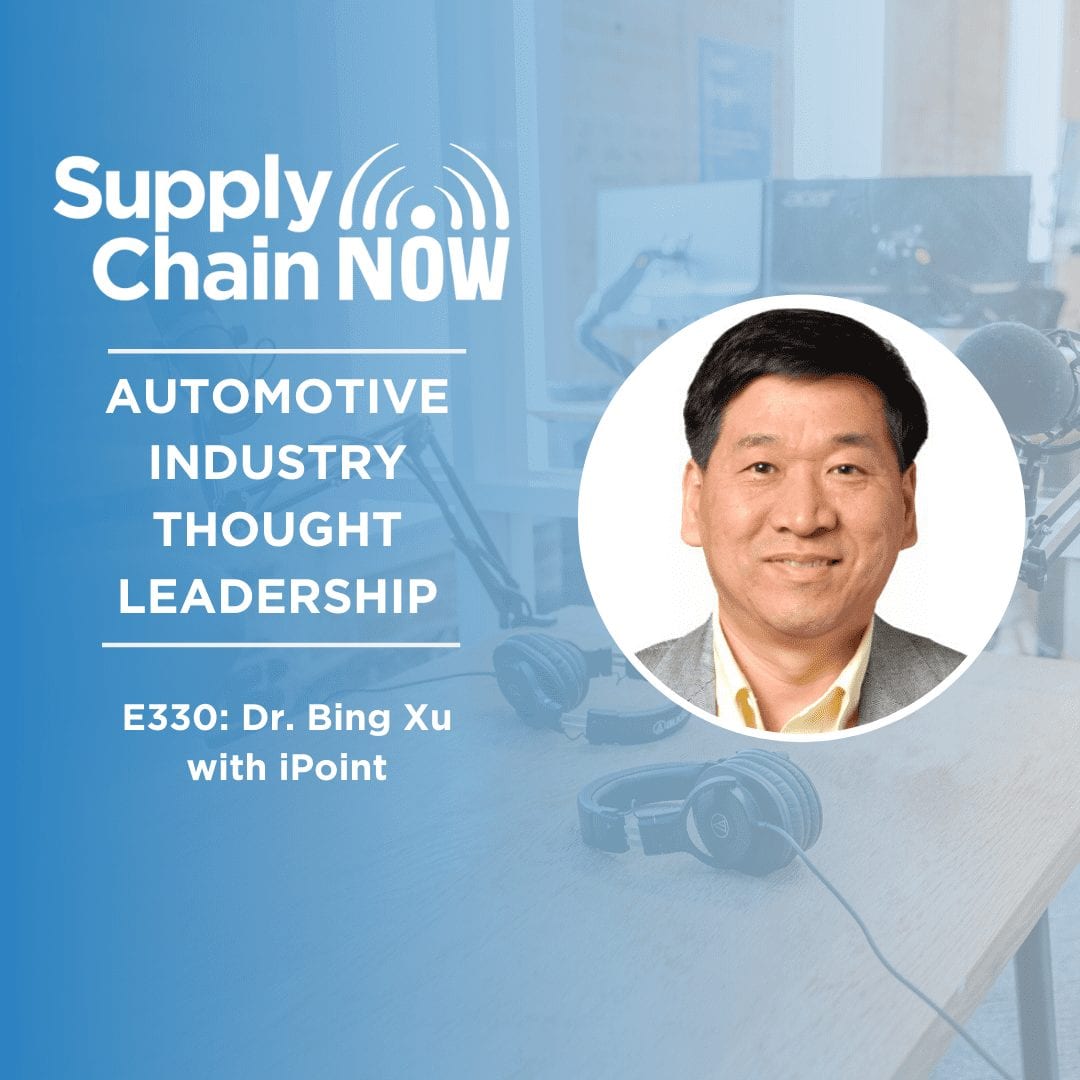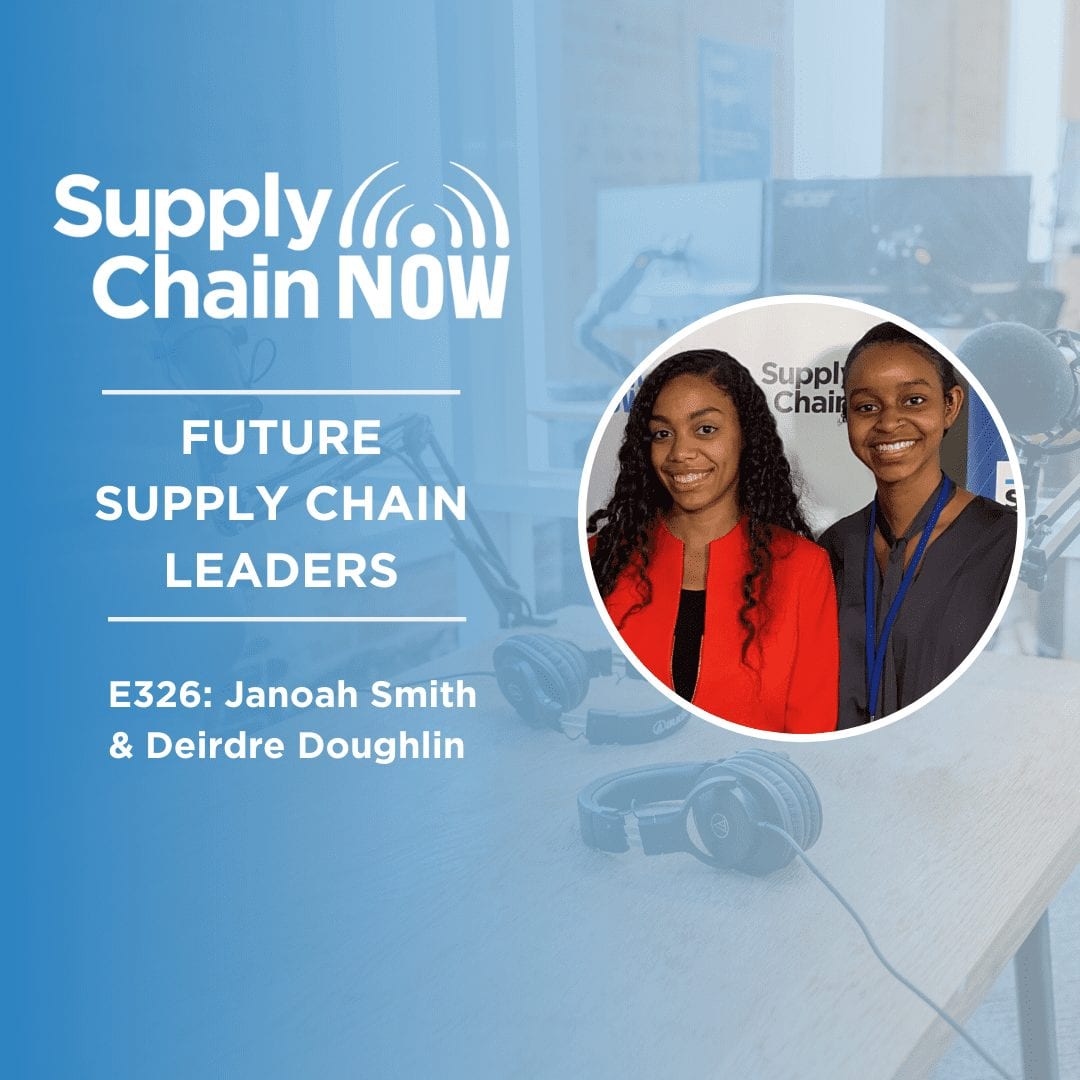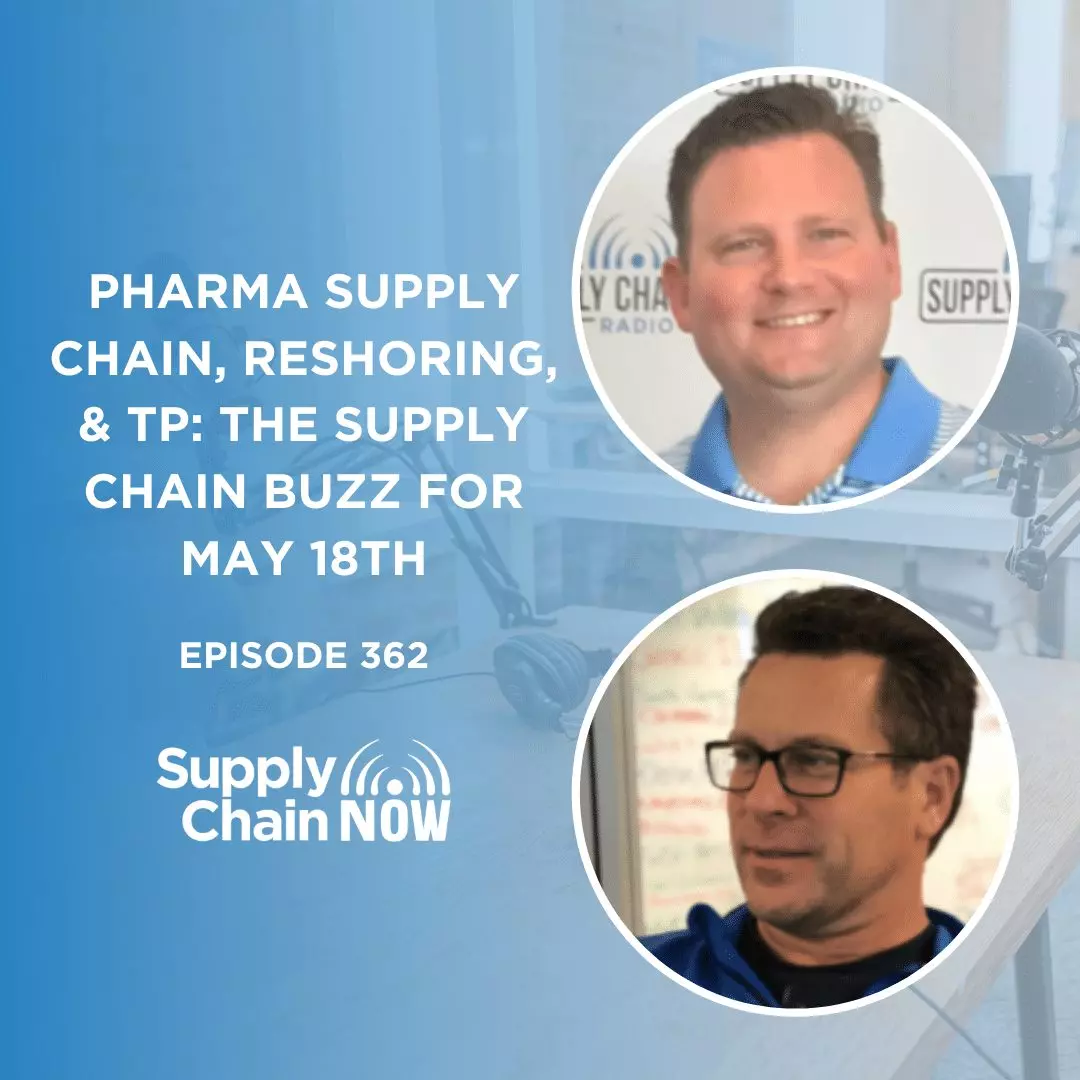[00:00:05] It’s time for Supply Chain Now Radio Broadcasting live Supply chain capital of the country. Atlanta, Georgia. Supply Chain Now Radio spotlights the best in all things supply chain the people, the technology, the best practices and the critical issues of the day. And now here are your hosts.
[00:00:29] All right. Good morning, Scott Luton with here with you here, Lauvergne Supply chain. Now welcome back to the show. Now in this episode, we’re continuing ah today a manufacturing series in conjunction once again with the Georgia manufacturing alliance. And today we’re talking manufacturing or we’re talking innovation and manufacturer and really the greater industry with a manufacturing leader that’s been there and done that two leaders have been there and done that, excited about the some the practical insights, observations that they’ll be sharing. You’ll certainly have the opportunity to raise your leadership IQ in some really big news to kick things off in 2020. We’re excited about a lot of the partnerships that we have continued into the new year, kicked off into the new year. But this series here today is brought to you by HDB GROSS collins’, a top 25 Atlanta CPA firm specializing in manufacturing, distribution and supply chain operations. It’s always neat to partner with industry leaders. This has been a series of that that’s been a personal passion of Jason Moss, the CEO of Georgia manufacturing alliance and I. And it’s great to, you know, keep delivering what we’ve hopeful, hopefully think will be informational content, expertise and best practices in partnership with a great group like H-B, Chris Collins, who who does a ton of work in in the manufacturing industry. And of course, they understand the specific needs that the manufacturers face. So one last quick programing note before we welcome our guests, like all of our series on Supply Chain Now Radio, you can find our replays on a variety of channels Apple podcast, SoundCloud, YouTube, wherever else you podcast from. As always, we’d love to have you subscribe so you don’t miss anything. Okay. So let’s welcome in first my fearless co-host here today, Laura Manager, Lewski Principal and leader of the manufacturing, distribution and Supply chain practice at none other than B GROSS Collins. Laura. Good morning.
[00:02:29] Good morning, Scott. How are you doing today?
[00:02:31] Well, fantastic. Sit around. Great, great partners, great thought leaders. I’m really excited about continuing the series and for this to be the first today, manufacturing kind of the kickoff show for 2020. Why not start with innovation, right?
[00:02:45] Absolutely. Absolutely. I think that’s on the tip of the tongue of everybody.
[00:02:49] I won’t give away anything that we’re going to talk about later in the show.
[00:02:53] Not going to steal someone else’s thunder here, but super excited to be here today. Thank you so much.
[00:02:57] You bet. Appreciate your continued collaboration partner partnerships. On that note, let’s go ahead and unravel or unveil. I’ll try to think of the right the right verb to unveil. Our featured guest, Aaron Meridith, innovation director at the Point, a center for Supply chain Innovation, which is a Georgia-Pacific company. Good morning, Aaron. Good morning, Scott. Good morning, Laura. Great to have you. You know, the last time we last connected, you served on a panel at a G-mail event, the Georgia Manufactory Summit, which has gotten bigger and bigger and bigger. LA, I know you’ve sat on some of those panels and you attend regularly beinvolved GMH, but you and you and and about three other business leaders kind of represent different sectors of the Indian supply chain I thought offered up some home-run very practical expertise and insights from what you’re seeing in industry. And today we get the same thing, but we have Mike Froome in front of you, one that works, right?
[00:03:57] Right. Yeah, I think we had a pass the pass the potato around.
[00:04:01] But, you know, Murphy’s Law, as we can attest firsthand, Murphy’s Law is always laden. Well. So great to have you back. I really enjoyed that panel session and looking forward to today’s conversation. So, Laura, we’re gonna dove right in. So right as we talked about prior to the show, what we like to do first before we talk shop and industry and in best practices and get into business too much. We won’t give a sense of who air Meredith is to our audience. I’ve had the we’ve had the good fortune of kind of get to know already and we want to afford our audience the same opportunities. So before talk shop, tell us about yourself. Who are you, Aaron, where you grew up with some early hobbies, you’ll give us a sense of who you are.
[00:04:42] Yeah, yeah, sure. I’m a native Kentuckian born in Glasgow, Kentucky. Okay. And, you know, made my way out of the state eventually. Right.
[00:04:52] You’re born with an international flair in Glasgow, right? Yeah, I know.
[00:04:55] You know, with the Scottie’s where the mascot for the for the town’s band and. A high school band wear kilts and Peli bagpipes the whole nine yards. I love it. It’s practically like being in Scotland.
[00:05:10] So what took you so growing up? What would you love doing it if you look back? What? Anything that kind of gave you a kind of foreshadowing for what you’re doing now?
[00:05:18] Not so much. When I was growing up, I guess, you know, I was like any other kid playing baseball a lot, played in the marching band in high school and things like this. Which instrument? Trumpet. I played a few others as well, but that was my main, main instrument. Play a little bit of French horn, a little bit of drums. You still play? Busted out the other day, showed it to my son and he’s like, here, show me how to play.
[00:05:40] And it’s like horrible. It was Moorabool doesn’t know when it’s back into the practice and you’ll be like a few years of practice. I think I’ll be alright.
[00:05:51] Well, so what took you out of the state of Kentucky? What what what was your first experience kind of leaving home state?
[00:05:59] Well, it was for college. I went to school at North Carolina State in Raleigh. And the Wolfpack with the Wolfpack. That’s right. You know, my plan was to go to UK and University Kentucky and study engineering. And I was recruited. We had a paper mill, West Baco had a pulp and paper mill outside of town. Of came recruiting people at high school and said, hey, got a great program at NC State. You can go get two degrees. Chemical engineering, pulp and paper, science work summers in the mill, make money to pay for school, get a scholarship like that. All sounds pretty good. So let’s give that a try. And so that’s what I did. I went to school at NC State. I worked five summers at a pulp and paper mill. You know, when I was home and, you know, I was kind of locked into the to the paper industry, I suppose. Right.
[00:06:48] Easy to do down here, especially the southeast. Right? Yeah. Got plants and managed forest everywhere. Right.
[00:06:55] Right. Right. I had no connection to it prior to that. And it was just really out of the blue. So. Yeah.
[00:07:01] Well then what came next? Because I know you spent some time in Europe. Tell us more.
[00:07:06] Yes. I mean I got out of college, went to work for Mead. This is while Meade was still an independent company, not merged with West Baco, not merged with somebody else. And I went to work for a mill in Cotton, Alabama, south of Columbus, Georgia. And I was like, hey, man, I like the mill life and the work my way up. Be a mill manager. You know, I enjoy being in the in the in the mills, out in the country, all these things that lasted about nine months, that career.
[00:07:34] Right. And then I moved to a different and Drogo, that moved.
[00:07:37] I walked across the street. And you’re from your offices here with Mead. And they had packaging and box plant business. And I worked in those areas for Mead for also years here in Atlanta.
[00:07:47] And the paint a picture for our audience. We’re kind of in west Atlanta. I’d call it west, midtown, west, midtown. But a way of putting it. Yeah. So when Aaron showed up here at the studio that first we talked about how he was right across the street, we should’ve done this years ago, Aaron.
[00:08:02] Yeah, well, it’s a lot nicer now than it was then.
[00:08:08] Well, so what was Saturday at nine months kind of eureka moment? Okay. This isn’t as much as I love it and probably love the people and the scenery. Yeah, well, it’s all different.
[00:08:18] You know, I came here with Mead and got into a role where I was traveling around to various operations, quickly got thrown into the fire. I’m twenty four year old kid. Right. And I found myself walking hand-in-hand with a consultant going around, setting up maintenance. Best practices and box plants are rolling up maintenance, I.T. systems, something that is totally way off the track of what I thought I would be doing right and expose me to a whole new world and new career path, which after a couple of years here, I ended up going to Georgia-Pacific and doing something very similar with the much larger company and a lot more operations. So that’s how I made that transition to GPE and and got into well beyond just a pulp and paper mill, right?
[00:09:01] Absolutely. From tiny to. My goodness. Yeah. Yes, exactly.
[00:09:07] Fortune 500 company. Yeah. So now how long have you been at Georgia-Pacific?
[00:09:11] So I joined GPE in 99. And, you know, I worked in their packaging division. They had about 50 plus box plants at one point when I was there. And so I spent a lot of time working with law, all kinds of box plants on process improvement initiatives, a lot around rely milte reliability, best practices got pulled into. This is a theme of my career. I never know where I’m going about six months outright, so I get pulled into managing all their maintenance management I.T. systems for them for the packaging division D.
[00:09:41] So on that note, I was having a conversation just last week about maintenance and it seems like it’s one of those functions that is getting more attention now. But for so long it’s been it’s been overlooked from a leadership standpoint. Do you agree with that? Disagree with that? And has it evolved?
[00:10:00] Well, absolutely, I mean, it’s always been. It’s been a necessary evil. People have considered it right. It’s a cost. It’s taken time away from production. Right. And there’s never a good time to take machine down. Right. And these are the types of challenges that we’ve always dealt with in the industry. But, you know, I think today there’s a you know, there’s a lot of factors that lead to it being more of a strategic priority just from a cost reliability standpoint. But even from a we’ve got all kinds of tools to better predict when things are going to happen down and are more accessible, more affordable than they were years back so that we can actually, you know, be much more effective at execute strategies in that area. And that was not true 20, 25 years ago.
[00:10:44] So it was still a thunder from innovation things. But on the other day industry, there was a great article on Industry Week. And one one of the predictions was that by the end of 2020, there will be more machine customers for 5G than human customers. And yeah, I believe voting machines on plant floors was one of the drivers. Absolutely. Speaking of maintenance and preventive maintenance, right?
[00:11:08] Absolutely. And that’s that’s a huge thing that’s happening very quickly. Right. And I absolutely believe that to be true, that you’ll have way more machine customers than absolutely individual customers.
[00:11:19] And I’m curious, Aaron. You know, I think I’ve seen from a trending standpoint as well, too, that’s part of that process has been an invigorating the younger generation. Yeah. Because they’re coming in and they’ve got some really great ideas they’re bringing to the table that, you know, businesses are just they again, they haven’t been able to pinpoint how to make that happen. So. And it’s exciting. Yeah, exciting.
[00:11:42] It’s actually cool work now. I mean, you know, versus I’m going to go move into the middle of nowhere and work in a mill and walk around your roots and things like that. I can sit here in midtown Atlanta and I can take way more data and do much more advanced analytics and make much better decisions that have a much bigger impact than any of those historical roles. And that’s that’s just very different. Yes, absolutely.
[00:12:08] Absolutely. So someone threw a curveball at you? Oh, we were going to talk about point a kind of after the innovation trends. But but let’s let’s move that up, because I want ask about where you spend your time now, 21 years later. Yeah. And what point a is and what your role is. And then we’ll dove into the innovation trends. Let’s talk about point a first.
[00:12:28] Yeah. So Point A is a I mean our mission is is to transform the Industrial supply chain into a digital supply chain. That’s that’s our mission. And everybody wants to do it, right? Mm hmm. And you know, when you look at that, so. So we’re a membership based entity. So we’re Georgia-Pacific Company. But we operate in a membership model where members pay to join our innovation center and Sheer and we drive multi-party supply chain innovation on common problems that everybody has access to, to the resources and thought leadership and the conversations and the that’s the the very unique networking.
[00:13:07] Yeah. Networking is a term is thrown around a lot long times. But that’s that’s some of the value prop for folks who don’t point a lot.
[00:13:13] Absolutely. It’s bringing bring together the right mix of capabilities that can be complementary to each other, you know, to go work on these things together. Right. So part of what we do is is foster that ecosystem, you know, bring in the right companies, the right capabilities, the right kinds of programs to get people to interact, knowledge, Sheer, things like that. And the other thing we do is, is find out what the big strategic problems are that some of our companies have and then facilitate processes within our membership to find innovative solutions. Right. And sometimes you find, oh, you’ve got this need here some he’s got this tool here and it’s a new one. This is a great connection. It won’t go off and run. Other times we have to bring people together. We find that really we need these three companies to bring parts of what they do together into something different. And that’s a solution. And we’ve actually got a pilot up and running that we we did an innovation process starting last February, about a year ago. And we’ve got our first pilot up and running today. They had three different providers come to the table. So, you know, real easy problems. Yes. Problems, no easy problems right now.
[00:14:21] Is there any specific parameters around membership that, you know, if somebody is interested in joining, they should be aware of four point A?
[00:14:29] Yes. I mean, we’ve got tiered membership. So we’ve got charter members that can join at a at a, you know, a higher membership level and have a seat on our board, our executive board. And they really advise on the strategic direction of what we’re doing, how we’re doing it, what we should be focusing on. And then most of our members will be corporate members that pay a normal membership fee and can participate and have access to everything going on in point A. And we also look at, you know. Bringing in startups right and starts can be at different phases. You know, they might be in seed round series B, you know, somewhere on this journey and particularly in startups, we try to look at where do we have capability gaps and you know, we’ve got a need here and there’s new technology emerging and somebody has something here that fits. Let’s recruit them in and pull them into a use case. Right. And go demonstrate. So we’ve we’ve done all these things. And even beyond that, we’ve recruited our first nonprofit in state care, which is based here in Atlanta, a nonprofit organization. They do work globally around health care and managing refugee camps and all kinds of things.
[00:15:39] Right. It sounds obvious, but C.A.R. E, there’s other groups out there was C.A.R.E. That’s correct. And it’s based here in Atlanta. Based here in Atlanta. Well, operations, right.
[00:15:47] And so we’re working on a use case for them right now. They just join and we’re gonna we’re going to do some workshopping with them along with Emory University. In fact, the little known universe.
[00:15:56] Yeah. College here in Atlanta.
[00:15:59] And, you know, try to solve a big problem they have on some health care supplies into an area of Africa. Right. Sciarrotta. We’re gonna do some solution around that. So that’s very exciting. Then I think a lot of our members will get really excited about, hey, this is something that we can take our knowledge and expertise and apply to something really meaningful there as well.
[00:16:15] Love it. You know, we don’t talk enough about health care. Supply chain here. 20:20 we’re gonna be changing that because of some of the last at least at least a Supply chain Awards program last March. One of our recipients was the Global Institute for Health and their trachoma. Trachoma. And this initiative I come on, I’m I get it wrong. But but the gist of it is getting needed supplies and medicine and to rural areas using different techniques know attention that that last mile is a lot more challenging there than. Sure. You know, coast-to-coast here in the States. And it just doesn’t get enough visibility. And that’s just one application, something you’re talking well.
[00:16:59] And then you’ve got, you know, medicines and different types of things that have to be condition controlled and in a very short shelf life, you know, so there’s all kinds of challenges. Health, healthcare, supply chain. Right.
[00:17:09] Good point. Yeah. And where do you spend your time with point eight? Where do you.
[00:17:14] So I spent a lot of my time with my account. So so me and some counterparts, we kind of divvy up our membership in terms of especially the we called problem generators.
[00:17:24] Right. So who are the companies that are causing all the problems or at least a nice way to it or at least have the problems.
[00:17:31] Right. And then we have our solution providers that often are more solution based and sometimes those are the same like Microsoft is a member. Well, their solution Ryder. But they also have a huge supply chain. Good example, right? So they’re both. So we spent a lot of time I spent a lot of my time trying to understand what our members problems are and what are the big strategic problems, the things that you’ve got to solve. You just can’t find a viable solution for him or that technology is evolving so fast you just don’t know how to think about what what you should do with that. Right. And then furthermore, among our membership, who’s got the same problems? Where where do we see commonality among among our membership and how we prioritize those types of things to bring forward to work on, say, hey, this is something really Porton her membership. It’s got global applicable applicability and supply chain beyond just these members. But here’s a place where we can bring people together and experiment on that, deliver an MVP or a pilot project to demonstrate a capability and then see where that leads. Right. And so that could lead to a new solution that gets marketed by one of our members or or, you know, it could lead to a new company. We’ll see where it goes. We’re only, you know, a year and a half old. So, yeah, we’re we’re still early on, but a ton of progress already done progress. We got 37 members now. You know, this time last year, we’re probably upper teens.
[00:18:47] Yet when he launches new facility with Greg White, not toward it, along with a bigger group a couple months back. I love at the center. You’ve got that stadium aspect to it. I mean, it’s going to be right in the heart of Atlanta. Yes. With some of your, you know, Fortune 500 to some of your startups, all points in between. It’s really you know, we throw around Innovation Center a lot in today’s era. And, hey, at least innovation gets more attention even if it’s not even it’s lip service. In other conversations. But I think the always unique approach has got. Well, clearly, you’re getting a ton of traction already. It’s kind of proven itself out. And once you get into this new center, right, you have more resources and more being able to facilitate the conversations you’re describing.
[00:19:34] It’s absolutely worth it. It’s going to a place people going to want to come to work. Right at forty thousand square feet downtown of GPE center, lobby level to levels, state of the art facilities, space for workshopping conferences, events, meetings. We have working spaces. So places for our members to sit and work every day. Yep. If they choose to or not work on projects together. So we really want you know, maybe we’ll have some you guys say.
[00:19:58] Right. Right. Tower deck. Yeah.
[00:20:02] All right, so let’s shift gears from kind of point a some of things you’re doing there. And for that matter, what’s right around the corner to know what are you seeing? What what did twenty nineteen and early 2020 and what key innovation, trends or takeaways have you seen manufacturing wise or greater industry wise.
[00:20:22] Yeah. You know, I think a lot of it. You know something that’s very different today than it was a few years back as the data’s basically free. So there was a constraint for most of our careers on data storage and how you could use data, what you could do with it. You know, that’s all changed. Data is basically free now.
[00:20:42] So it’s storage is free. So I can get my T-shirt, free the data and I can I can do that. But all of the data has been freed.
[00:20:50] And so that that causes huge paradigm shifts and a lot of front. Right. So not only is data storage practically free now. Now we have such advancements in sensors and wireless communication technologies. Right. That make the gathering of data much more accessible, much more affordable than ever was before. So I don’t have to run hard wires and some sort of big probe here. Here’s like I can I can grab a vibration sensor with a magnet on it and throw it on a motor, walk away and monitor it, you know, from two thousand miles away or have a right Miura on the royal if I choose to. Couldn’t do that few years ago. So, you know, so data’s practically free. The way to gather the data is is accessible and affordable. And then the analytical tools that you can use on that data are becoming much more accessible and affordable and anybody can do it from their laptop. Right. So all these things have changed the paradigm of what do you how do you how should you run manufacturing? All right. Yeah, it’s different, you know, and it’s not. Of course, there’s automation. People doing automation. There’s robotics. There’s process automation, material handling automation. That’s a piece of it. But I think the big challenge that people are going to deal with is in our dealing with this. How do I take all this new technology, new all these great things and actually change the way we do our work? Yeah, that’s that’s the big that that’s the. And that’s not a technology solution to technology enabled problem like that enabled old problem that we need to solve. But but that’s the big challenge I think most manufacturers have today is how to leverage all. I know I can do all these great things with technology, but to really get the value out of I’ve got to change the way of I work absolutely well.
[00:22:44] And I think to, you know, as MIT, as much as we’ve heard of all of these innovations in this technology, there are still so many manufacturers out there that are stuck with old systems, old things. They’ve got great ideas. But, you know, they get they get sticker shock. Yeah. In all of these things, I want to do this all. And then when you look at the price tag, it’s holy cow. But I think with the opportunities that are available now, just this is the kind of financial side of me talking for incentives and credits and things that are available to take that cash, put it out, reap those benefits back from a multitude of angles. It’s more about than all of us that know it. How do we continue to touch them? Yeah, think and get that message across because they look out there and they see 79 different types of, you know, resources. How do we help to steer them?
[00:23:36] Right. Right. You know, that sticker is coming way down the end and the menu of options to go address X, Y and Z have grown exponentially. But that’s a challenge in of itself is OK if I’m a farm, a small independent business or, you know, and I got a gazillion things going on around me and I’ve got this much bandwidth. What do I do with that? I mean, how how do I. How do I even know what’s available? You know, know what’s available out there. Know where to start. And that’s something that, you know, we get excited about. Point A of, well, show up. Just show up here. Yeah. We’re we’re bringing these few folks and you’re going to learn more. You know, we did a one day workshop in Chicago back in December, right. Where we had all of our members come. We had everybody there do like a three minute pitch. What they do had some Q&A time. We quizzed them afterwards with prizes. And then we just we use case showcases and things. But I mean, the value creation just in about four to five hours, there was was tremendous for everybody involved because they walked away knowing a lot more than they knew coming in. And I think those types of services, events or what have you can can plug people in quickly and get a practical facilitation.
[00:24:49] Yeah. And by extension, what we wrote home earlier is practical application. You know, the practical application technology gets lost to shuffle time and time again because we all as humans and as leaders, we want off. Thompson What is the thing that you have to have right now? Right. Keep up with the Joneses and from an industry standpoint. But two quick things I want to make sure we get out there is the first point is, as you mentioned, Laura, are not just here in Atlanta, but coast-to-coast. There are a variety of tax credits many manufacturers aren’t aware of that can help recoup some of the benefit from some of the innervate the cost of innovation. Right. Yeah. And the training. Cost associated right now is already tax credits. The workforce the up his opportunity credit.
[00:25:37] What I see is what it’s called coast to coast, right? It is. It is. And then, you know, I think a lot of times people will tend to focus on this coast-to-coast federal side, but then you also have to work with your accountants, your providers. There are many opportunities at the state level here at the state. When you go back out, say, to the economic development site, you’ve got things like, you know, the port credits in there. Some of these things you can’t necessarily layer them altogether would be great to put it all there. So, you know, working on the strategy again of what’s best practices, but yet still things like R&D. You know, they think, oh, I’ve got to have, you know, a laboratory in order to take advantage of that. No, you don’t.
[00:26:16] This is a very liberal use abroad.
[00:26:19] You said is. It is. Yeah. And when you’re implementing technologies and innovations like this, like you said, Aaron, then how are you going to get all your people to know how to do that? Right. That time and effort can be implemented and spent. And then you can have an offset. All right. Yeah.
[00:26:35] Well, another big change, too. I don’t have to set up a big server farm to integrate technology. Right. So ten years ago, I needed to have servers and you had big I.T. department to support all this stuff so I could run these big software programs, I think. And there are applications that that’s the right thing to do. Don’t get me wrong. Right. But there’s so much software as a service now. Yes. All I got to do is cut, cut this guy over here, a monthly subscription check. Yeah. And I marketisation. I’m getting so much value right here. You know, they are my department. I’m paying them for that right now. I’ve got another service over here that does this, another service over here that does that. And that’s that’s just a that’s a paradigm shift that I think we’re still trying to navigate our way through. Right. In a very natural world lately.
[00:27:17] And, you know, so kind of bring it home and we’ll move forward. Here is, you know, we’re not talking the opportunities to add to the bottom line from a text person perspective is not really related to. The subscriber that the democratized technology services that are out there. This for your your larger implementations for manufacturing plants that may be adding big machines or maybe technology platforms. Caryl, they’re still on premise stuff, right?
[00:27:50] Oh, yeah. Yeah. Well, and you know, that that the juxtaposition I see is that they’ve got this system that’s working great for them in production, but production can’t speak to the other side of the office. Right. And so. Yeah. So there’s this overwhelming sense. I know people that are still doing things by hand in this day and age, but it’s just because they I don’t you know, they haven’t been exposed to something like join a. Right. Sure.
[00:28:14] So I might have a point of view that, hey, I’ve got to go in to replace all this stuff. That’s boring. Yeah. Is it. It is like. Well, not really. You know, we can take X legacy system here and just take what you have and an aggregate that data with all this other stuff and make great decisions off that without having replaced twenty systems.
[00:28:30] So let’s talk. So any time we’re having conversations like this, this topic always comes up and I like to take it on head first because I think there’s a prevailing misconception out there. And that is when we innovate and we get better and oftentimes we automate because that’s the course of human history that the folks that that may that it’s just taking jobs. However, I think from what the conversations we’ve had and the companies that get it right are those that, yeah, if you only want to do the same thing you’ve done for 30 years, whether you’re for that matter, regardless of industry, you’ve got a great chance of being disrupted. However, if you if you apply yourself and you’re willing to learn new things, get your comfort zone, volunteer and then step through that door. Automation is gonna be opening a lot of doors. I mean, going back to maintenance. Yeah, we we toured through. We’re together, but we toured a fulfillment center. Well I guess as early twenty nineteen now and they implemented a several automated robot picking an automatic auto fulfillment, but they didn’t lose any maintenance folks. In fact they up trained upskilled the maintenance team. They end up having to pay more because they have new new robotic programing skill. Right. And so not only is it. So it improved. Right.
[00:29:57] The current team in place, I think you’re seeing a shift from, you know, eliminating the repetitive, sometimes dangerous. Right. Unfulfilling work with more fulfilling, more strategic thinking work. Right. And, you know, it’s hard to find somebody that wants to go do a job where they’re just going to do. I’m going to move this from here to here. May live every day. Nobody wants to do that.
[00:30:23] All industries are struggling with us as hourly work like that in many ways doing the same thing over and over again. So naturally.
[00:30:30] Businesses are going to find a way, and it’s not just technology drama into either, I mean, it’s just it is it is our our demographics, our culture, what people want to do. So you can say, hey, there’s a certain percentage of the available workforce that’s qualified to work in manufacturing, but there’s only a small percentage of that that wants to. That’s right. And but you can change that by making those jobs different. Yes. So it’s like. Okay, instead of hiring a process engineer to go work in rural Mississippi, you know, three states away from where you’re from or something like that. You went to Georgia Tech here and you like Atlanta. You can work here in midtown and do more than you could have done in that other job.
[00:31:09] Yes, it was really enjoy it with more technology and more things that appeal to a broader base. It’s a win win for. It is a win win. And we’ve got an awareness challenge in the manufacturing space. We’ve talked to a lot of shows with a lot of work to do there. But, you know, if you are a member of the manufacturing force listening to that, there is good news. Volunteer lean in. There are opportunities that automation will be bringing that would benefit all. So, okay, we could easily dove in.
[00:31:40] That could be a I was gears turning in my head, Scott. I was like, but what about this? How about this? That. I like we don’t have all day.
[00:31:50] We love it. This is love, love, this type of conversation. So before we do anything on air and then we talked a lot there, but from free data to an inexpensive gathering and analytical opportunities when it comes to data, of course, automation. Anything else come to mind when you look back at twenty nineteen or if you’re looking forward to 2020. Anything else going on?
[00:32:15] You know, I think we’ve had a few use cases pop at the point a. We’re in the compliance space. Right. So this is an area that all companies in Supply chain have to deal with compliance, whether it’s, you know, hazardous materials or a.D.A compliance. We’ve got things going on around carbon traceability, which could have a lot of global applications as well. So, you know, that’s that’s a really interesting area that I think it’s noncompetitive. You know, nobody’s going to say, well, hey, we’re going to do this thing to apply here. And these guys can just you know, nobody wants to do that. Right. And and so, you know, it’s those types of common things that we’re getting some good traction on as well. So that’s that’s been really interesting. And then, you know, really just visibility, you know, visibility enabled by all these tools we’re talking about. It’s like we can how can we rethink like Indian visibility all the way from here to my customer halfway around the world in the various warehouses and shipping methods, it goes, we’ve got all that data. How do we use it? Right. Right. And so there’s a lot of opportunity there. Inventory, inventory, embedded insurance areas got embedded insurance. How you got it? Your customers got it. Your suppliers got it. You know, there’s tons of opportunity to free up a lot of working capital up and down the supply chain by applying these tools as well.
[00:33:31] Absolutely. Yeah. Got to act like it’s 2020 and not like it’s 2000 to for, say, four subgroups a step Lu. Sometimes it’s tough to do. I mean, they were all afraid our computers are going to explode. The world was going to shut down. So 20 years later, here we are. All right.
[00:33:51] Well, so let’s shift gears for a second. I want to I want to Laura on ask you the same question, looking back at twenty nineteen. I know you’re in a lot of plants speaking with leaders, speaking with folks, you know, for folks on the floor to management, to leadership, all points in between. What has been a key takeaway or two for for you from 2013 from manufacturing standpoint?
[00:34:13] Well, you know, first of all I’m seeing leadership becoming more engaged. I think, you know, they’ve been sitting at this platform up here where they go, I’ve got all these people below me. They’re all work. And I think I’ve got everything organized. And and they’re realizing that there are a lot of ways for their expertise to continue to infiltrate all the way down to having, you know, one on one meetings with the the individual that may be out on the plant floor and doing that repetitive work. So they’re becoming more engaged and realizing the tools that are available, like the free data. I think they’re still working to figure out where to get that. You know, there’s so many things out there. So, you know, innovators that I think are service providers in a space like point A that kind of bring it all together. And those businesses, I think, are really starting to understand and take advantage of that. I think, too, there was a lot of diversification and in plants on the floor from a from like a product line perspective. So there were ideas and things. There were been a lot of acquisitions as it was growing. The acquisitions, we were seeing them out there. This is great stuff. You know, really energizing an excited. But. Now you’ve got this workforce that’s got so many different streams out there. How do we center that back? Know again, remember what the business was not saying that. Oh, well, like you said earlier, Scott, this is the core. Oh, my gosh. We can’t stray from the core. But how do we work around the core and integrate these things in properly so that we can see, you know, one, five, 10 years down the line, how we’re going to be able to benefit from the years and continue to expand the business from that perspective? Yeah. Yeah. So I feel a lot of lessons learned.
[00:36:04] A lot of innovation is dry. I mean, it forces you to rethink your vision and strategy. And you’ve got a you’ve got a you’ve got to reinvent that. And probably going to have to do it more often going forward because technology keeps on developing faster and shattering more paradigms. Right.
[00:36:17] So absolutely. Yeah, that is a lot of our legwork that we’ve been working on with our clients. And when I talk to potential business owners tend to, you know, kind of get a better understanding, because I’m always out there learning. I’m doing plant tours and things. Excellent ways to have that one on one touchpoint. And Ciara has three clones.
[00:36:36] By the way, how much of that is innovation right there? That’s right. Listen, that’s all I was working on for years behind the scenes.
[00:36:45] So I made it happen, but. Yeah. Yeah. Because my job is just I’m all about bringing the resources and the right value to the table. It’s so much more than, you know, what that commodity is that I think we tend to be generalized as in the accounting space. So and it because if you’re not doing that, then, you know, you were just doing yourself and your clients such a disservice. Yeah. So and that’s what gets me up in the morning is getting out there. The innovation, the connections, the relationships, I think relationship is can be huge. It’s always been huge. But kind of that buzz word there. And you know, I keep going. What’s next in 2020?
[00:37:23] Yeah. You know what we hear from a relationship standpoint and it kind of goes back to something you’re saying, Erin, is that there are so many companies that you would think that in the era of Google and in the era of all the digital connectivity we have, companies and leaders still struggle to find credible resources where they can establish relationship, especially a lot big picture, long term relationship that solves the problems that some these organizations are facing. It’s so crazy. You think in some cases when I hear some of the some of the folk, the types of expertise folks are looking for, they can’t find it. I’m like, gosh, so crazy. It’s like 1990. But then again, as an entrepreneur, I know there’s some things I know is out there and just carve the time out to do a dedicated, you know, Columbo three week search. Yeah. You know what? Who has time for that?
[00:38:12] There’s almost information overload. Right. So and that’s part of like well, I’ve got 100 people saying I should trust.
[00:38:20] I don’t know if that’s true or not. Well, how do I figure that out?
[00:38:23] Yeah. Yeah. To me, absolutely. It’s it’s the transparency side. You know, cut out the all the middle part stuff. I could use a few other more descriptive for its air, but I well you know, fought for that but. Yeah. Getting down to how can I trust what you’re telling me is the right thing and how can I. How can I find the other ones that are going to fit me. Beth Sheer in that circle.
[00:38:45] All right. So one, I want to pose this question to both y’all and then we will we hit a couple highlights for a GM, a typical tour audience. J. Small, CEO of GM May joins us. He is under the weather today. We wish him the best. He works. Speaking of having three or four clones, Vince Chase does. He has a lot of work support. He made his life work and support the manufacturing industry here in Georgia. So when you mentioned diversification, there was a lot of different places my brain initially went to just was it just last week, we had a great conversation with two manufacturing leaders that are volunteer leaders with the Association for Manufacturing Excellence. And they just happen to be females, right? Yeah. And they’re both one of the coolest things I always love doing is kind of hearing how folks kind of find the way into manufacturing. Right. And one was was you know, one didn’t grow up into the manufacturing. And so she has she had kind of some preconceived notions. And then she went on a tour, fell in love with.
[00:39:49] And now she’s been, you know, for four. She’s experienced in a variety of functional areas within manufacturing and loves it, loves the production, loves the, you know, kind of in the in the whole flow. And what if she had not had that epiphany? And then the other was she grew up she had several generations that were involved in the textile manufacturing, I think, awards. But she she was part of a program that funds minorities and and females and brings them into opportunities, especially from a. Township and co-op standpoint. And it kind of opened up her eyes in terms of all the possibilities with manufacturing careers. So great is just great conversation. So anyway, when we come when it comes to diversification and for that matter, innovation, how can we what what comes to mind? How can we really open up the pipeline and make it more attractive as an industry to dispel some the notion that are out there associated with manufacturing, what what comes to mind? What we need to do is leaders and organizations and whoever wants to go first.
[00:40:59] You want to go area.
[00:41:01] It’s going to be I think, you know, when you’re when you’re recruiting in a manufacturer now, you’re recruiting for something different than your recruiting for 20 years ago. Right. So, I mean, I think at a college level, for example, that’s probably easier. Right. But but if you have somebody that’s maybe mid-career looking at changing careers, it could be tougher. That’s right. I don’t know. I don’t know what the answer is there, but. But I do know that the, you know, is part world looks different now.
[00:41:28] Yes. Yeah. Your factory is part of the challenge reached the parents. We see a lot of studies from a variety of very credible organizations that a lot of the findings is. While the parents still think that a lot of parents still think that it’s it’s dangerous and dusty and dirty, it’s the same thing. And and, you know, that sounds kind of those are in plants. A lot of sounds kind of. Because I’ve been found before. That is not a fear being the boundary that is as tough a tough environment. However, so much. To your point. So much of manufacturing has changed. So how can we reached parents and make it make them more aware and all the technology that’s in the industry now? You know, competing for different talent, to your point. Right. Bar, what comes along?
[00:42:10] Well, you know, I think the biggest factor is there’s this message that comes through the schools from, you know, when they’re young and you talk about career day and your dad and your mom or there or whoever in your family. We have to start hitting them earlier. You know, there’s there’s more innovation in just the counties and the cities here in Georgia. And I know I’ve seen it on a global scale, the global perspective of The Apprentice Sheer and understanding that this is a very lucrative career because otherwise, yeah, it’s it’s a very much a focus on the professional services.
[00:42:45] Well, you’ve seen people of the interest is shifted to technology. People go into the technology fields. Well, manufacturing is a technology field. Hey. Yeah. The shout that maybe that should be the marketing slogan. Right? Is that OK? Going into manufacturing is the technology now because it’s not like it was.
[00:42:59] Yes. We need to circle temps. Are that. But yeah, that’s exactly it. Getting them. I mean, there are so many technical schools that are adding in advanced manufacturing programs. Going to tech is one of them that I know has been recently. And so we’re seeing that type of innovation and then getting individuals like us getting into the colleges and the high schools, more of the schools, you know, touching base with them. Those that you already work with in general to get your own pool of employees bringing that awareness there. So a lot of education. I think education is going to be continue to be the number one thing to peel the veil back, so to speak, and keep disrupting what what you’re doing.
[00:43:41] I mean, we can we get almost sounds kind of cliche, but we’ve had manufacturers that are truly employers, employers of choice that say it’s not a war for talent. If you really get creative and you don’t stick and cling to beliefs and things that used to work or were you were working kind of really think different. And we’re not talking. This wasn’t a manufacturer that that hires 50 people near this manufacturer that probably hires upwards of four or five of our folks. So they they’ve got a different challenge. We’re looking for one person versus 500. Try to keep the plant running. All right. So good stuff. Appreciate your weighing in on that. Let’s shift gears as we start to kind of one down here. So excited about some of the things coming up on the Georgia manufacturing alliance calendar. Two things in particular. And LA and I might throw you a curve or no. Do you happen to know what anniversary is coming up that the DMA celebrates?
[00:44:38] I do believe it’s the 13th anniversary.
[00:44:41] Class always evil. 12TH, 12th. Oh, I was see, I was so excited. I’m jumping ahead. Jason is gonna come and just me, you know. You’re giving him another year. I think. Gosh, you know. You know, it’s just I wasn’t backtracking enough in my head from the 10th that I knew we had. So UPS. I’m in trouble now at 12 years.
[00:45:01] Celebrate that. Twelve year anniversary Thursday, February 20th at Gwinnett Technical College. What you mentioned earlier, you know that the technical college system here in Georgia is such a tremendous advantage for workforce development and innovation and helping companies locate here economic expansion. And Gwinnett Tech is gonna be hosting that anniversary celebration and it’s open to the public. Georgia manufacturing alliance dot com for more information. And then the other thing. So. We’re talking at the summit earlier where there was one panel, and Laura, you know, I’ve been thousand times. The Georgia Manufacturing Summit takes place in September and we just had September 15th that the Cobb Galleria 6th Annual. What we ask you that because I might have gotten it wrong.
[00:45:47] I just know what I actually did know that I got the one question you don’t me.
[00:45:52] The sixth annual Georgia manufacturing site and the keynotes were just announced. And I’m cheating’s I’ve got my notes here.
[00:46:00] Have you heard to me that one of your heard the keynote you have? I have. OK. I know for sure. Yeah. So I don’t know. I don’t want to steal your thunder. I’m just going to let you go ahead with it.
[00:46:10] So it’s gonna have a big national security kind of theme here. So Lieutenant Colonel Waldo Waldman, world renowned keynote leadership coach, former F-16, actively piloted them in the best air force in the world. Never seen U.S. Air Force, as well as new a New York Times best selling author. He’s going to be one of the two keynotes. I’ve seen him in person to a Vetlanta event.
[00:46:33] Oh, yeah. Speaker. Yeah, he is. He is so dynamic. Yep.
[00:46:37] And then secondly, Martin and Cindy, Daniel C. CEO and CEO of Danish Defense, respectively, which is a tremendous Georgia manufacturing story. They their plant has grown from I think it started from his roots right in his garage, manufacturing firearms and has grown now. And two, they employ hundreds down there in spent area. Yes, you can see it from interstate. It’s a it’s a huge new center, a new plant just a couple years ago. Yeah. Yeah. So Marty and Cindy Daniel with Daniel Defense and Lieutenant Colonel Waldo Waldman for the sixth annual Georgia Manufacturing Summit. We’ll definitely be there a bit. And we’ll we’re gonna we’re gonna bring him back.
[00:47:16] Can I have a crazy calendar happen?
[00:47:19] Panel went so well last year, got a ton of feedback and just about. I think if we didn’t fill the room, isn’t it because folks were taking bathroom breaks?
[00:47:27] Maybe when I was looking up and I would survey the crowd, I was in the back and there were people and I was sitting down there. People came in and I’m like, listen, I need to stand anyway. Please go ahead and sit. So ending room, only a light.
[00:47:39] All right. So but if you can, you can learn. Anyone can learn. More is open to the public in September. George, the manufacturing alliance dot com or George Manufacturing Summit dot com. Your pick. OK. So let’s ask the question. Yelp’s y’all both have shared so much great information. And Aaron and Laura, thanks for y’all’s Tom again. But how can folks, you know, reach out and either connect with y’all or your organizations? And Aaron, I’ll start with you.
[00:48:04] So point out, we’ve got a Web site. It’s got links to all or all of our other social media platforms there. And it’s W W W dot point dash a dot com perfect.
[00:48:16] And I think you’ll have a grand opening coming up. Yes. April. Right. A.M. grand opening.
[00:48:21] Yes. And April, we’re having the grand opening of our innovation center. New center. Yes. Right. And it’s gonna be a B, a big event. So we’re getting very excited about that. I know you’ve got Mary Kate love on. Yes. In a couple days. And she’ll have way more information on that than I do.
[00:48:36] So we’re excited about it. So. So airand referring to Mary Kate. Love the leader within the point. A Yeah. Had a lot of conversations. She’s been on the show before. And if I think in the few days or next or more the next podcast, she’s going to be kind of given a top ten list of her observations from a probably broader innovation perspective. We’ll see. But excited about that. Excited about the grand opening, too. Great point. Point dash a dot com. And one last thing. I would venture, despite all the innovations that are out in the innovation centers, quote unquote, that are out there. I think a lot of folks could benefit from benchmarking its approach and benchmarking things you’ve described. And, you know, I don’t know how often the innovation centers get together, but there are some well, you’ll just have a a breath of fresh air and a very practical approach, I think is missing in love centers. We’ve been part of it.
[00:49:28] It’s different. And we benchmark other innovation. Says we were just down at Hatch. Oh, yeah, Chiclet. Cool. Outstanding. I mean, awesome. Awesome place, right. And really cool. What they do. Great processes. There’s some similarities, you know, process wise. Of course, they’re very internally focused deductively. But, you know, we have we were just different. Yeah, we have we have a bit of innovation process here, a bit of get people together, a bit of diagnostic. What’s your real problem over here? A bit of going out and and to plug and play events and things and finding startups and, you know, and we’re refining how we operate them almost continuously. Right. And so I’m sure we’ll we’ll be doing things differently a year from now than we are today to get better. So love it.
[00:50:15] I love it. And love I love that yel Duveen drought. I mean, I think manufacturers have started do that more now than, you know, 20 years ago that in some four walls is our fortress. That was still despite. How many plant tours are going on? That was much more prevalent than it is today and it’s even more fresh in their innovation centers that get out and Benchmark’s over love here in that. And Laura, how can folks reach out to you?
[00:50:40] Well, a variety of ways. I’m on LinkedIn, so I certainly feel free to connect with me there. Would love that. I’m pretty active on LinkedIn. And also, you can hit me on the our Web site, which is G R O S S C O L L i._n._s started with NHL B just remember that dot com. So h.l b gross collins’ dot com. And I’m sure Scott also share some information forward too.
[00:51:08] I’m not going to give my mobile phone number out. We’ve talked about that. If we get to know each other well enough and certainly bad, those are the audience. There are two great ways.
[00:51:19] Our Web site also has my email address. Certainly you can touch base there as well to touch me. Perfect.
[00:51:25] And again, appreciate H-B GROSS collins’ continued sponsorship, especially now with the Today manufacturing series given all the work you’ll do already in the industry and then supporting industry. So great to have you. And I think it’s your third or fourth aparents too. So you’re getting out there?
[00:51:40] I am. I’m becoming a seasoned pros.
[00:51:43] Yes, we know where we’re adding championship belt level. So Elba’s still at the top. OK. So has the the gold belt. So it’s like the Hulk Hogan bill.
[00:51:52] So we’ll see. Maybe you’ll be vying for the bronze or the puter suit.
[00:51:55] Yeah. Yeah. One that doesn’t require.
[00:51:57] I mean, I’ve been working out at the gym, so I think I probably left that good stuff.
[00:52:03] Well, I really have enjoyed you both. Air Meredith, innovation director at the Point, a center for Supply chain Innovation, which, of course, is a Georgia-Pacific Company. And Laura manages key principal and leader of the manufacturing, distribution and Supply chain practice at h.l B GROSS Collins. Thanks to you both and stick around. We’re gonna wrap up on a couple of file announcements here, so to our audience. Hope you enjoy this conversation as much as we have. And I have all about manufacturing innovation here today. If we touched on something and you can’t find it on the show notes or Aaron or LA’s Web sites, shootist note, we’re happy to serve as resource as best we can. Amanda at Supply chain now radio dot com. We invite you to come check us out in person. So we’re gonna be in a couple weeks. We’re gonna be at the reverse Logistics Association conference and Expo. Need some coffee to get that out of Vegas February 4th through 6th. Just, you know, right around the corner. Reverse Logistics and returns. It is only going to become more and more important. Talk about a conversation we could dove into the mindset shifts that the consumers have to embrace to to kind of limit returns because something returns never hit the shelf again. Well, the RLA is really helping to proliferate best practices in that space r l a dot org. And of course the event is open to the public. They’re based here in Atlanta. Global organization, great group. We’re gonna be streaming live throughout three days and then Moto X, Moto X 2020 coming back to Atlanta, March 9th to 12th, the biggest supply chain trade show in North America. They need like a circus train like P.T.
[00:53:45] Barnum used to have to bring all the stuff. I mean, companies go in there and they set up mini factories and conveyor belts. Greg White always talks about it. It is really fascinating. Registration is free, by the way, to a Tim mutex MDX showcase. We’ll be there on the show floor brought streaming live throughout all four days and own March 10th. Moto X will be hosting the 2020 Atlanta Supply chain Awards. Excited about that? Christian Fisher, Presense CEO of Georgia-Pacific is our keynote. Shane Cooper, which has a tremendous amount of supply chain leadership experience, is our emcee. Incredible. One two punch nominations, registrations and sponsorships are still open in particular nominations. Yeah, we’ve gotten I think the last count was around 40 nominations that that’s not good enough for Supply chain City. Now there’s way too much good stuff across twelve, twelve, 14 different categories. If you have a presence in the 29 county metro Atlanta area, you’re qualified. So Atlanta Supply chain Award WSJ.com. Come check it out. We’d love to have you attend or and we incurred self nomination too. So come participate. Finally A.M.E.. Atlanta, 20:20 Lehne Summit. That’s the Association for Manufacturing Excellence, their regional shows coming here in May the week of May 4th. Next year, 2021. They’re bringing their their coast-to-coast event for 5000 folks coming to Atlanta, all about manufacturing, continuous improvement innovation. But we’re gonna be streaming lab the first day of their 2020 Lee’s summit once again, May 4th. Learn more at A.M.E. dot org or any of these events. You can find information out on the events tab at Supply Chain Now Radio. Okay. Well, if that in case we didn’t cover enough today, we’ll go a second hour.
[00:55:36] Sarah, why not go again?
[00:55:40] Had a pleasure reconnecting with Laura mattered. You ski with HDB gross Collins once again with air Meredith with the point. A center for Supply chain innovation will include links to their organizations in the show. Notes to our audience. Be sure to check out other upcoming events, replays of her interviews, other resources at Supply Chain Now Radio dot com. Find this wherever you get your podcast from. On behalf the entire team, this is Scott Luton. Wish you a wonderful week ahead and we will see you next time. Owen Supply Chain Now Radio, thanks about.
